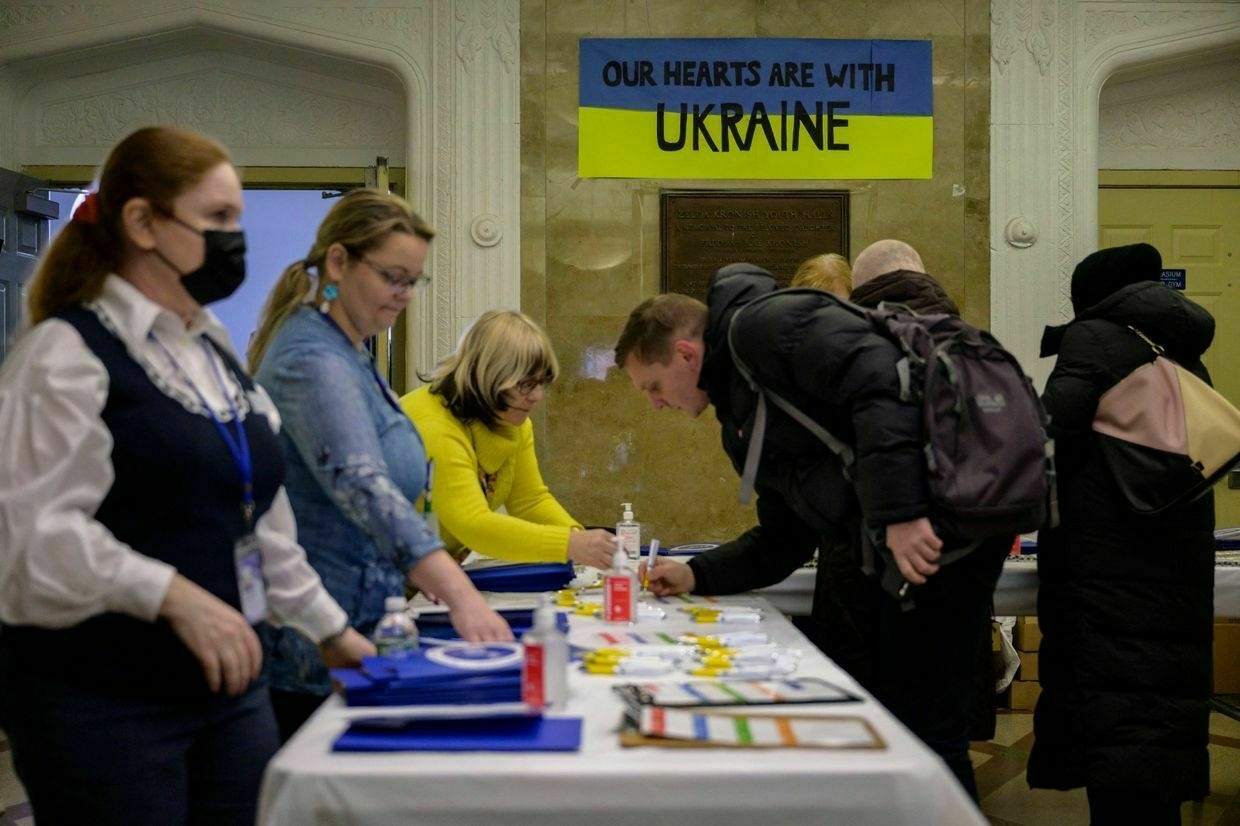-
Belarus Weekly: Lukashenko signs security treaty, pulling Belarus further into Russia’s orbit
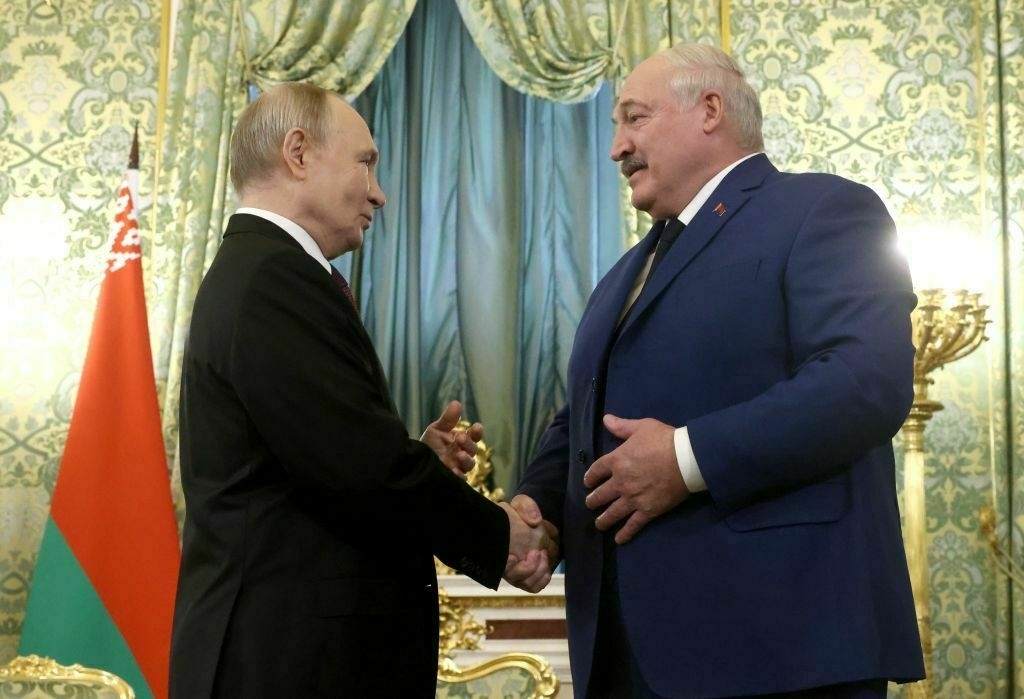
Belarus dictator Alexander Lukashenko visits Moscow, enacting a security treaty and signing a range of agreements that pull Belarus further into Russia’s orbit.
U.S. President Donald Trump slashes RFE/RL funding in another blow to Belarusian media in exile.
Latvia restricts movement at last open border crossing with Belarus amid migration
concerns.Japanese citizen sentenced to seven years in Belarus on trumped up charges of spying.
Poland and the Baltic states seek to withdraw from the anti-personnel mine ban treaty.
Subscribe to the NewsletterBelarus Weekly<span data-sanitized-id="belarus-weekly-info" data-sanitized-class="belarusWeekly__info"></span> <button data-sanitized-id="belarus-weekly-subscribe-btn" data-sanitized-class="belarusWeekly__form_button"> <span data-sanitized-class="belarusWeekly__form_label">Join us</span> <path d="M4.45953 12.8114H7.90953C8.00052 12.8127 8.09085 12.7958 8.17517 12.7616C8.25949 12.7274 8.3361 12.6766 8.40044 12.6123C8.46478 12.548 8.51556 12.4714 8.54975 12.387C8.58395 12.3027 8.60088 12.2124 8.59953 12.1214C8.58173 11.9269 8.48974 11.7467 8.34265 11.6183C8.19555 11.4898 8.00465 11.4229 7.80953 11.4314H4.45953C4.27653 11.4314 4.10103 11.5041 3.97163 11.6335C3.84223 11.7629 3.76953 11.9384 3.76953 12.1214C3.76953 12.3044 3.84223 12.4799 3.97163 12.6093C4.10103 12.7387 4.27653 12.8114 4.45953 12.8114Z" fill="white"></path> <path d="M8.6 15.0114C8.60135 14.9204 8.58442 14.83 8.55022 14.7457C8.51603 14.6614 8.46525 14.5848 8.40091 14.5205C8.33656 14.4561 8.25996 14.4053 8.17564 14.3711C8.09131 14.3369 8.00098 14.32 7.91 14.3214H2.69C2.507 14.3214 2.3315 14.3941 2.2021 14.5235C2.0727 14.6529 2 14.8284 2 15.0114C2 15.1944 2.0727 15.3699 2.2021 15.4993C2.3315 15.6287 2.507 15.7014 2.69 15.7014H7.81C8.00511 15.7099 8.19602 15.643 8.34311 15.5145C8.49021 15.386 8.5822 15.2058 8.6 15.0114Z" fill="white"></path> <path d="M24.4202 6.01122H7.55022C7.43403 5.99626 7.31641 5.99626 7.20022 6.01122L7.08022 6.06122C6.85578 6.16602 6.66595 6.33276 6.53308 6.54181C6.4002 6.75086 6.32982 6.99352 6.33022 7.24122C6.32744 7.43266 6.36832 7.62222 6.44976 7.79549C6.5312 7.96876 6.65105 8.1212 6.80022 8.24122L12.5802 13.4512L6.89022 18.7112C6.71923 18.8375 6.57973 19.0016 6.4826 19.1907C6.38546 19.3797 6.33331 19.5887 6.33022 19.8012C6.32652 20.0535 6.3952 20.3015 6.52812 20.516C6.66105 20.7304 6.85264 20.9023 7.08022 21.0112C7.14691 21.0484 7.21729 21.0786 7.29022 21.1012C7.46476 21.1609 7.64625 21.1979 7.83022 21.2112H24.5102C24.8263 21.2048 25.1378 21.1355 25.4268 21.0074C25.7158 20.8792 25.9763 20.6948 26.1932 20.4648C26.4101 20.2349 26.579 19.9641 26.6901 19.6681C26.8012 19.3722 26.8522 19.0571 26.8402 18.7412V8.47122C26.8278 7.82952 26.5701 7.21694 26.12 6.7594C25.6699 6.30185 25.0616 6.03412 24.4202 6.01122ZM8.57022 8.08122L7.92022 7.49122H24.4202L16.4902 14.6812C16.407 14.7305 16.312 14.7565 16.2152 14.7565C16.1185 14.7565 16.0235 14.7305 15.9402 14.6812L8.57022 8.08122ZM7.73022 19.7912L8.48022 19.1112L13.4802 14.5812L14.8802 15.8612C15.1804 16.157 15.5793 16.3315 16.0002 16.3512C16.4212 16.3315 16.82 16.157 17.1202 15.8612L18.5202 14.5812L24.2002 19.8012H7.73022V19.7912ZM25.3502 18.7112L19.6602 13.5912L25.3502 8.37122V18.7112Z" fill="white"></path> </button> </div>Lukashenko, Putin meet in Moscow, enact Union State security treatyBelarusian dictator Alexander Lukashenko made a three-day state visit to Moscow that ended on March 15 – his first official visit abroad following his so-called "re-election” in January. The visit also occurred before the Belarusian autocrat was officially inaugurated as the country’s head of state.
Following talks, Lukashenko and Russian President Vladimir Putin enacted the Union State treaty, which the sides have dubbed as “security guarantees.” Signed on Dec. 6, 2024, and ratified in late February, the treaty expands Russia’s military presence in Belarus in exchange for the Kremlin opening its “nuclear umbrella” over Belarus.
The treaty is widely seen as ceding Belarus’s sovereignty over its defense and foreign policy. Since using Moscow’s support to crush mass protests triggered by election fraud in 2020, Lukashenko has been largely cut off from the West, and has increasingly relied on Moscow to keep him in power and to support Belarus’s sanctioned economy.
Now, deeply dependent on Russia, Belarus is providing logistical and military support for Moscow’s war against Ukraine. At least 287 Belarusian enterprises supply the Russian war machine, according to Belarusian democratic leader in exile Sviatlana Tsikhanouskaya.
Addressing the Russian Federation Council, Lukashenko said there had been an erosion of Belarusian sovereignty, adding that Belarus would not formally merge with Russia in the near future.
“If we were to burst through this open door, we would ruin everything we have done. It is necessary to go calmly, step by step,” Lukashenko said.
Following his speech, Moscow approved an agreement to delay Belarus’s repayment of nearly $800 million in debts. Belarus’s total debts to Russia stand at $8 billion.
RFE/RL journalist and political analyst Yury Drakakhrust described the highly controlled yet officially still independent Belarus as an example of the Kremlin’s desired model for relations with post-Soviet countries — including Ukraine.
The Russian and Belarusian dictators also signed an agreement granting rights to Russian and Belarusian citizens permanently residing in each other’s territories to vote in local elections, further deepening the integration processes between the two states.
Another agreement signed during Lukashenko’s visit was dedicated to the mutual protection of citizens “unjustly persecuted by foreign states or international justice bodies.” The document contains a pledge “to jointly combat the negative trend of the politicization of international legal cooperation in criminal matters.”
The International Criminal Court (ICC) issued arrest warrants for Putin and Russian human rights ombudswoman Maria Lvova-Belova in March 2023 over their involvement in the forced deportation of Ukrainian children from Russia-occupied territories in Ukraine. The threat of an ICC warrant is also hanging over Lukashenko after Lithuania referred a case against him to the court in September 2024. Human rights groups such as Reporters Without Borders and the International Accountability Platform for Belarus have also submitted evidence on the regime’s alleged crimes.
Like Russia, Belarus has abused Interpol’s Red Notice mechanism, using it to hunt down the regime’s political opponents abroad.
Polish right takes hard line on Ukraine ahead of presidential voteWith the Polish presidential elections just two months away, two of the country’s leading right-wing candidates have become increasingly antagonistic toward Ukraine and its leadership. Kyiv can ill afford another hostile head of state among its key partners, as U.S. President Donald Trump’s foreign…The Kyiv IndependentMartin Fornusek
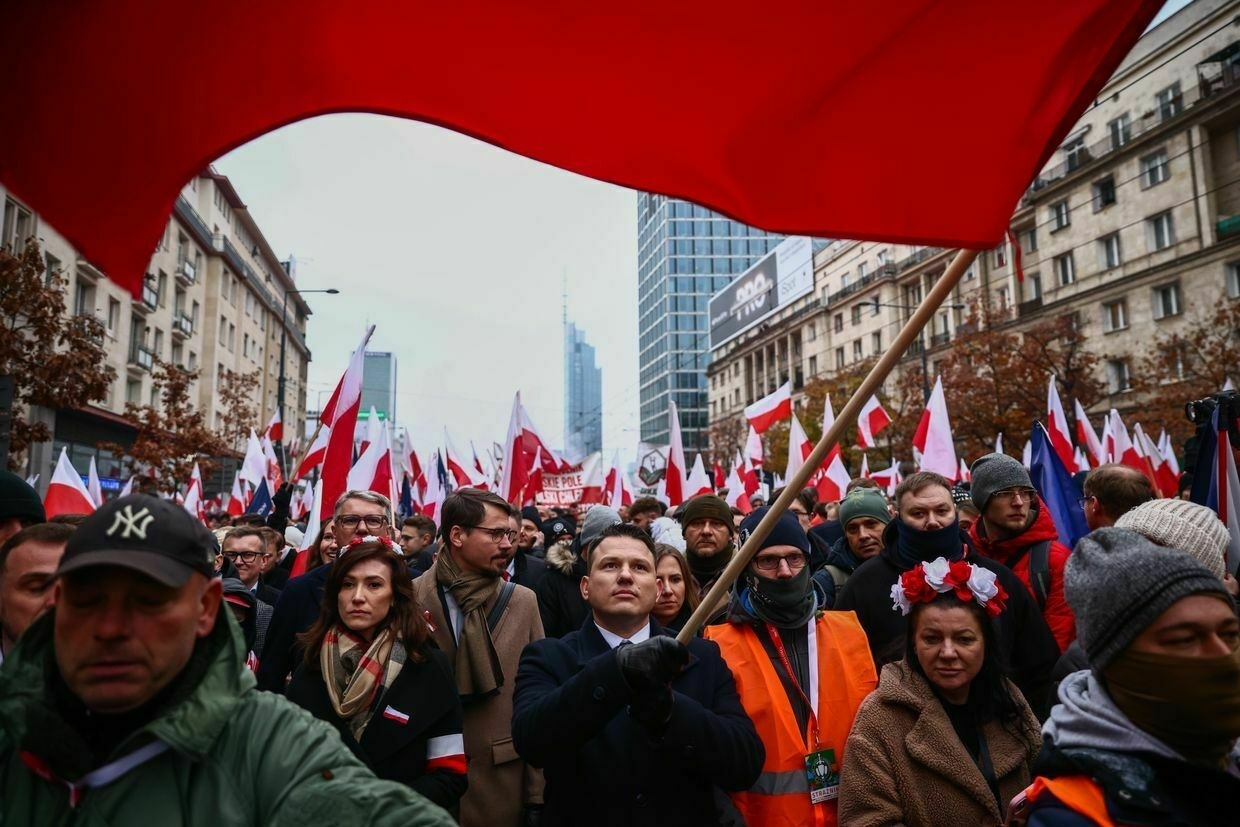
Trump’s defunding of RFE/RL deals another blow to Belarusian media in exileBelarusian dictator Alexander Lukashenko made a three-day state visit to Moscow that ended on March 15 – his first official visit abroad following his so-called "re-election” in January. The visit also occurred before the Belarusian autocrat was officially inaugurated as the country’s head of state.
Following talks, Lukashenko and Russian President Vladimir Putin enacted the Union State treaty, which the sides have dubbed as “security guarantees.” Signed on Dec. 6, 2024, and ratified in late February, the treaty expands Russia’s military presence in Belarus in exchange for the Kremlin opening its “nuclear umbrella” over Belarus.
The treaty is widely seen as ceding Belarus’s sovereignty over its defense and foreign policy. Since using Moscow’s support to crush mass protests triggered by election fraud in 2020, Lukashenko has been largely cut off from the West, and has increasingly relied on Moscow to keep him in power and to support Belarus’s sanctioned economy.
Now, deeply dependent on Russia, Belarus is providing logistical and military support for Moscow’s war against Ukraine. At least 287 Belarusian enterprises supply the Russian war machine, according to Belarusian democratic leader in exile Sviatlana Tsikhanouskaya.
Addressing the Russian Federation Council, Lukashenko said there had been an erosion of Belarusian sovereignty, adding that Belarus would not formally merge with Russia in the near future.
“If we were to burst through this open door, we would ruin everything we have done. It is necessary to go calmly, step by step,” Lukashenko said.
Following his speech, Moscow approved an agreement to delay Belarus’s repayment of nearly $800 million in debts. Belarus’s total debts to Russia stand at $8 billion.
RFE/RL journalist and political analyst Yury Drakakhrust described the highly controlled yet officially still independent Belarus as an example of the Kremlin’s desired model for relations with post-Soviet countries — including Ukraine.
The Russian and Belarusian dictators also signed an agreement granting rights to Russian and Belarusian citizens permanently residing in each other’s territories to vote in local elections, further deepening the integration processes between the two states.
Another agreement signed during Lukashenko’s visit was dedicated to the mutual protection of citizens “unjustly persecuted by foreign states or international justice bodies.” The document contains a pledge “to jointly combat the negative trend of the politicization of international legal cooperation in criminal matters.”
The International Criminal Court (ICC) issued arrest warrants for Putin and Russian human rights ombudswoman Maria Lvova-Belova in March 2023 over their involvement in the forced deportation of Ukrainian children from Russia-occupied territories in Ukraine. The threat of an ICC warrant is also hanging over Lukashenko after Lithuania referred a case against him to the court in September 2024. Human rights groups such as Reporters Without Borders and the International Accountability Platform for Belarus have also submitted evidence on the regime’s alleged crimes.
Like Russia, Belarus has abused Interpol’s Red Notice mechanism, using it to hunt down the regime’s political opponents abroad.
Trump’s defunding of RFE/RL deals another blow to Belarusian media in exileSeventy years of U.S.-backed broadcasts promoting democracy worldwide may come to an end after U.S. President Donald Trump on March 14 signed an executive order eliminating seven federal agencies, including the U.S. Agency for Global Media (USAGM), which oversees RFE/RL and Voice of America (VoA).
For Belarus media in exile, the order serves another major blow to the independent press, which have been outlawed in Belarus and forced into exile. An earlier USAID funding cut in January affected around two-thirds of Belarusian outlets, with about 20% pushed to the brink of closure, according to the independent Belarusian Association of Journalists (BAJ).
Trump’s executive order put 1,300 VoA employees on administrative leave and terminated the U.S. Congress-authorized grant for RFE/RL. In response, on March 19, RFE/RL filed a lawsuit against USAGM and its officials to block the funding halt. So far, the Belarusian service of RFE/RL continues to operate, although some freelancers have been let go.
RFE/RL President and CEO Stephen Capus said that canceling the organization’s funding “would be a massive gift to America’s enemies.” Propagandists in Russia, meanwhile, celebrated the decision.
RFE/RL launched its coverage in Belarusian in 1954. Unlike in Ukraine or Russia, the Belarusian service of RFE/RL was never permitted to open an official bureau in Belarus and was never granted FM broadcasting rights. In December 2021, the regime of Belarusian dictator Alexander Lukashenko officially deemed the Belarusian service to be an “extremist organization.”
The independent journalism fostered at the Belarusian service of RFE/RL kickstarted the development of the media industry in Belarus — the service’s first correspondent on the territory of the then Soviet Belarus, Ales Lipai, later founded the first independent Belarusian news agency, BelaPAN.
Beyond being among the few Belarusian-language media, Radio Liberty is the last outlet preserving pre-Soviet spelling and grammar norms, which were later altered to make written Belarusian more similar to Russian. The shutdown of Belarusian Radio Liberty would eliminate this norm from public use.
Belarusian opposition leader Sviatlana Tsikhanouskaya said losing RFE/RL and VoA would be a “grave mistake,” calling them “symbols of the free world.”
Former RFE/RL journalists Ihar Karnei and Ihar Losik remain behind bars in Belarus, serving sentences of more than three and 15 years, respectively. Another Belarusian correspondent, Andrei Kuznechyk, was recently freed in a U.S.-brokered prisoner release. Belarusian propaganda aired interviews with the prisoners in an attempt to undermine Radio Liberty’s coverage of the 2020 anti-government protests in Belarus.
Since strangling popular protests against the rigged 2020 presidential elections, the Lukashenko regime has raided and shut down independent outlets, blocked websites, and jailed 41 journalists and media workers. Thirty-three media workers have been labeled extremists, and 12 have been declared to be “terrorists.” Donating to or advertising with one of the 38 banned media is punishable by up to five years in prison.
About 400 media workers have fled Belarus, relying on foreign grants to keep their newsrooms operating in exile.
EU foreign policy chief Kaja Kallas said EU foreign ministers discussed the functioning of RFE/RL at a meeting in Brussels on March 17. The bloc cannot automatically fund Radio Free Europe, she said, adding that the EU will look into potential options.
Ten European countries backed the proposal to fund RFE/RL, Czech Minister for European Affairs Martin Dvorak announced on March 18. Czech Foreign Minister Jan Lipavsky did not rule out that the European Union might buy Radio Free Europe from the United States.
EU approves over $2 billion in economic support for MoldovaThe Reform and Growth Facility, which includes 1.5 billion euros ($1.6 billion) in low-interest loans and 385 million euros ($420 million) in grants, will cover the period of 2025-2027 and is part of the EU’s long-term Moldova Growth Plan.The Kyiv IndependentMartin Fornusek
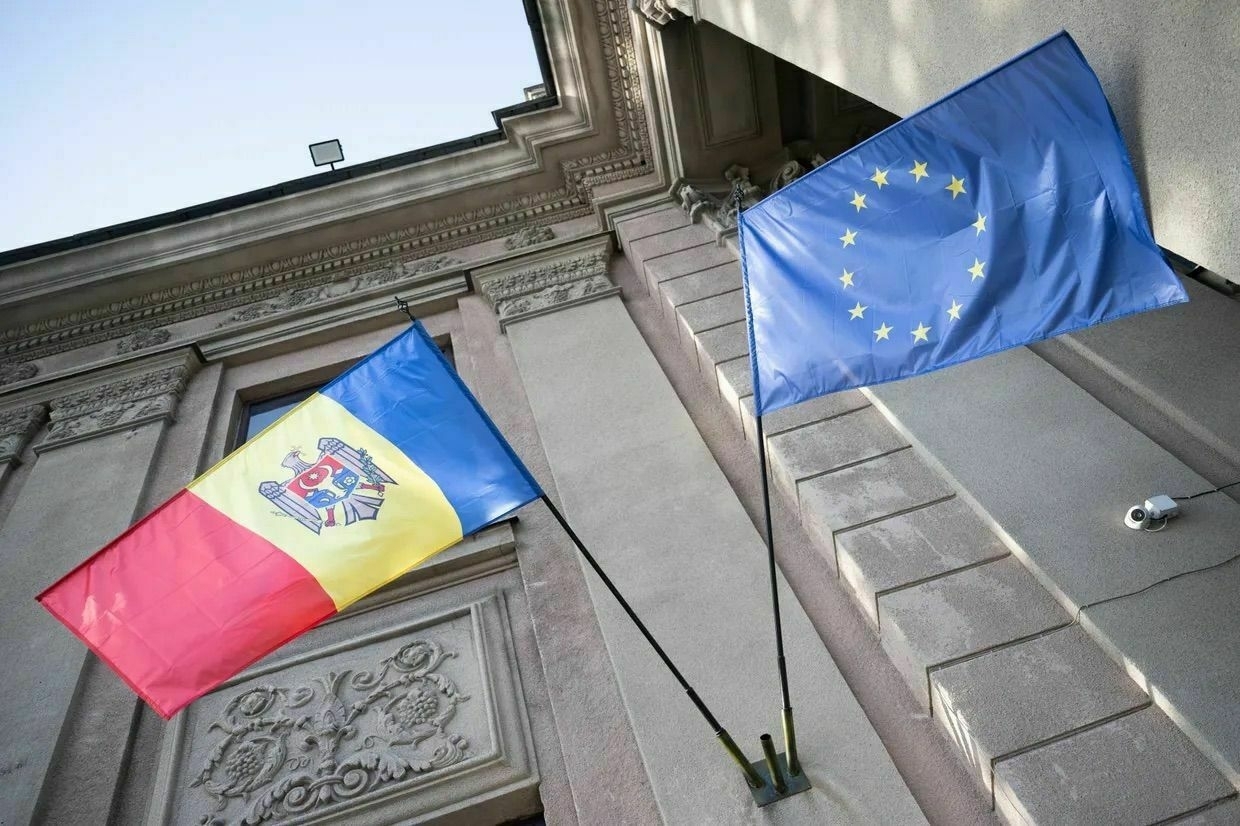
Latvia restricts movement on sole remaining border crossing with BelarusThe Latvian government, seeking to prevent the inflow of illegal migrants into the country from Belarus, on March 19 limited traffic across the country's only remaining border crossing with Belarus for motorized vehicles.
Similar measures extend to the two checkpoints on the Latvian-Russian border.
Belarus orchestrated an artificial migration crisis in 2021 by channeling flows of nearly 8,000 irregular migrants from the Middle East, Africa, and Asia to Belarus's borders with the EU. The crisis was reignited with the Kremlin's backing in 2022, prompting Poland and the Baltic states to declare it a "hybrid attack" aimed at destabilizing the region.
Latvia's decision prohibits pedestrians and bicycles from crossing the border at Patarnieki-Hryharouschyna, the last operating border post between Latvia and Belarus, for six months. According to Border Guard Chief Guntis Puyats, the possibility of a full shutdown is not ruled out if the irregular migration flow again becomes critical.
The Latvian State Border Guard requested that the government approve the partial closure on March 17, following a nine-hour halt of operations at the checkpoint due to the threat of irregular migration.
According to Puyats, border officers decided to block all traffic movement on the border after they noticed about 30 migrants, predominantly men aged between 20 and 35, with no visas or residence permits, who were seeking to cross the border.
"We understand that this is an instrumentalization of migration," the border guard chief said on air on Latvian TV3.
The Belarusian State Border Committee said that the temporary traffic block had been caused by "a group of Africans traveling to the European Union with valid documents," without specifying whether the foreigners actually had visas to enter the EU.
Latvia's State Border Guard has stopped 254 illegal border crossing attempts from Belarusian territory since the beginning of 2025. In 2024, according to border guards data aggregated by the independent news outlet Pozirk, there were around 30,000 border crossing attempts — 14% less than in 2023 — with 85% of the attempts occurring on the Polish-Belarusian border. Since the onset of the artificial migration crisis, Lithuania, Latvia, and Poland have built physical barriers along their land borders with Belarus and shut down several border crossings.
The Latvian government is actively discouraging its citizens from traveling to Belarus. Two proposals were submitted to parliament in February to prohibit travel companies from organizing trips to Russia and Belarus and to ban passenger transportation with each of the two countries.
Japanese citizen sentenced to 7 years on politically motivated charges in BelarusAfter subjecting Japanese citizen Masatoshi Nakanishi to trial on alleged “undercover activities,” a Belarusian court sentenced him to seven years of imprisonment, the maximum term for the offense, the Belarusian Prosecutor General’s Press Office reported on March 17.
A key Russian ally, Belarus has intensified the persecution of foreign nationals since the beginning of the full-scale Russian invasion of Ukraine, according to the Viasna Human Rights Center. At least 19 foreigners have been tried and sentenced in Belarus for “undercover activities” — a vaguely defined act of “cooperation” with a wide range of foreign or international entities.
The court convicted Nakanishi for allegedly taking over 9,000 photos of civilian and military infrastructure, including military and railway facilities. Belarusian authorities also claimed Nakanishi traveled to the Ukrainian border. The court imposed the maximum possible prison sentence and a fine of around $6,500.
According to a documentary aired on Belarusian state-run TV, Nakanishi lives in Homiel, a regional center near Belarus’s border with Ukraine, and was officially employed as a Japanese language instructor at the local university. The first news of his arrest was published in September 2024, although he was actually arrested in July 2024.
Jailed foreign nationals are often used as bargaining chips by the regime of Belarusian dictator Alexander Lukashenko. In August 2024, Belarus released a German citizen, Rico Krieger, who had been subjected to a swift trial and sentenced to capital punishment on charges including “undercover activities.” Lukashenko “pardoned” Krieger and released him as part of a historic East-West prisoner swap in August 2024, assisting Moscow in returning the Russian killer Vadim Krasikov from prison in Germany.
In 2022, Swiss-Belarusian dual national Natallia Hersche was released after a year-and-a-half in a Belarusian prison following “intense efforts” by Switzerland’s Federal Department of Foreign Affairs. Swiss newspaper Der Bund linked the appointment of a Swiss ambassador to Belarus in February 2022 to the freeing of Hersche.
Belarus still holds around 1,200 political prisoners, at least 36 of them foreigners, under a range of politically motivated charges.
Estonian citizen Alan Royo was prosecuted for slandering Lukashenko and founding an extremist formation, while Latvian citizen Jurijs Ganins was charged on March 13 with discrediting Belarus, calling for sanctions, and insulting Lukashenko.
Poland, Baltics to withdraw from anti-personnel mine treatyThe defense ministers of Estonia, Latvia, Lithuania, and Poland, the EU member states bordering Belarus and Russia, have unanimously recommended that their countries withdraw from the Ottawa Convention banning the use of anti-personnel mines.
The ministers reasoned that Russia’s aggression against Ukraine and its ongoing threats to the Euro-Atlantic community had fundamentally changed the security situation in the region since the ratification of the Ottawa Convention.
“With this decision, we are sending a clear message: our countries are prepared and can use every necessary measure to defend our territory and freedom,” reads a statement published by Poland’s Ministry of National Defense.
Despite withdrawing from the convention, the countries say they would uphold their commitments to international humanitarian law, including protecting civilians during armed conflict.
The decision still requires approval by the countries’ parliaments.
While all EU member states have ratified the treaty, Russia and the United States have not. Neither was Russia a signatory of the convention banning cluster munitions, a weapon widely used in the Russia-Ukraine war. Lithuania voted to withdraw from the convention banning the use of cluster munitions earlier in March.
The move to withdraw from the anti-personnel mine ban treaty signals a shift in the front-line NATO states’ defense policies in the wake of Russia’s aggression against Ukraine. Both the Kremlin and Belarusian dictator Alexander Lukashenko and his military officials have in recent years repeatedly used hostile rhetoric in relation to NATO member-states.
Poland, Baltics to withdraw from anti-personnel mine ban treatyThe defense ministers of the four nations argued that the security situation in the region has “fundamentally deteriorated” and that military threats to NATO member states bordering Russia and Belarus have “significantly increased.”The Kyiv IndependentTim Zadorozhnyy
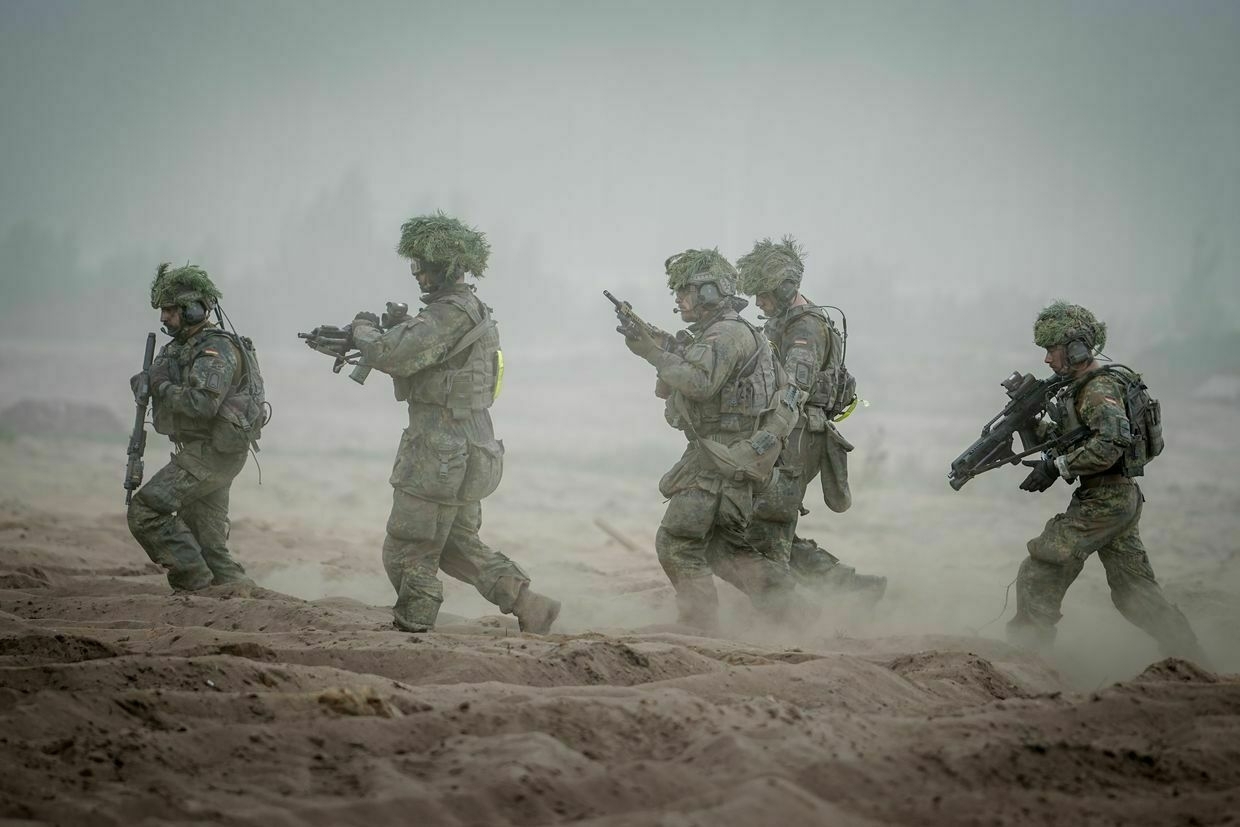
Mass Protests Erupted in Turkey 🇹🇷 after Istanbul Mayor Has Been Detained
EU considers cutting Ukrainian sugar imports after price drop, Reuters reports
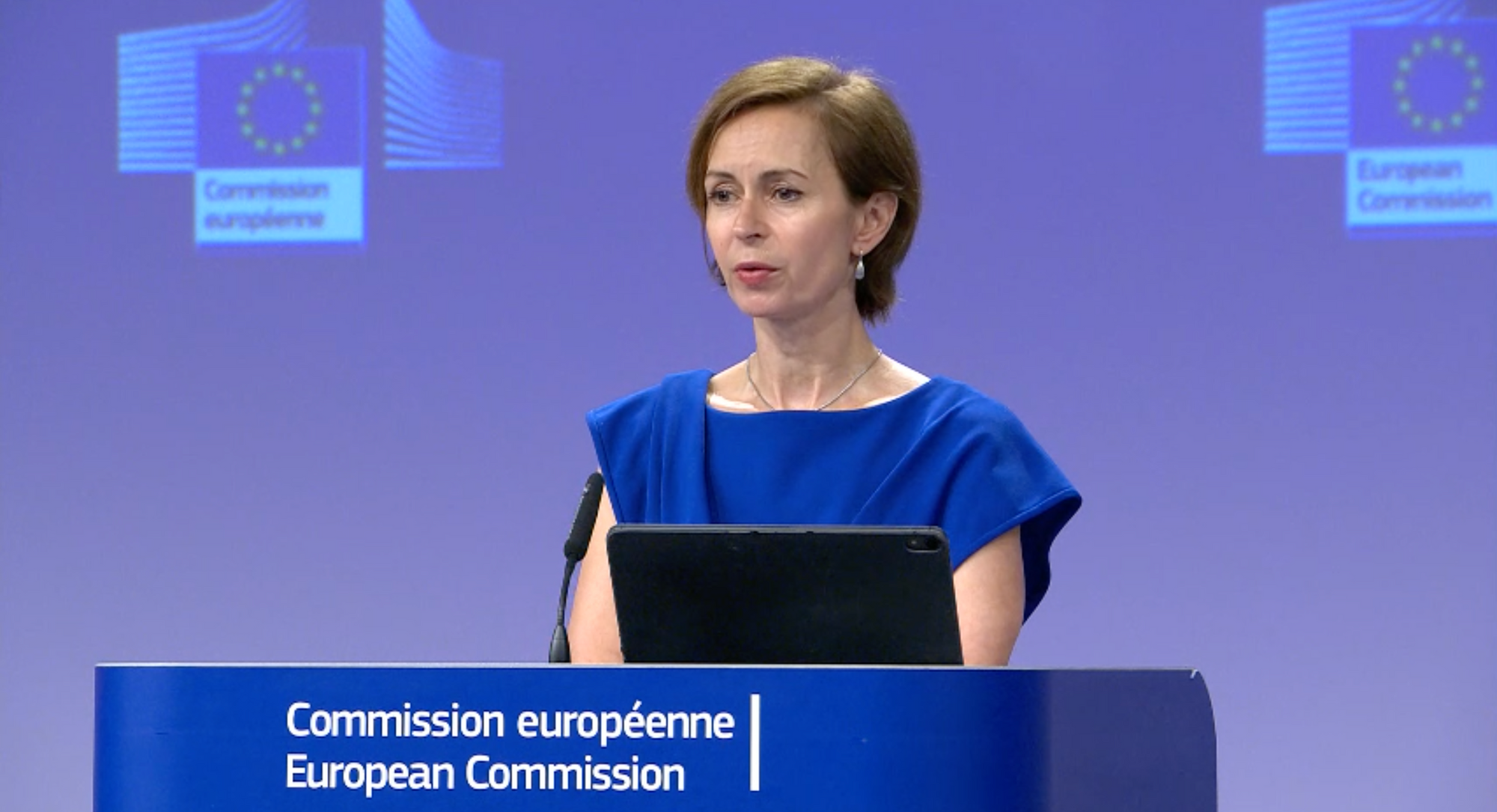
The European Commission is contemplating significant cuts to Ukrainian sugar imports after complaints from EU producers about plummeting sugar prices, Reuters reported on March 20, citing information from three sources.
The EU initially opened its agricultural markets to Ukraine for free to support the country after Russia’s invasion began, but farmer protests in multiple countries have since forced the bloc to scale back.
According to Ukraine’s agriculture ministry, agricultural products accounted for 59% of Ukraine’s total exports in 2024, providing vital support to the war-torn country’s economy.
Reuters reports that EU Agriculture Commissioner Christophe Hansen told French farm union leaders and industry representatives at the Paris farm show in February that he intends to reduce Ukraine’s sugar imports to levels “well below” current volumes.
Hansen also aims to limit other imports from Ukraine, such as grains, according to two unnamed trade sources cited by Reuters.
European sugar prices fell by more than 30% last year, according to the latest EU data, though white sugar futures have rebounded in the past two months due to weakening production outlooks in major producing countries, including India.
After the EU abolished duties on Ukrainian agricultural products in 2022, Ukrainian sugar imports reached 400,000 tons in the 2022/23 season and over 500,000 tons in 2023/24 — far exceeding the pre-war quota of 20,000 tons.
Following protests from European farmers, the EU reinstated a Ukrainian sugar import quota of 262,650 tons in July 2023.
According to Ukraine’s sugar union Ukrtsukor, cited by Reuters, the EU halted sugar imports from Ukraine after the first part of the quota was exhausted, forcing Ukraine to redirect sugar shipments to other countries, with Turkey becoming the main destination.
The second part of the quota, allowing 109,440 tons of Ukrainian sugar, opened in January, but Ukraine has exported little so far.
Agricultural trade between Ukraine and the EU reached $17 billion in 2024, with the EU remaining Ukraine’s largest trading partner.
Ukraine Business Roundup — McDonald’s and DOGE in UkraineThe following is the March 18, 2025 edition of our Ukraine Business Roundup weekly newsletter. To get the biggest news in business and tech from Ukraine directly in your inbox, subscribe here. I’ve always wanted an excuse to talk to this newsletter audience about McDonald’s in Ukraine andThe Kyiv IndependentLiliane Bivings
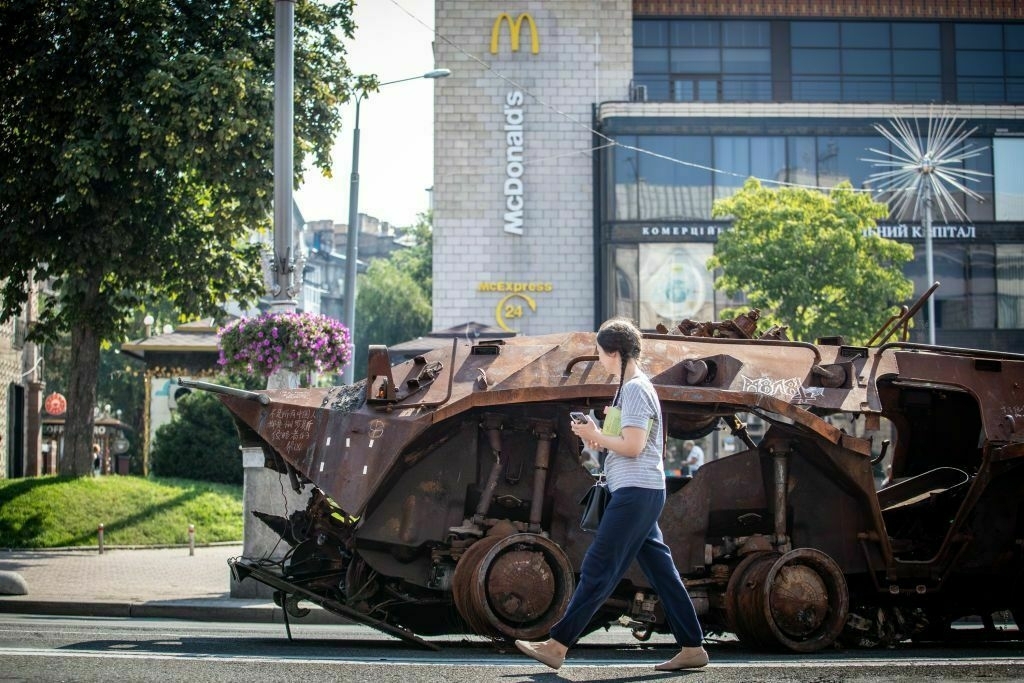
Ukrainian author Oksana Zabuzhko on why Ukrainians ‘don’t have to respect Pushkin’
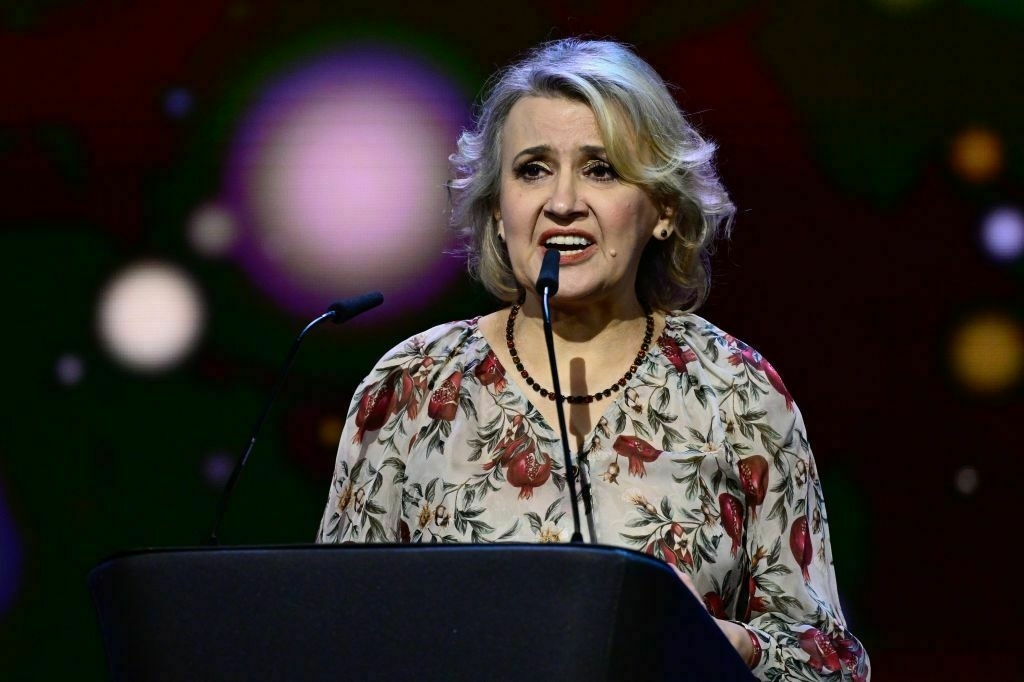
Over the past three years of full-scale war, Ukraine’s cultural figures have shifted from focusing solely on their craft to becoming diplomats, advocating for their culture abroad as the Russian army continues its relentless attempt to destroy it.
At the same time, within Ukraine itself, a resurgence of national identity that began in 2014 has been accelerated by the full-scale war. Ukrainians en masse are reclaiming and reconnecting with their heritage, immersing themselves in a culture that Russia has spent centuries trying to suppress.
Oksana Zabuzhko, one of Ukraine’s most prominent authors, has been at the forefront of the country’s cultural revival since its independence in 1991. Her novel “Fieldwork in Ukrainian Sex” is regarded as one of the most significant works of independent Ukraine and her books have been translated into multiple foreign languages.
In an interview with the Kyiv Independent, Zabuzhko discussed why Ukrainians should not feel obligated to respect Russian literature, the rightful place of classic Ukrainian female authors in the global literary canon, the challenge of self-censorship during wartime, and why it’s wrong to share a stage with Russian authors while the war continues.
This interview has been edited for length and clarity.
The Kyiv Independent: During the past three years of the full-scale war we’ve seen an increasing amount of global attention directed at Ukraine and Ukrainian culture. But what does the West still not understand about Ukraine?
Oksana Zabuzhko: Well, I wouldn’t place all the blame on the West. A significant share of it does lie there, but I don’t see it as my role to act like some kind of global teacher. Honestly, I hate that role, even though I often find myself having to play it.There are still many things about Ukraine that Ukrainians themselves have yet to fully understand. We’re still in the process of self-discovery — learning about our own history, and identity. Right now is a particularly interesting time, with this major tectonic shift happening. For the first time since 1945, Europe is being forced to confront its security system on its own. In a way, (U.S. President Donald) Trump and his administration served as a wake-up call for Europe, and suddenly, we’re seeing all these fascinating discussions — both Ukrainian and international — taking place in Kyiv.
For years, Ukraine was seen as an axis between East and West — between Poland and Russia — interpreted through frameworks like Samuel Huntington’s “clash of civilizations” or other similar narratives, which, frankly, I consider nonsense. But now, we’re witnessing a shift: Ukraine is becoming an axis that runs North-South. I call this project “Mazepa’s Europe,” after (Ukrainian) Hetman (Ivan) Mazepa, who once envisioned it. His vision ultimately failed in the early 18th century, but it was rooted in an older, historically significant route — the path from the Varangians to the Greeks, which has long played a vital role in both Ukrainian and European history.
This idea of an “Intermarium” — linking the Baltic and Black Seas — is not a hierarchical model where great powers dictate terms to smaller nations. Instead, it’s a democratic Intermarium, where states and nations collaborate as equals, forming temporary alliances and working together on their own terms. It stands in stark contrast to the old model of power, where decisions about smaller nations’ fates were made over their heads by the so-called great powers — like in Yalta (in 1945).
It’s a different approach — very European, I would say. It’s deeply anti-superpower, anti-imperial, and at the same time, unmistakably Ukrainian. After all, we have always existed along this historic route from the Varangians to the Greeks.
Mazepa’s project is something generations of Ukrainians were never taught in school. Our heavily Russified, colonial education system conditioned people to believe that Mazepa was a villain simply because he defied Peter I. (Russian poet Alexander) Pushkin wrote that he was a traitor, and so we were taught to respect Pushkin. But we don’t have to.
This is part of the broader decolonization process — learning about ourselves from a long-term perspective, whether across three centuries or even a millennium. There’s still so much we have yet to share with the world, and many new textbooks are still waiting to be written. It’s an exciting subject.
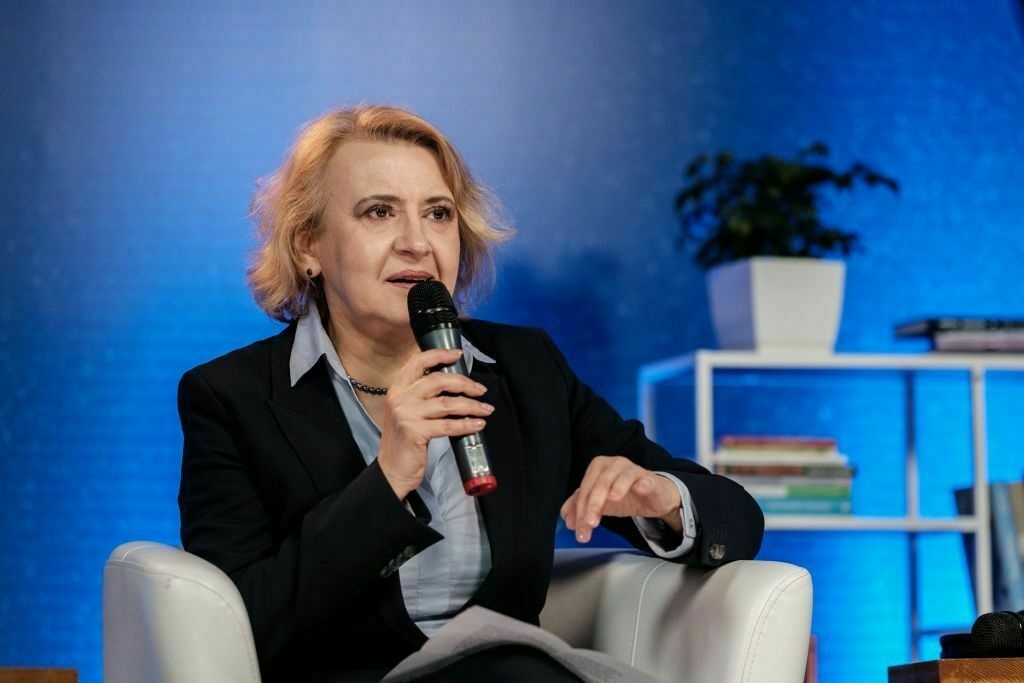
Oksana Zabuzhko, author and poet, attends the 30th Lviv BookForum on Oct. 7, 2023, in Lviv, Ukraine. (Les Kasyanov/Global Images Ukraine via Getty Images) The Kyiv Independent: Building on this idea, I have to say that I recently read Olha Kobylianska’s short story “Valse mélancolique” (1898) for the first time, and as a foreigner, I was struck by the strong tradition of feminist thought in Ukrainian literature. The line, “We shall live not as mothers or wives, but as women,” has stayed with me ever since. It seems to me that if the world were more familiar with Ukraine’s classic female writers, they would rightfully earn their place in the global literary canon.
Oksana Zabuzhko: Thank you so much — I can’t tell you how much I appreciate what you just said. It’s something I’ve been emphasizing for years: we still need to “sell” this idea to the West, to convince Western audiences — however loosely we define them — that without Olha Kobylianska, and even more so Lesia Ukrainka, the landscape of European literature is incomplete.
(Ukrainian writer) Lesia Ukrainka was, in many ways, half a century ahead of her time compared to her Western European female contemporaries. That’s an undeniable truth. What makes Ukrainian culture particularly unique in gender terms? Perhaps it has to do with Ukraine’s long history as a frontier. Here’s a simple way to put it: we never burned our witches. Of course, there were practices like trial by water — drowning women to determine if their souls were pure — but the ancient pagan tradition of strong, wise women endured in Ukraine far longer than in most of Europe. Even in the 20th century, every village still had a healer or “witch” who cured people.
But it’s not just about the survival of pagan traditions. Ukrainian folk culture has always had a powerful female voice. Early 19th-century ethnographers were surprised to discover that two-thirds of Ukrainian folk songs were told from a female perspective — something highly unusual at the time. These songs weren’t just lyrics; they chronicled the entire arc of a woman’s life.
More importantly, Ukrainian women historically had legal rights that were rare in Europe. They could own property and pass it down through the female line — a practice known as “materyzna.” This inheritance, whether money, land, or real estate, was untouchable by husbands and meant to be passed from mother to daughter. Compare that to the impact of the Reformation on women’s rights in Western Europe, and it’s easy to see why Ukraine has such strong female and even feminist voices.
Lesia Ukrainka and other Ukrainian feminists of the time didn’t just advocate for women’s rights; they saw the legal and social restrictions placed on women in European culture as entirely artificial and absurd. Just read her letters — they should be translated into every European language. She was, in a way, the blogger of her time, writing five or six letters a day while traveling. Because of her tuberculosis, she spent much of her life in sanatoriums across Europe. Her letters form an intellectual diary of the Belle Époque, particularly the decade before World War I. And unlike many of her contemporaries, she had a chilling premonition that this beautiful world was on the brink of collapse.
Her perspective is deeply European, unmistakably Ukrainian, and distinctly female — something that is still missing from the broader European literary canon. And it’s absolutely fascinating.
The Kyiv Independent: Would you say that there are any major taboos that exist in Ukrainian literature today?
Oksana Zabuzhko: That’s a difficult question — a really difficult one. I wouldn’t say we’re fully ready to discuss how exactly the war has affected our writing.
In terms of genre, yes, there’s already some discussion. Poetry, for instance, always survives — it’s the art of quick reaction. Essays, too. This is a strong time for poetry and essays. But when it comes to longer forms, like the novel, it’s much more complicated. And speaking of taboos, there’s something I think it’s time to acknowledge.
One of the biggest challenges for a writer in a country at war is that you lose many privileges — but perhaps the most profound loss is the ability to freely criticize your own country. It’s a form of self-censorship, and it’s a real problem for free thought, for imagination, for writing itself. When your country is under attack — when someone is trying to erase it from existence — you start to think in terms of security above all else. Criticizing your country suddenly feels like siding with the enemy, with those who want to destroy it.
And then you realize that being able to openly critique your own country is a privilege. A privilege that disappears in wartime. Because now, you feel mobilized. You feel a duty to strengthen your country, to contribute to its resilience. Anything that exposes its weaknesses can be twisted, weaponized by those who seek to annihilate it.
That, I would say, is what makes me most uncomfortable in my own writing right now — this imposed self-censorship. But that’s war. That’s war.
The Kyiv Independent: Right now in the West, we have a troubling situation where people are eager to humanize Russia, including Russian soldiers fighting in Ukraine. They seek a kind of normalization. Perhaps you heard of the documentary, “Russians at War,” in which soldiers are portrayed as simple, helpless men. I know Ukrainian authors don’t particularly want to be diplomats; they want to write. But how do we confront this moving forward?
Oksana Zabuzhko: There are, of course, different shades of propaganda, and “Russians at War” — a documentary that many of my Western friends didn’t even recognize as propaganda — was a shocking example of their naivety. A simple question: Do you really think a filmmaker with a camera would be allowed to move freely among Russian soldiers without permission from someone higher up?
When I asked this, the response was always the same: “Oh, really? I didn’t think about that.” This lack of awareness is alarming. The war is at their doorstep too, yet they fail to ask the most basic questions. When they see Russian soldiers being filmed by an allegedly independent filmmaker, the first thing they should ask is: How did this filmmaker get access? Of course, it was approved and paid for from the top. This is all part of Russia’s soft power and propaganda — this push for normalization is a key part of their cultural strategy.
So what can Ukrainians do? Just yesterday, I was discussing this with my agent, who is arranging interviews for me at the Leipzig Book Fair. A journalist asked if I would consider a public dialogue with a Russian writer — someone respected, someone who has written a book against the war, not just a statement or an open letter. And this, too, exposes an important distinction: a writer’s stance on war is not just what they say in interviews. It’s what they put in their books. If a writer has spent years romanticizing the Russian Empire, glorifying (Soviet dictator Joseph) Stalin, or celebrating its imperial past, how can they now claim to be against the war? It’s as absurd as imagining a so-called “anti-fascist” German writer in the 1930s praising (Holocaust architect Heinrich) Himmler’s leadership while condemning (Nazi leader Adolf) Hitler in interviews.
The reality is, I might have a drink with one of these so-called “anti-war” Russian writers in a bar — some of them I’ve known for years — but I won’t share a stage with them in public discussion. And here’s why: in three years of this full-scale war — the largest in Europe since World War II — there has been no collective Russian action against it. Yes, many Russians fled abroad. Yes, some join Ukrainian protests in Berlin or other cities. But have they organized their own protests against Russia’s war? Have they released any collective statement against it? No. Not one.
But when you put them next to us, when you invite them to share the stage with Ukrainians, you legitimize them. You try to place them in the same category of suffering, as if their situation is comparable to ours. And I’m sorry, but it’s not. Not until they take a real stand. So yes, I might have a private conversation with them, but a public discussion? No way. Not until after our victory.
Note from the author:
Hey there, it’s Kate Tsurkan, thanks for reading my latest interview. Oksana Zabuzhko is truly a living legend, one of the greatest figures of contemporary Ukrainian culture, and I was so thrilled to not only finally meet one of my literary heroes but share our conversation with you. Now more than ever it is important to support Ukrainian culture, as Russia seeks to dismantle it. If you like reading this sort of thing, please consider becoming a member of the Kyiv Independent.
Historian Marci Shore: Putin’s obsession with denazification is ‘Freudian projection’The return of U.S. President-elect Donald Trump to political life has raised uncomfortable questions about the future, not only within the U.S. but also on the global stage. This is particularly true for countries like Ukraine, which relies on U.S. aid as it’s locked in aThe Kyiv IndependentKate Tsurkan
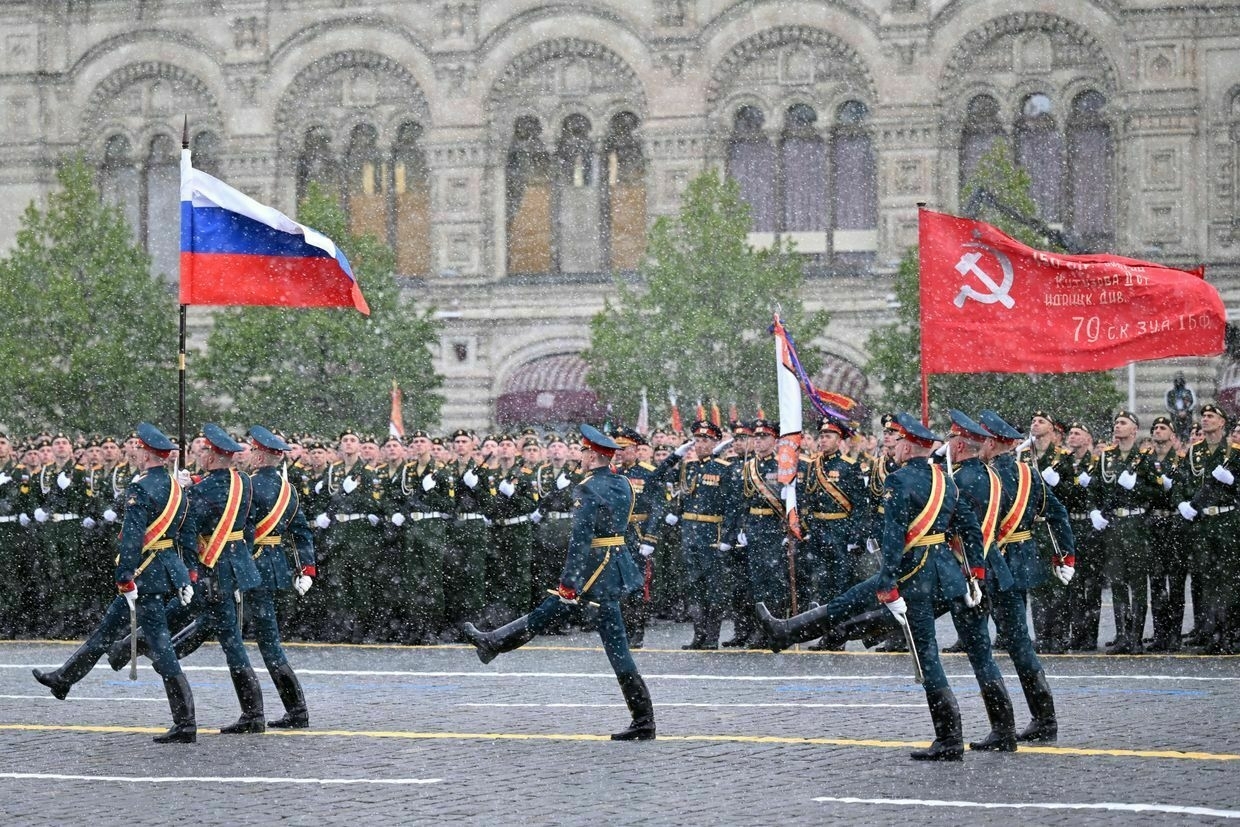
Attack on Russian Strategic Military Airfield. New F-16s in Ukraine. Mass Protests in Turkey
Polish right takes hard line on Ukraine ahead of presidential vote
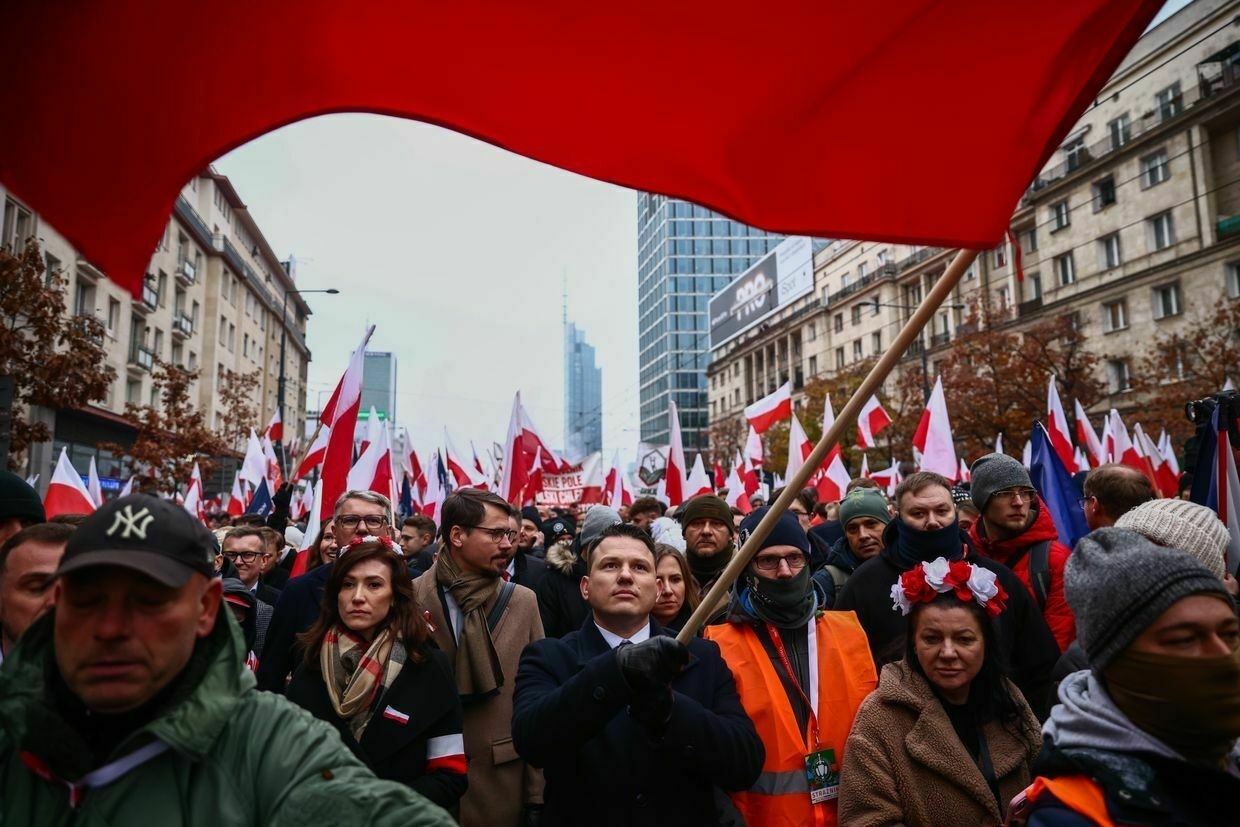
With the Polish presidential elections just two months away, two of the country’s leading right-wing candidates have become increasingly antagonistic toward Ukraine and its leadership.
Kyiv can ill afford another hostile head of state among its key partners, as U.S. President Donald Trump’s foreign policy shift has already thrown the pro-Ukraine coalition into disarray.
Rafal Trzaskowski, 53, a progressive mayor of Warsaw backed by the key ruling party, Prime Minister Donald Tusk’s Civic Platform, remains a clear favorite, polling at around 35%. He faces two opponents from the right, both of whom stand a chance to advance to the runoff scheduled for June 1.
The conservative Law and Justice party (PiS), which led the government from 2015 to 2023 and has an ally in incumbent President Andrzej Duda, has tapped relatively unknown historian Karol Nawrocki as its candidate in the upcoming elections.
Polling at 24%, Nawrocki is only about five percentage points ahead of Slawomir Mentzen, one of the leaders of the far-right Confederation coalition.
Both men have made headlines by public spats with Ukrainian officials and denounced Kyiv as ungrateful for the support Warsaw has provided. Their popularity potentially signals a growing acceptance of anti-Ukraine sentiments in Poland as Russia’s full-scale war entered its fourth year.
The unresolved historical grievances and constant economic disputes between Kyiv and Warsaw have forced even pro-Ukrainian politicians to tread carefully when it comes to dealings with Ukraine.
‘Talk about an invasion is everywhere’ — How Lithuania is preparing for war with RussiaThroughout Russia’s full-scale invasion of Ukraine, repeated and escalating warnings of the potential for a wider war have only raised fears in the Baltic states that they could be next in the crosshairs of the Kremlin. Talk about a potential Russian invasion is “very common at parties, gatherings,…The Kyiv IndependentYuliia Taradiuk
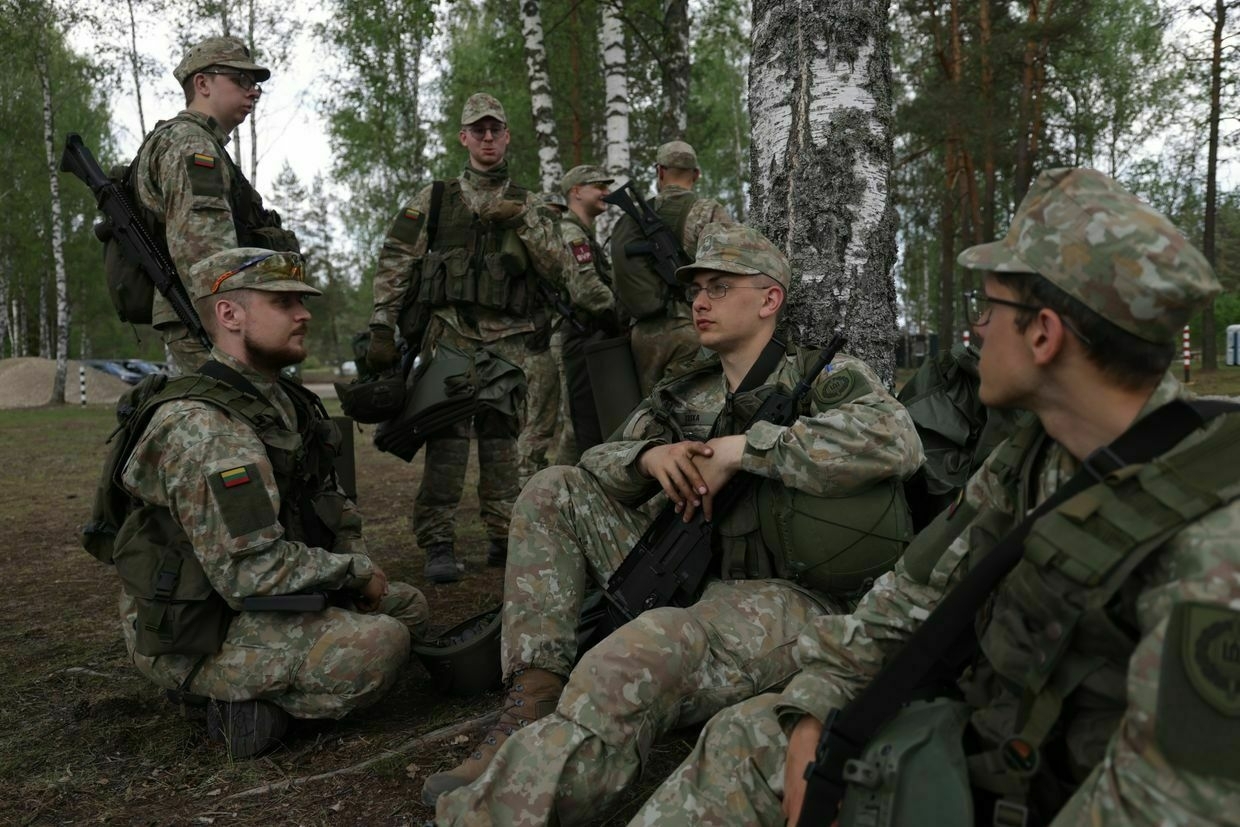
Liberal Trzaskowski has made it clear that “military support for Ukraine is in Poland’s national interest” as “Ukrainians are fighting for our (Poland’s) freedom."
“But we need a sincere conversation about how we see the future of our relations, a sincere conversation about how Ukrainians should take our sensitivity to historical issues seriously, a sincere conversation about how negotiations on Ukraine’s membership in the EU will be very difficult and, unfortunately, will last for many years,” he then added.
Karol NawrockiNawrocki, 42, is a historian who heads the Institute of National Remembrance, a state agency that studies the crimes committed during World War II and Poland’s communist era.
This professional background seems to have shaped his political views, which are marked by clear anti-communism and distaste for Russian expansionism.
The conservative politician, who is on Russia’s wanted list over the demolition of Soviet memorials in Poland, recently suggested cutting diplomatic ties with Moscow, as “maintaining diplomatic ties with a barbaric state is not good for Poland."
But that doesn’t mean the historian-turned-politician is pro-Ukraine.
While pledging that Polish support for Kyiv will continue if he is elected, Nawrocki signaled he wants to see more gratitude for the assistance provided to both Ukrainian front-line soldiers and refugees.
Nawrocki also declared that Ukraine would not be able to enter NATO or the EU without resolving the issue of the Volyn massacres — a sentiment shared by many Polish politicians across the aisle.
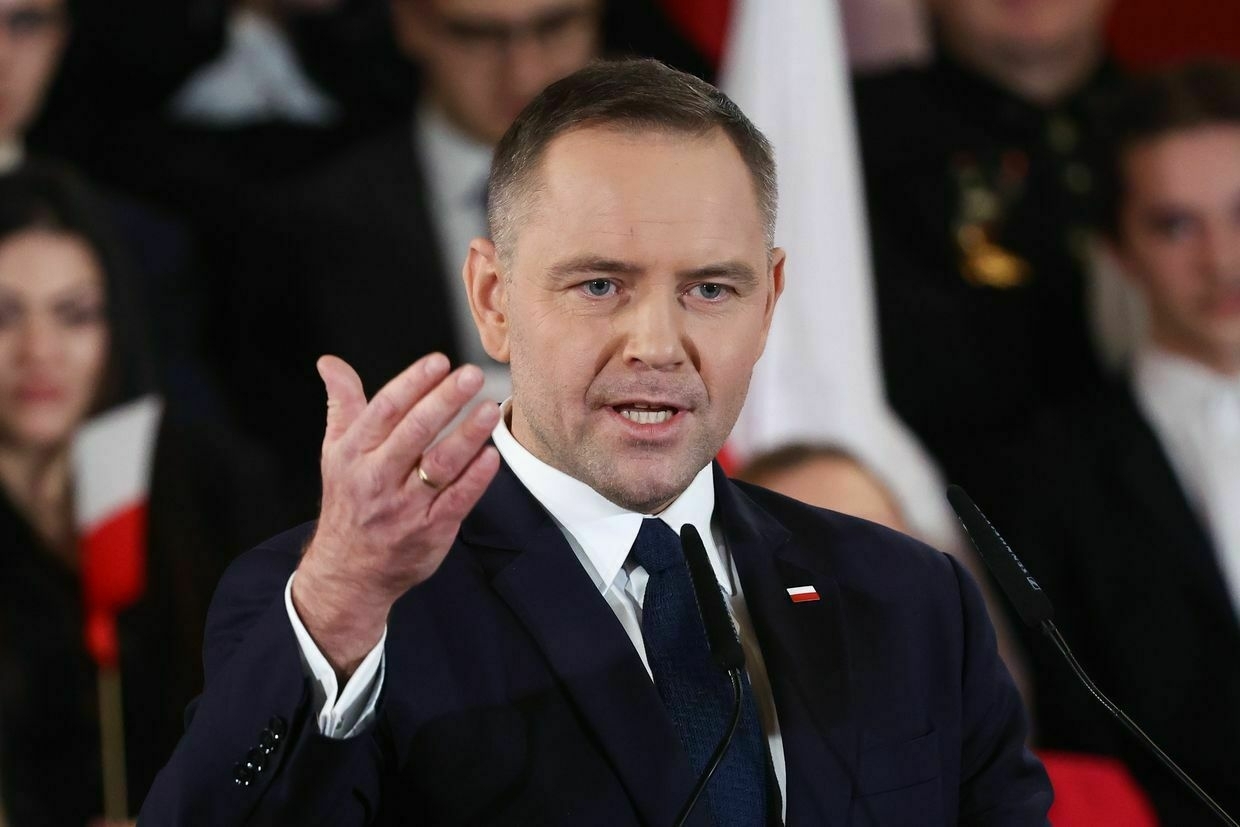
Karol Nawrocki during the convention in Krakow, Poland, on Nov. 24, 2024. The largest Polish opposition party Law and Justice nominated Nawrocki for president. (Jakub Porzycki / NurPhoto / Getty Images) “Today, I do not see Ukraine in either structure, neither in the European Union nor in NATO, until those important civilizational issues are resolved," Nawrocki said in January in reference to the World War II-era massacre of Poles by the Ukrainian Insurgent Army in the present-day Volyn Oblast of Ukraine.
The Volyn massacres, which saw tens of thousands of Poles living in Nazi-occupied Volyn killed and thousands of Ukrainians killed in reprisal attacks in 1943-1944, remain the most contentious topic in Polish-Ukrainian relations.
“Unfortunately, Ukraine has been playing the role of a ‘scapegoat’ for Polish politicians for quite some time now, a trend that began during the 2023 parliamentary campaign.”
When Tusk hailed a joint breakthrough in efforts to exhume Polish victims in modern-day Ukraine, Nawrocki dismissed the announcement as an "unnecessary trick."
Some of Nawrocki's sharpest comments were aimed personally at President Volodymyr Zelensky.
When nearly all European politicians — including Tusk — rushed to support Zelensky after his heated Oval Office exchange with Trump, Nawrocki, as well as the rest of PiS, backed the U.S. president instead.
Nawrocki even said that the subsequent pause on U.S. military support was the "result of President Zelensky's lack of gratitude and lack of ability to conduct international policy."
This bellicose rhetoric may seem at odds with PiS, whose past government led the charge in providing Ukraine with arms and other support during the full-scale war. But as the elections are coming near and the Ukraine fatigue is setting in, the conservative party may be shifting gears.
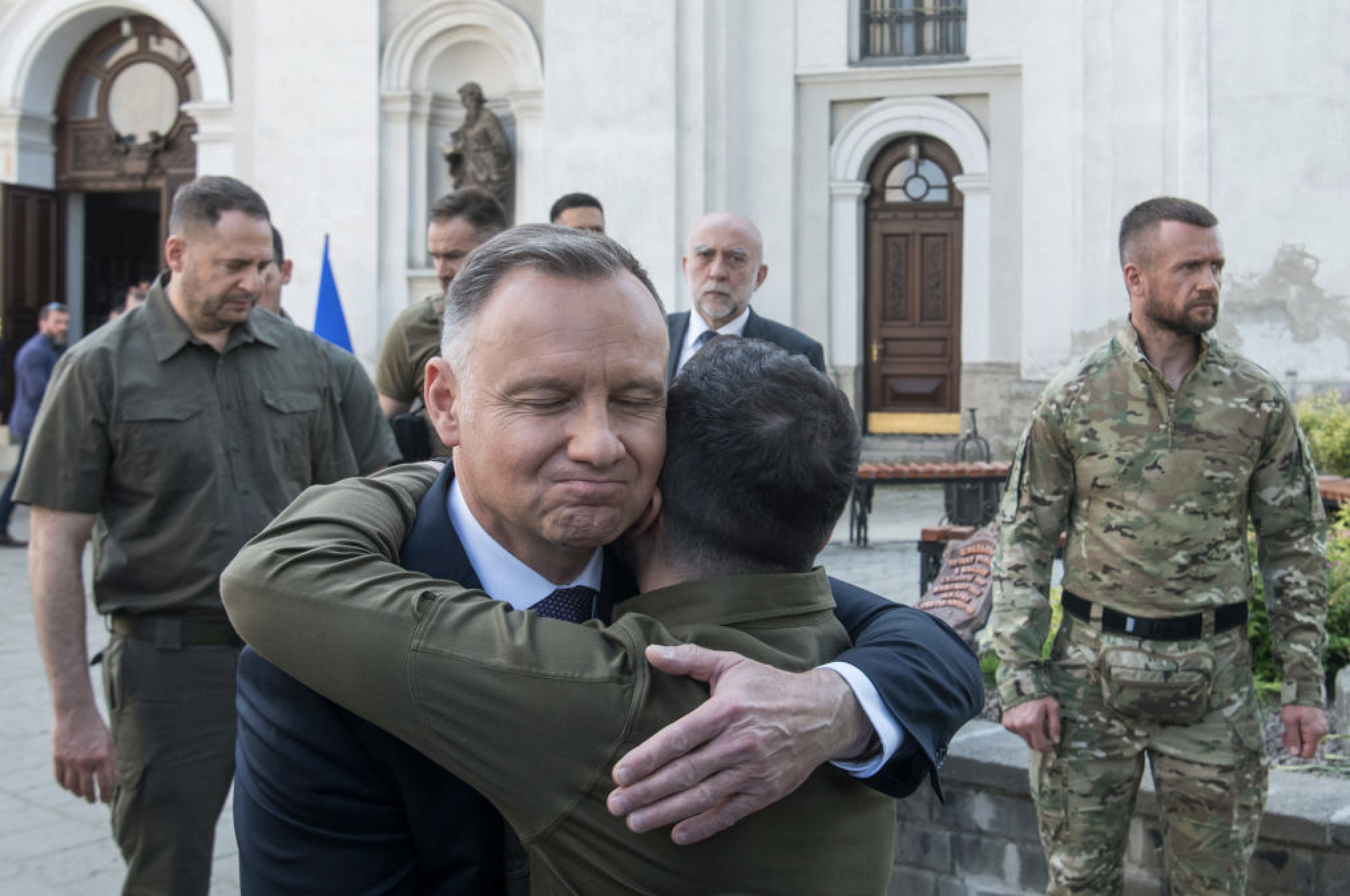
President Volodymyr Zelensky and Polish President Andrzej Duda after commemorating the victims of the Volyn Massacre in Lutsk, Ukraine, on July 9, 2023. (Maxym Marusenko/NurPhoto via Getty Images) "I suspect these are his (Nawrocki's) original views that were muted at the beginning because of the party policy, but now, because they are fighting for the same part of the electorate (as the far-right), he was 'let loose,'" Polish political scientist Pawel Borkowski told the Kyiv Independent.
Nawrocki's main opponent for second place, and thus a potential contender to face Trzaskowski in the runoff, is far-right Mentzen. His Confederation and PiS are likely to battle over rural voters and agrarian workers in the upcoming vote.
Farmers, who fear competition from their Ukrainian counterparts, represent a vocal part of the electorate, as their numerous protests and border blockades have demonstrated.
"Unfortunately, Ukraine has been playing the role of a 'scapegoat' for Polish politicians for quite some time now, a trend that began during the 2023 parliamentary campaign," Yevhen Mahda, executive director of the Institute of World Policy in Kyiv, told the Kyiv Independent.
Surveys reveal that the Polish public has grown more skeptical toward Ukraine and, specifically, Ukrainian refugees when compared to 2022.
According to a February poll commissioned by the Mieroszewski Center, 49% of Poles favored continued military support for Ukraine, yet only 40% supported assistance for refugees.
"The motive that Ukraine is not grateful enough is very present" in Polish society, said Aleksandra Kusztal, a political scientist at the Jan Kochanowski University of Kielce, in comments for the Kyiv Independent.
"Some elements (which) are typical for the Russian propaganda, Russian disinformation, are becoming more and more popular," such as the supposed negative impact of Ukrainians on Poland's social and healthcare system, she added.
50% of Poles oppose Ukraine’s EU, NATO membership until Volyn issue resolved, poll showsHalf of Poles believe Ukraine should not join NATO or the EU until the issue of exhuming Volyn massacre victims is resolved, according to a new poll published on Jan. 30.The Kyiv IndependentTim Zadorozhnyy
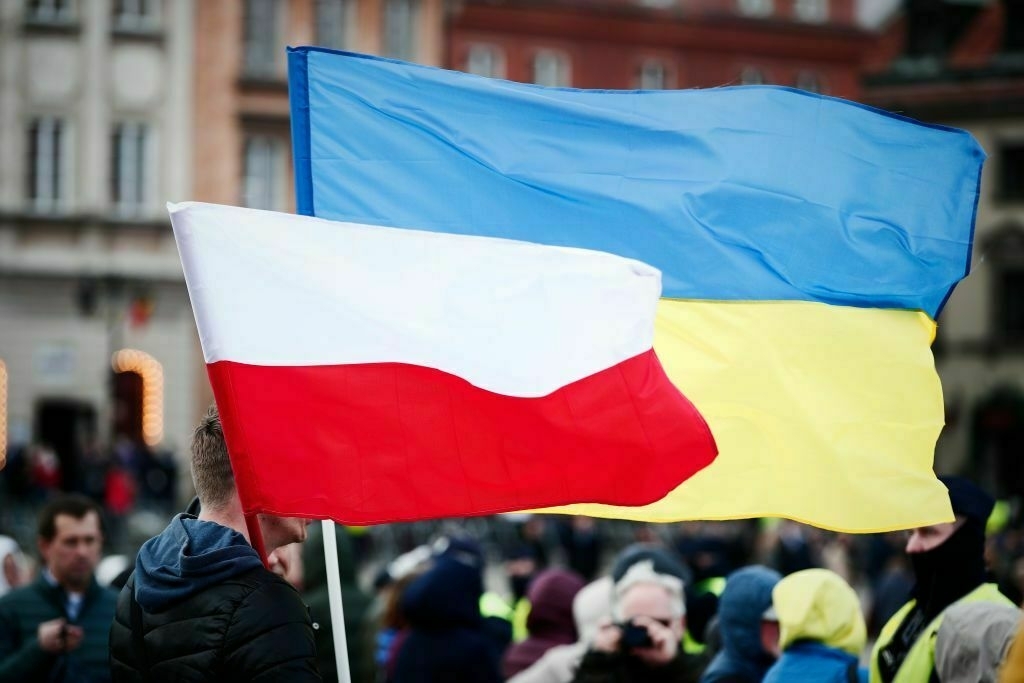
Slawomir MentzenA devout libertarian who voiced support for Polish exit from the EU, 38-year-old entrepreneur and tax advisor Mentzen has become one of Poland's most popular far-right politicians.
His apt use of the TikTok social network and public campaigning make it conceivable that he, not Nawrocki, will face Trzaskowski in the second round.
The Confederation, co-chaired by Mentzen, has long been seen as the only relevant force in Polish politics that could be described as openly hostile toward Ukraine.
During the parliamentary elections in 2023, during which the far-right significantly underperformed, Confederation said that Ukraine should pay for all assistance provided by Poland — an argument eerily echoing those coming from today's Washington.
However, emulating far-right populists across Europe, the Confederation has sought to purge its most controversial elements. Two of the most overtly pro-Russian figures, Janusz Korwin-Mikke and antisemite Grzegorz Braun, have been suspended or expelled from the coalition.

Slawomir Mentzen, co-leader of the Confederation alliance, tosses fake money to supporters during a campaign rally in Szczecin, Poland, on Sept. 16, 2023. (Sean Gallup / Getty Images) Mentzen himself has formally denounced Russian aggression and has largely shaped his Ukraine rhetoric along more transactional lines.
"Yes, it is profitable for us for Ukraine to defend itself against Russia, which is why Poles help Ukraine," Mentzen told Polsat. "Not out of sympathy, but because it is simply profitable for us."
"We send weapons to Ukraine, we send money, we send social benefits, we provide medical treatment for free in Poland to Ukrainians who do not even have medical insurance, while Poles have to pay, and in return we receive slander, they insult us and show absolutely no gratitude."
He also said that the West must reach some kind of an agreement with Russian President Vladimir Putin, as "there is no force on the horizon that will drive Putin out of Ukraine."
In some cases, Mentzen does not hesitate to push further. One episode that caught the attention of both Polish and Ukrainian media was his public spat with Lviv Mayor Andrii Sadovyi.
After visiting the western Ukrainian city on Feb. 24, Mentzen published a video near the monument to Stepan Bandera, calling the late Ukrainian nationalist a "terrorist" and accused Ukraine of "worshipping criminals."
Bandera, assassinated by the KGB in 1959, led the radical wing of the Organization of Ukrainian Nationalists and organized the assassination of Polish Interior Minister Bronislaw Pieracki.
Sadovyi lashed out against Mentzen, calling him a "pro-Russian politician with a Polish passport." Mentzen then named Lviv, which was part of Poland in the interwar period, a "culturally Polish city," a statement with explosive connotations during the ongoing Russian occupation of one-fifth of Ukraine.
Experts largely agree that this was a public stunt rather than a serious attempt at territorial revisionism, a topic with almost non-existent appeal in Polish politics.
"It was a pure provocation," Kusztal commented, calling Mentzen's campaign nevertheless "very strongly connected with Russian propaganda."
Kusztal presented Mentzen's anti-Ukraine rhetoric as "something quite new in his political biography." The expert suggested it could be a tactic to steal voters from Braun, who announced his own candidacy.
According to Borkowski, Mentzen wanted to strengthen his appeal across the various right-wing groups that make up the Confederation.
"Slawomir Mentzen's conflict with Andrii Sadovyi was staged and election-driven," Mahda concurred. "However, this does not negate the fact that historical policy plays a much greater role in public discourse in Poland than it does in Ukraine."
Who is to gain more from a ceasefire — Russia or Ukraine?U.S. President Donald Trump said on March 17 that he expects to hold a phone call with his Russian counterpart Vladimir Putin to discuss a U.S.-backed ceasefire proposal that Moscow has yet to agree to. Russia has declined to immediately accept the 30-day ceasefire proposal, with theThe Kyiv IndependentOleg Sukhov
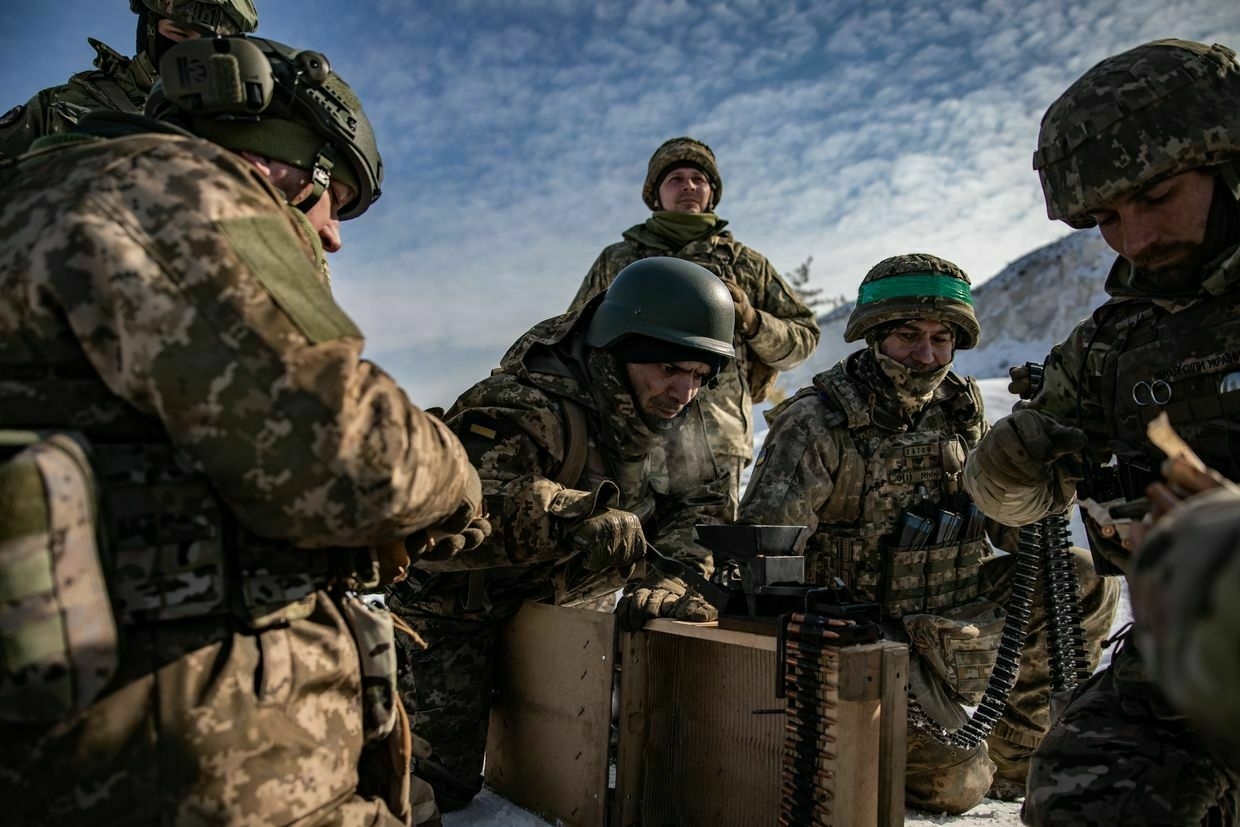
Note from the author:
Hi, this is Martin Fornusek.
I hope you enjoyed this article. If you want to help us provide you with more in-depth pieces on Ukraine's struggle against Russian aggression, European politics, and more, please consider joining the Kyiv Independent community.
Thank you very much.
Vucic vows to 'protect' Serbia from repeat of Ukraine's EuroMaidan
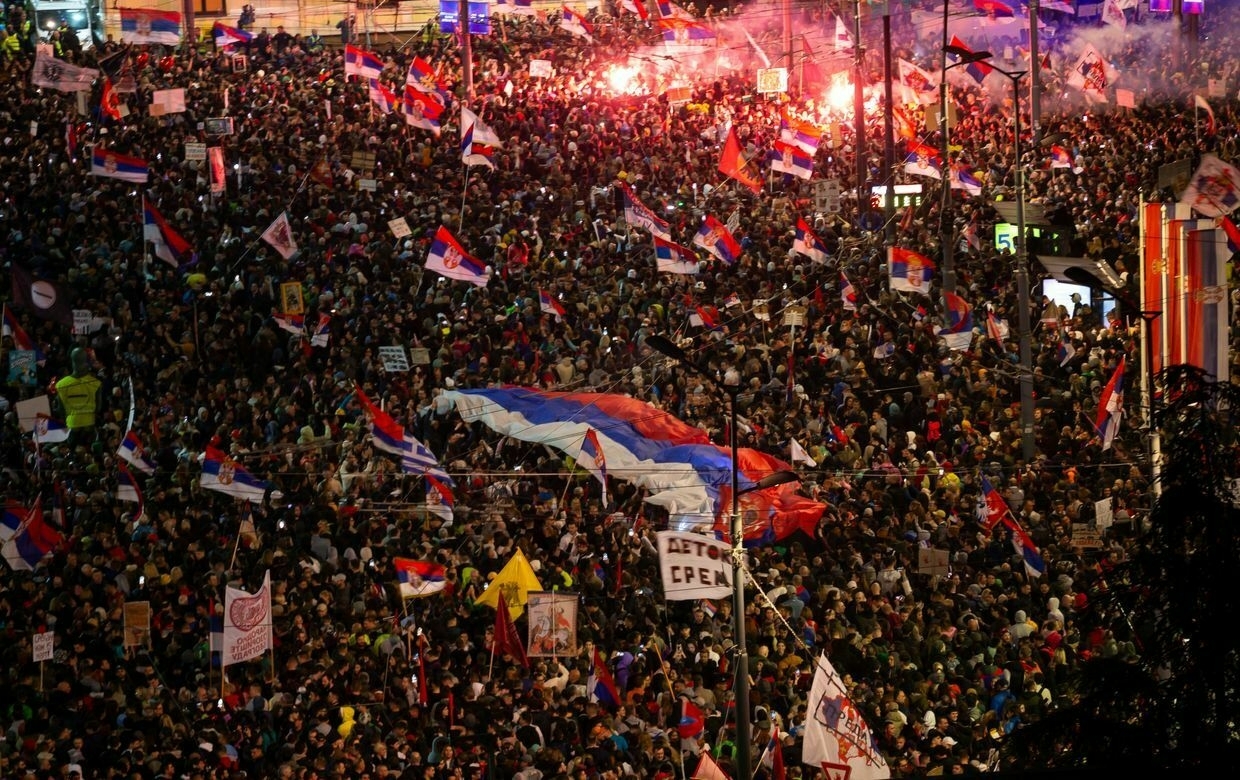
Serbian President Aleksandar Vucic on March 16 drew comparisons between the ongoing anti-government protests in Serbia and Ukraine’s 2014 EuroMaidan Revolution, vowing to “protect and defend” the country from such an event.
His comments followed a massive rally in Belgrade on March 15, culminating months of near-daily protests against corruption and misgovernance, posing the most significant challenge to Vucic’s 13-year rule.
Vucic accused protest organizers of spreading misinformation, including claims that authorities had shut down the internet and used sonic cannons against demonstrators.
“Then they came up with a story about a sonic cannon… but the army does not have such weapons,” Vucic said in a video address published on social media, insisting that what was shown was an anti-drone rifle, not a crowd-control device.
Vucic compared the accusations to those made against ousted Ukrainian President Viktor Yanukovych during the EuroMaidan protests, which saw over 100 demonstrators killed before Yanukovych fled to Russia in 2014.
“That’s how they started talking here: ‘Vucic, you shot at your own people,'” the Serbian president said. “There were no wounded; nothing happened to anyone, but they have to come up with something."
The protests erupted in November following the deadly collapse of a newly reconstructed train station roof in Novi Sad, which killed 15 people. The reconstruction, financed with Chinese and state funds, was widely viewed as corrupt.
Student-led demonstrations quickly grew into broader anti-government protests, demanding accountability and an end to corruption. Vucic, who maintains close ties with Moscow, has frequently used Kremlin-style rhetoric to discredit protests.
The Serbian opposition, along with student activists, has accused authorities of deploying a sound cannon against demonstrators during a silent vigil for the Novi Sad victims, with footage of people fleeing after a loud blast circulating on social media.
The Serbian president vowed an investigation into what he called “brutal fabrications and lies” and warned that those responsible would be prosecuted.
Rubio asked Hungary not to block EU sanctions, Politico reportsBudapest had initially planned to veto the sanctions renewal, citing U.S. President Donald Trump’s return to the White House and the possibility of a shift in U.S. policy toward Russia.The Kyiv IndependentTim Zadorozhnyy
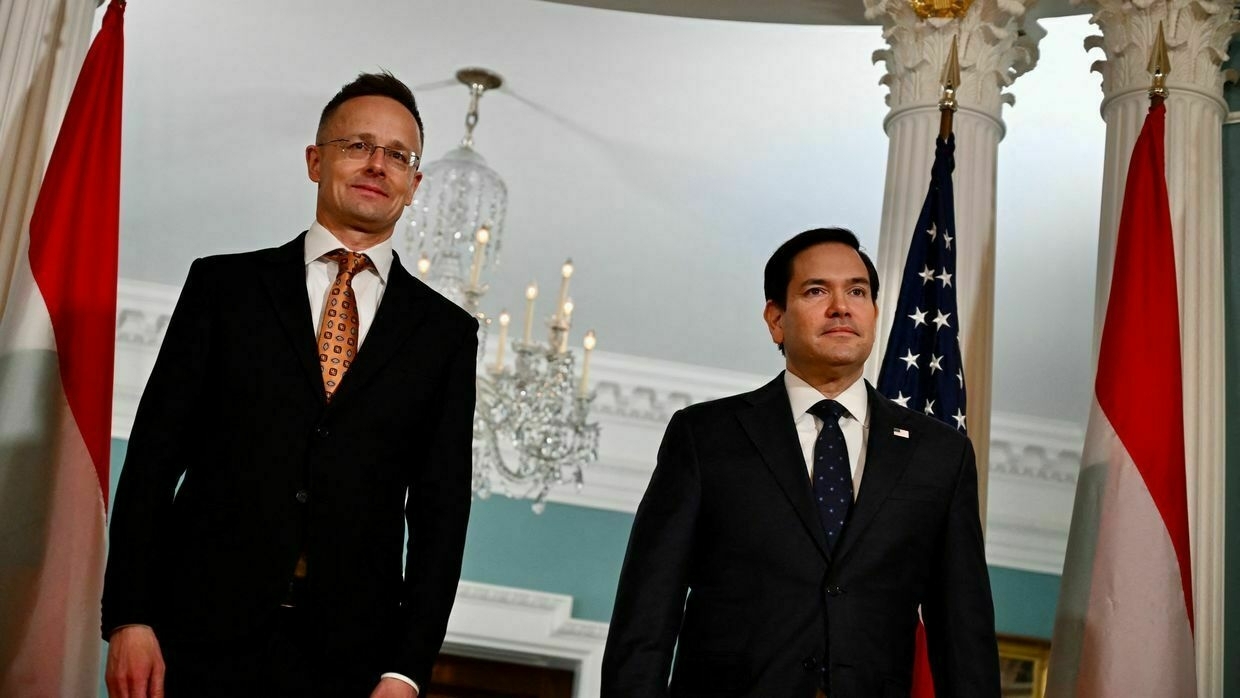
Georgia sentences ex-President Saakashvili to additional 4.5 years over illegal border crossing
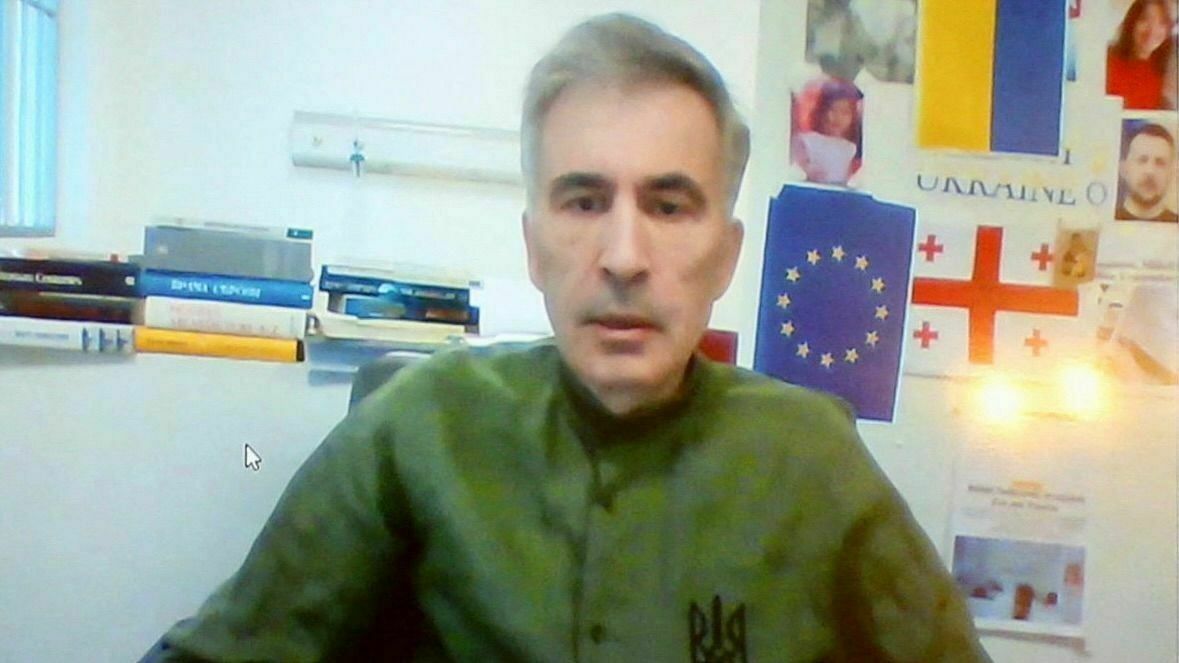
A court in Georgia has sentenced former President Mikheil Saakashvili to an additional four and a half years in prison on illegal border crossing charges, Georgian TV channel Mtavari reported on March 17.
The latest ruling follows a nine-year sentence issued last week on large-scale state funds embezzlement charges, adding up to almost 12 additional years in prison for Saakashvili.
The border crossing case concerns Saakashvili’s secret return from Ukraine to Georgia on Sept. 29, 2021, despite being wanted by Georgian authorities. He was arrested on Oct. 1, 2021.
Four others were charged in separate proceedings over Saakashvili’s illegal entry and released on bail.
Saakashvili, who served as Georgia’s president from 2004-2007 and to 2008-2013, sought to align the country with the West but lost elections to the Moscow-friendly Georgian Dream party years after a defeat in the 2008 Russia-Georgia war.
A longtime critic of Russian President Vladimir Putin, Saakashvili has accused billionaire Bidzina Ivanishvili, the honorary chairman of the Georgian Dream, of orchestrating his prosecution on Moscow’s orders.
The European Court of Human Rights (ECHR) ruled last May that there were no grounds to believe that Saakashvili’s criminal proceedings were unfair.
Since Georgia follows the principle of sentence absorption, Saakashvili’s earliest release date would be October 2030, considering his time in custody.
Saakashvili, who holds Ukrainian citizenship and previously served as the governor of Odesa Oblast, has faced worsening health conditions during his custody.
President Volodymyr Zelensky said in February 2023 that the “Georgian government is killing” Saakashvili after images surfaced showing his significant weight loss.
The ruling follows mass protests in Tbilisi over Georgia’s disputed October elections, which saw the Kremlin-friendly Georgian Dream party retain power.
The crisis deepened after Prime Minister Irakli Kobakhidze announced that Georgia’s EU integration could be delayed until 2028.
Russia open to civilian observers in Ukraine under possible peace deal“A peace treaty may provide for unarmed observers in Ukraine, a civilian mission to monitor the implementation of certain aspects of the agreement, or guarantee mechanisms,” Russian Deputy Foreign Minister Alexander Grushko said.The Kyiv IndependentTim Zadorozhnyy
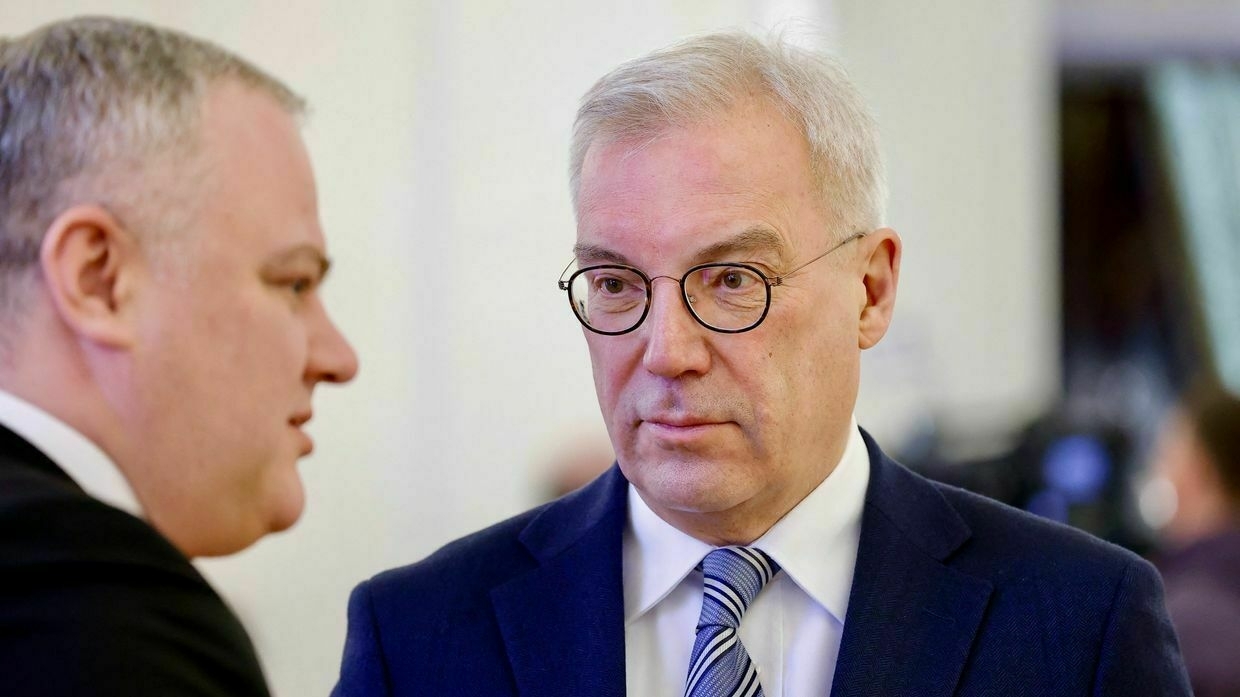
Ukraine’s surprising obsession with sushi
Editor’s Note: We strive to bring you the most unexpected stories about Ukraine you won’t find anywhere else. Through unique perspectives, we explore all aspects of life here: politics, art, culture, food habits, and people. Who would have thought that Ukrainians are huge fans of sushi?
Support us in discovering even more immersive stories with deep human interest and learning about Ukraine as more than just a country at war.
A version of this story first appeared in Bon Appétit.
The national food of Ukraine isn’t borscht. It’s sushi. In particular, it’s the Philadelphia roll.
Make this controversial observation to any Ukrainian you meet, and you’ll be met with a knowing chuckle.
When people ask me the most surprising thing I’ve learned in three years of war, they expect that I’ll talk about drone warfare, or the eerie feeling of an air raid shelter during a missile attack.
But when I first came to Ukraine, the thing that stuck out to me the most was the fact that you could find a sushi restaurant in pretty much every corner of the country.
In large cities and small villages – even close to the frontlines! – you can find the Japanese dish, with a Ukrainian twist.
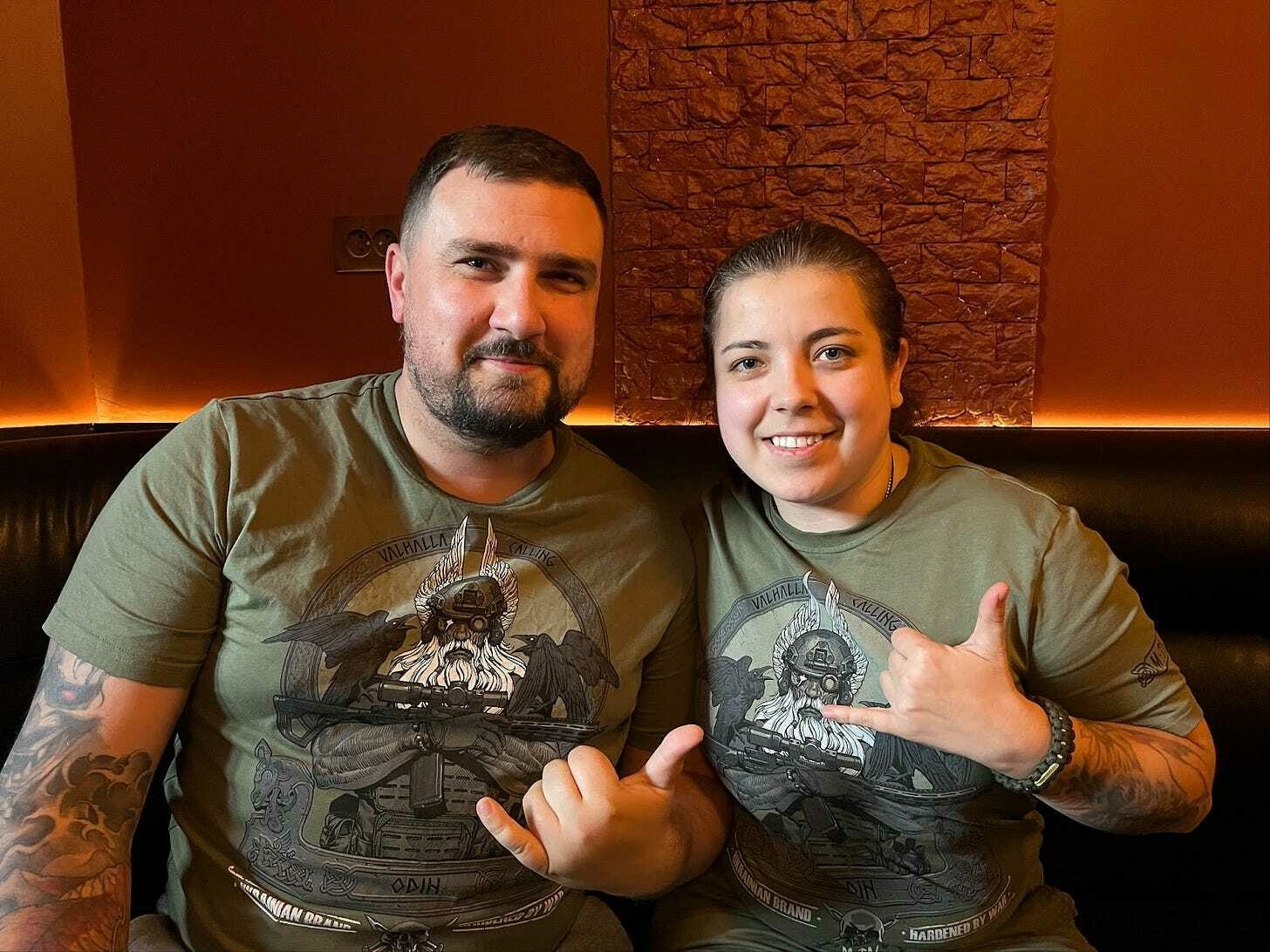
Blade, left, poses in a sushi restaurant after an interview, along with a fellow Ukrainian drone pilot. Meet Blade, who goes by that callsign while working as a Ukrainian drone pilot. At his request, we’re withholding his real name for security purposes.
Blade recounts how one of his sushi cravings unfurled during a brief moment of calm while stationed in the south of Ukraine during the first year of the country’s war with Russia.
"The enemy was very close,” he said.
The drone pilot and his team were just beyond the front lines, regrouping in the war-ravaged village of Bashtanka.
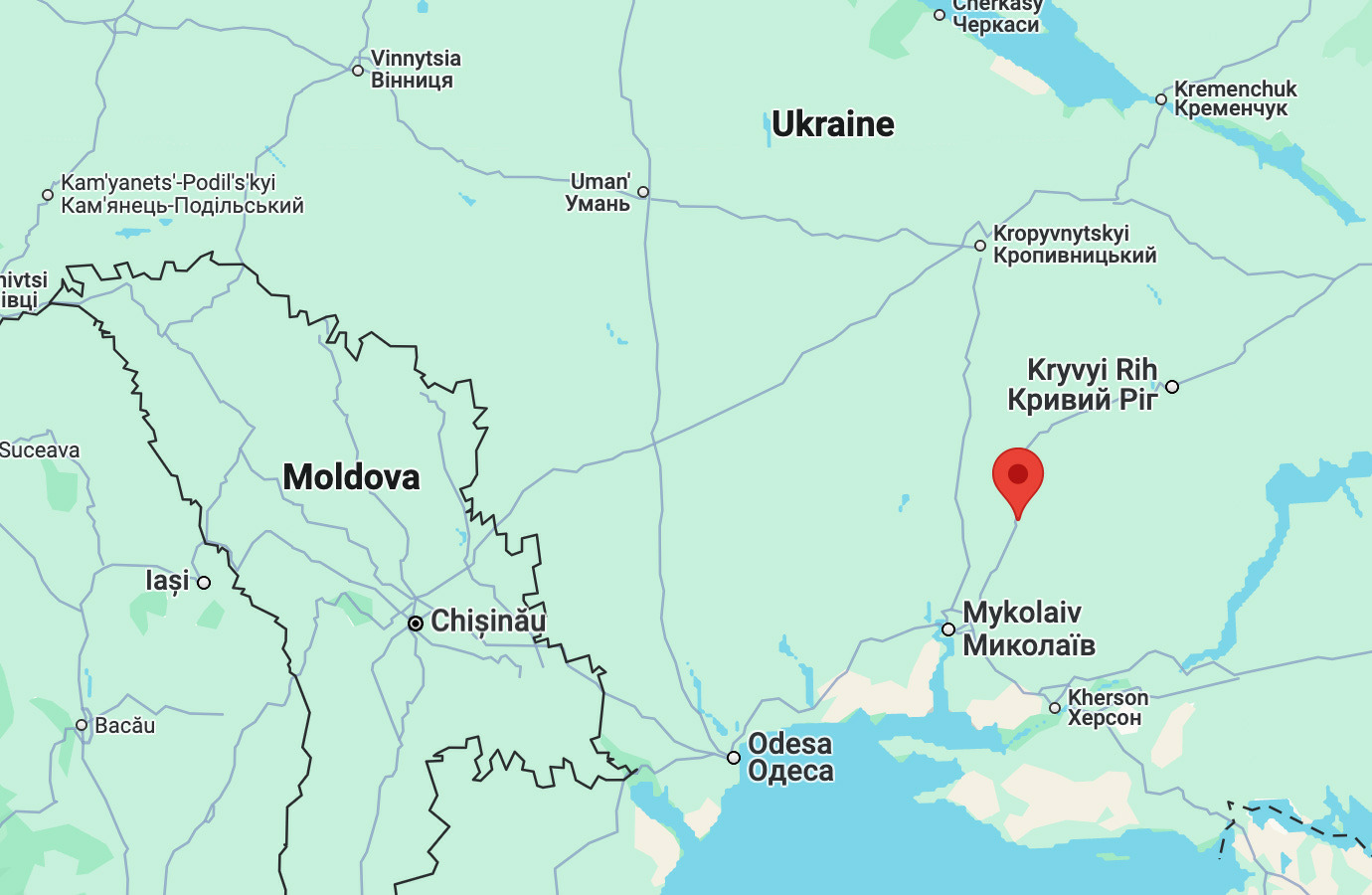
A map of Bashtanka, which at the time of Blade’s story was near the frontlines of fighting in the south of Ukraine. At the time, only a few thousand civilians remained, but during a lull, Blade walked into a cafe in search of sustenance and matter of factly asked, “What is on the sushi menu?"
Moments later, he was snacking on unagi – Japanese eel.
The cultural moment he shared during an interview that happened to take place in another sushi restaurant—this time in Kramatorsk, itself a frontline city that is a major logistics hub for fighting in east Ukraine.
Almost everywhere in Ukraine, sushi rolls are part of the diet of hungry troops. In fact, if you walk into a restaurant in Ukraine at random, there’s a very good chance it will serve sushi.
Google Maps backs this up. Zero in on Kyiv or almost any part of Ukraine and search for sushi, and you’ll likely be able to find a cafe or restaurant to satiate your fix.
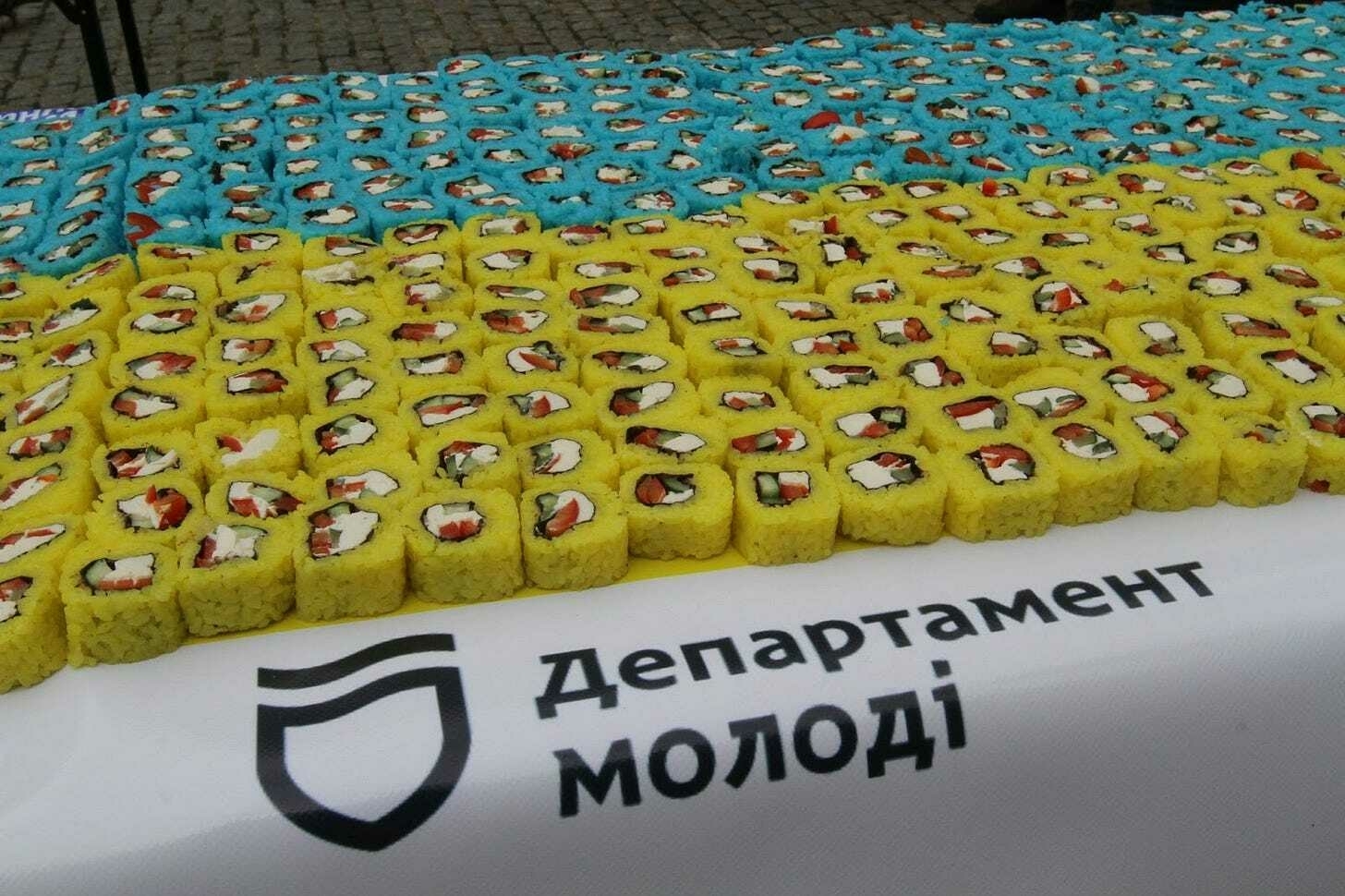
Five thousand pieces of sushi, arranged to look like the flag of Ukraine, available for sale in the Dnipro region. The initiative was done so that proceeds could support the Ukrainian military. (Mykola Myakshykov / Ukrinform/Future Publishing via Getty Images) Over the last twenty years, as the fight for an independent and democratic Ukraine has progressed, first through deadly protests, and now the ongoing war against Russian oppression, sushi has become a staple food.
“Sushi was probably one of the first properly foreign dishes that came to Ukraine [after the restoration of independence],” said Yaroslav Druziuk, the former editor-in-chief of The Village Ukraine, a Ukrainian culture and politics publication. “[At that time] sushi is the easiest way to feel like you're eating something exotic and fascinating… Want to impress your girlfriend? Set up a date in a sushi restaurant.”
The rise in sushi’s popularity is intertwined with a Ukrainian trend towards eating what America and the rest of the West eats—a cosmopolitan way of looking at the world absent of Russian influence.
According to Google search trends, the most sought after takeaway food in Ukraine is sushi. In Russia, it is kebab.
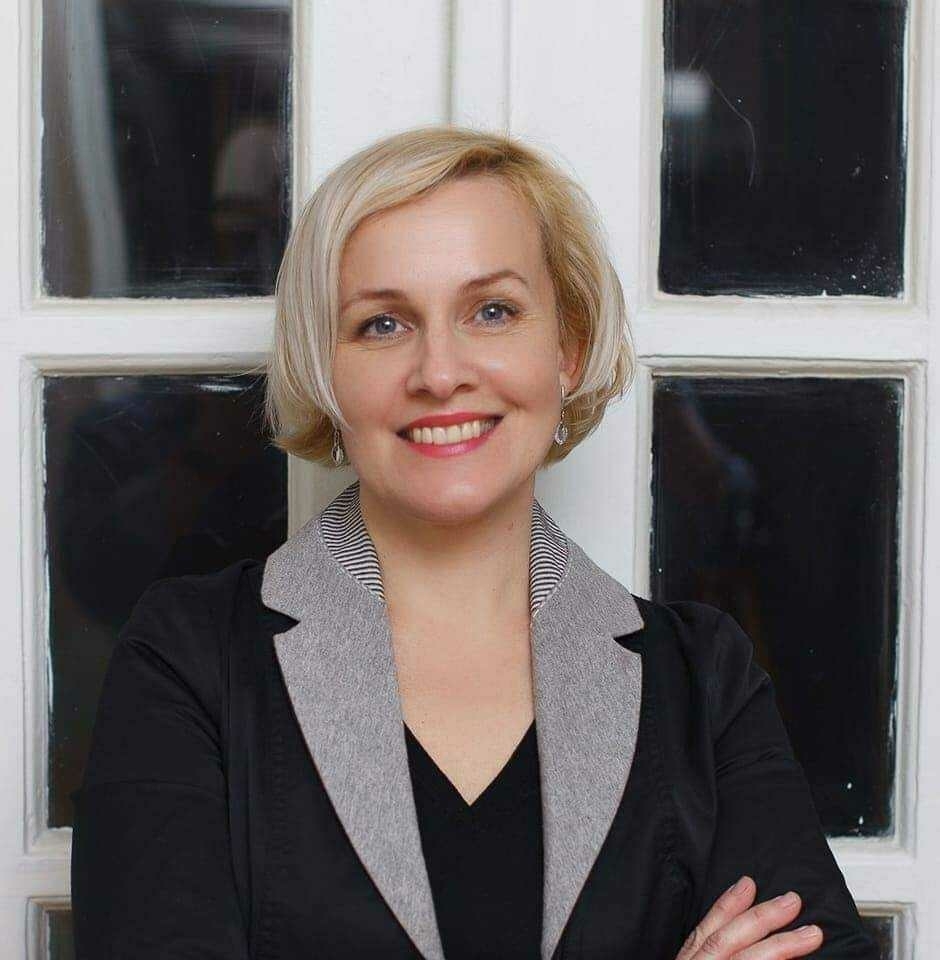
Olha Nasonova, restaurant consultant in Kyiv and co-founder of the National Restaurant Association of Ukraine Olha Nasonova, a restaurant consultant and co-founder of the National Restaurant Association of Ukraine, says that cold appetizers are “very popular” in Ukraine—sliced vegetables, sliced sausage, mushrooms — “and in some way, sushi replaced these cold appetizers because many people, even now, put sushi on the table instead. They can eat sushi first, then have a hot dish, and then dessert. And basically, this has become…a common practice for many families.”
I’ve asked countless Ukrainians why sushi is so popular here. It’s so entrenched at this point that most don’t give it any thought. “It’s just delicious!” is the most common reply.
But there are also subtle ways in which Ukrainian sushi history is intertwined with its politics.
Sushiya, now a common Ukrainian sushi chain, established its first store in 2006. Several years later, it opened a branch overlooking Kyiv’s Independence Square, or Maidan. The square is integral to the Ukrainian story.
In 2014, this is where protesters demanded the resignation of pro-Russian President Viktor Yanukovych and closer integration with the European Union. No doubt during frigid winter days, some pro-democracy protesters huddled in the Sushiya to stay warm and in the process ordered a few rolls. Today, Sushiya has 21 restaurants in five cities across Ukraine.
Following the successful Maidan Revolution, one way Ukrainian chefs and customers expressed themselves was freeing their palates of rigid culinary bonds.
“Ukrainian [sushi restaurants], especially the places that opened up after 2014, they had more freedom to make experiments,” Druziuk said.
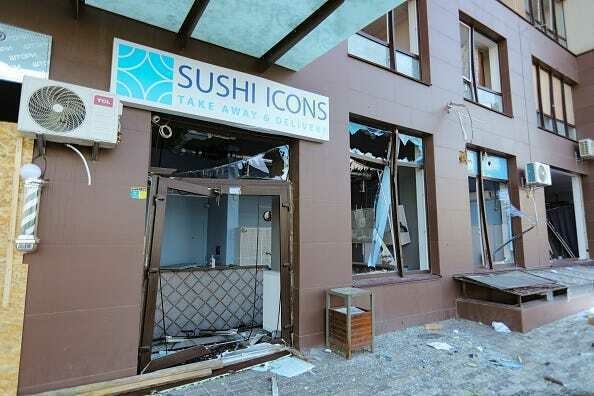
A sushi restaurant shows damage caused by a shock wave after a missile strike carried by Russian troops against a shopping mall in the Podilskyi district of Kyiv. (Photo by Yuliia Ovsiannikova / Ukrinform/Future Publishing via Getty Images) In taste and texture, most sushi is about as far from traditional Ukrainian food as you can get. Ukrainian cuisine typically emphasizes foods like varenyky and borscht and buckwheat—and there’s often a hefty serving of smetana, a sort of sour cream, but as happens in nearly every cultural food mashup in societies around the world, Ukrainians added a personal twist on their sushi-eating habits.
"In post-Soviet Union countries, it was quite typical to have a mixture of milk and fish products, fish with mayonnaise in a salad, stuff like that," says Ukrainian chef Serhii Khehai, who manages a high-end Kyiv sushi counter called Shima.
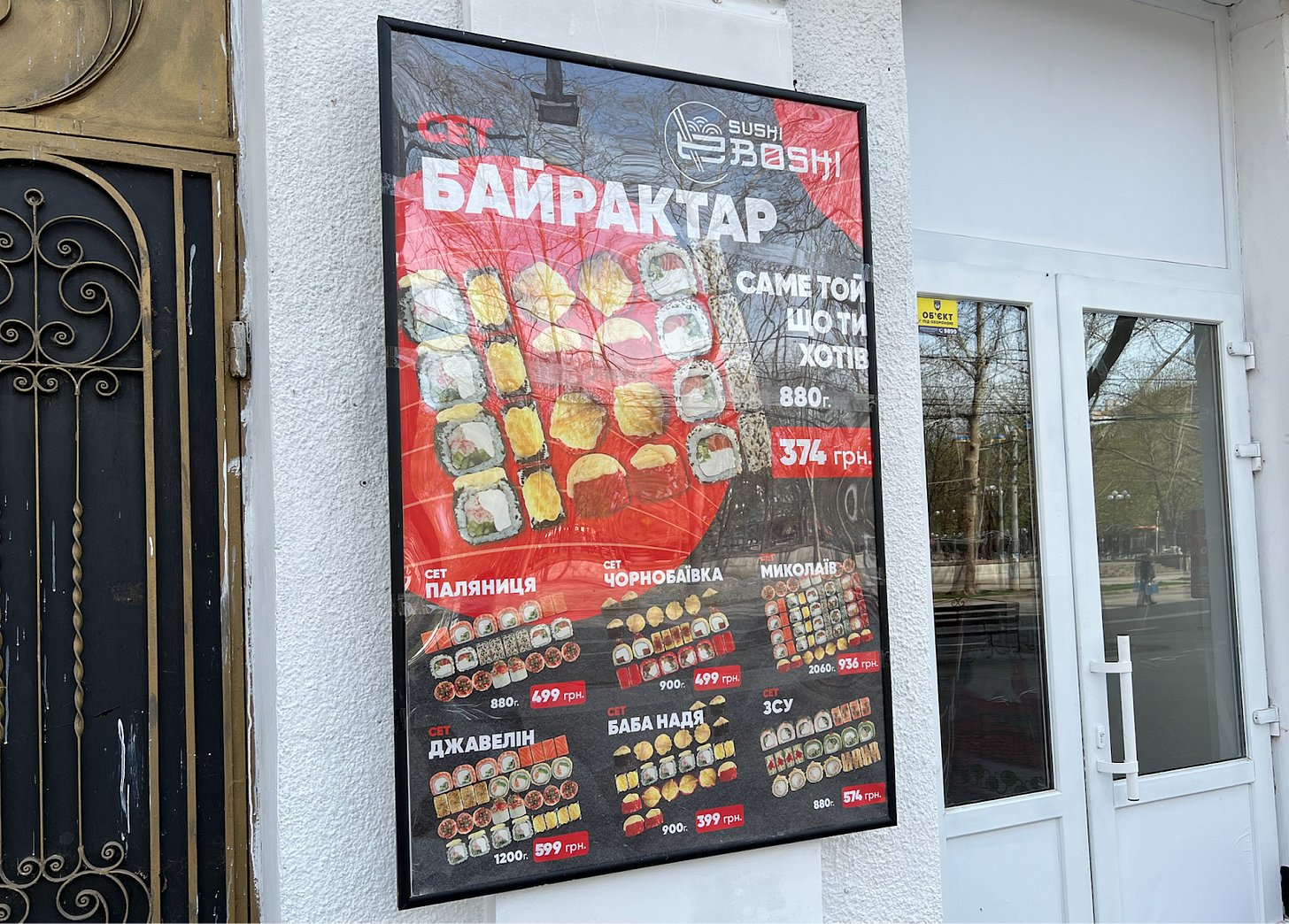
At a sushi restaurant in Odesa, different sets are named after the Bayraktar drone, Javelin missile, and the Ukrainian military. And these combinations have found their way into Ukrainian sushi menus. “I’ve personally tried various adaptations of sushi, like sushi with mashed potatoes and herring, or rolls with beetroot and salmon, for example,” says Nasonova.
The experimentation led itself naturally to sushi paired with cream cheese, or mayonnaise, or other types of cream sauces – a departure from the subtle flavors of traditional Japanese cuisine.
The country’s favorite type of sushi, by far, is the Philadelphia Roll – the sushi characterized by cream cheese paired with raw or cooked fish.
Sushiya has no less than 34 versions of the Philadelphia Roll on its menu, such as the 'Philadelphia Grilled Greens with Salmon Well Done,' which features salmon stewed in soy sauce, cream cheese,and cheddar cheese, topped with some onion crumble; or a version with mussels, tomato, crab mix, avocado, shaved tuna and cream cheese.
“A Japanese person who eats sushi as an everyday food would be surprised by the variety of our menu… we’re not afraid to surprise, adding something of our own,” said Artem Mykhailenko, a Sushiya employee at the Independence Square location.

Ukrainian sushi chef Igor Besukh, 23 years old, prepares one of his creations at the WOKA restaurant in Kramatorsk, on July 15, 2022, amid the Russian invasion of Ukraine. (Photo by MIGUEL MEDINA/AFP via Getty Images) Getting fresh raw fish into the country has been a challenge in a period of wartime, when all flights are grounded. Ukraine’s only nearby major body of water is the Black Sea, where ongoing military operations are underway.
But restaurateurs have found a way to meet demand, despite the regular power outages, drone attacks, and missile strikes across the country.
Over time, Khehai has been able to source salmon from Scotland, and other fish from countries like Spain, using road transport to get it across the border from Poland into Ukraine.
He orders his fish to arrive by Tuesday evening—chilled, never frozen. The sushi counter's freshest fish is served on Wednesday.
“It is quite interesting because it is the only available exotic food at the moment. One could say that people in Ukraine are getting poorer, and they really want something unusual, something exotic, something that differs from their usual diet,” said Nasonova. “And sushi has taken on this role. Sushi is not just food, it is a celebration.”
In this time of great uncertainty — and unstable American support — it means that the situation on the ground is very dangerous. Your contributions help us get the body armor, medical gear, and supplies we need to stay safe.
Show your support by contributing to our tip jar - funds go towards keeping us safe and ensuring our work continues.
Tim Mak x Felicity Spector talk about Ukrainian food!
NEWS OF THE DAY
Good morning to readers; Kyiv remains in Ukrainian hands.
G7 PRESSURES RUSSIA WITH SANCTIONS TO FORCE CEASEFIRE: The US and other G7 countries have warned Russia that they will expand sanctions and use frozen Russian assets to support Ukraine if Moscow does not agree to a ceasefire, The Financial Times reported. Sanctions may include oil price caps. Additionally, Marco Rubio made it clear that territorial concessions should be made not only by Kyiv but also by Moscow.
This week, after a meeting of American and Ukrainian negotiating teams, Kyiv proposed signing a comprehensive 30-day ceasefire that would apply on land, in the air, and at sea. However, Russia signaled its unwillingness to do this immediately.
U.S. MAY IMPOSE RESTRICTIONS ON RUSSIAN ENTRY: The United States is preparing new restrictions on the entry of citizens from 43 countries, including Russians and Belarusians, according to The New York Times. The proposal includes three levels of restrictions: red, orange, and green.
Russia and Belarus are in the orange category, which involves strict restrictions on visa issuance, though it does not mean a suspension. Wealthy businessmen from Belarus and Russia may still be allowed to enter the United States, but immigrant and tourist visas for citizens of these countries could be blocked. Additionally, citizens from these countries must undergo a personal interview to obtain a visa.
UKRAINE IS ALMOST OUT OF MISSILES FOR AIR DEFENSE: Kyiv has urgently requested that Italy and France provide additional missiles for its Samp-T air defense batteries, as its available stockpile is nearly depleted, according to Corriere della Sera. Ukraine has reportedly been asking the governments for 50 missiles for several weeks, but they have been slow to respond. Italy has already exhausted its stockpile, leaving only an untouchable reserve.
Samp-T systems have not always performed well during massive Russian attacks, unlike the American Patriot systems. However, due to the U.S.'s unstable arms supplies, Kyiv seeks to bolster its defense capabilities by any means necessary.
UKRAINIAN CHILDREN SEARCH THREATENED DUE TO MUSK: Elon Musk's DOGE has stopped funding a Yale University team that was helping to track down children deported to Russia, The Telegraph reported. They were gathering information from open sources about abducted children and passing it on to Ukraine. In cooperation with the Bring Kids Back UA campaign, launched by Ukrainian President Volodymyr Zelenskyy, the team found hundreds of Ukrainian children.
CAT OF CONFLICT
Today we have a cat of conflict who was accompanying a woman to raise money for the animal shelter near a metro station. It was a cold evening, resembling the last days of winter, but the cat was resting peacefully, wrapped in the fabric and warmed by the woman’s arms.
Stay safe out there.
Best,
MarianaBelarus Weekly: Belarus drops out of top 20 global arms exporters list
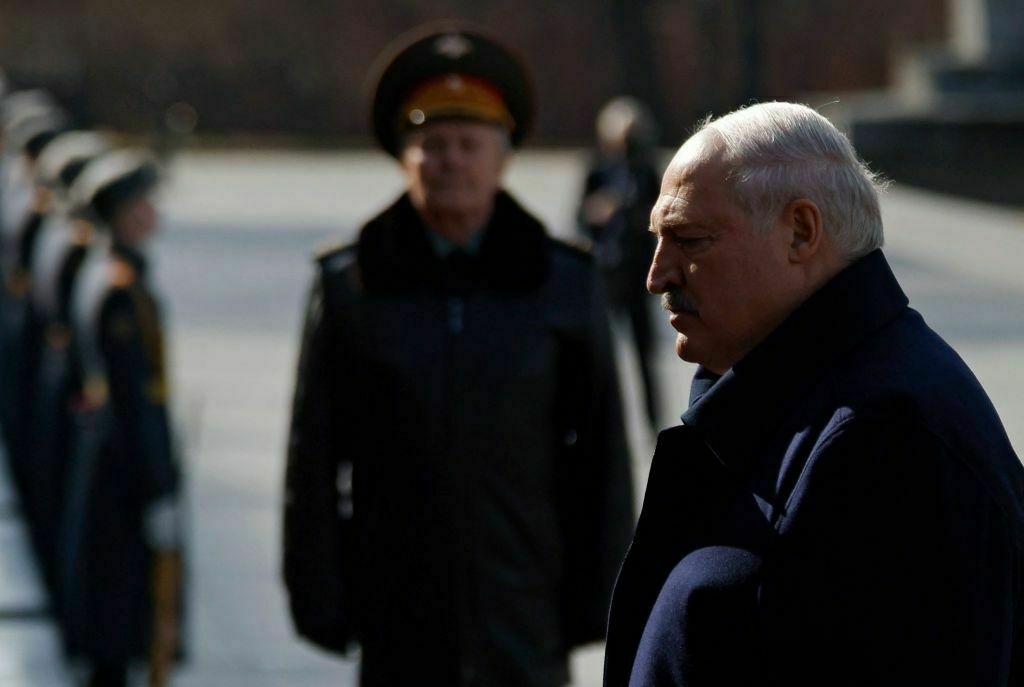
Russia proposed building a drone factory in Belarus with an annual capacity of 100,000 units.
Belarusian dictator Alexander Lukashenko appoints new government ahead of his seventh “inauguration.”
Belarus cracks down on the unemployed amid workforce shortages.
UN experts urge Belarus to end the incommunicado detention of political prisoner Siarhei Tsikhanouski, after two years of him being hidden from the public eye.
Belarus drops out of the top 20 global arms exporters, SIPRI report finds.
Subscribe to the NewsletterBelarus Weekly<span data-sanitized-id="belarus-weekly-info" data-sanitized-class="belarusWeekly__info"></span> <button data-sanitized-id="belarus-weekly-subscribe-btn" data-sanitized-class="belarusWeekly__form_button"> <span data-sanitized-class="belarusWeekly__form_label">Join us</span> <path d="M4.45953 12.8114H7.90953C8.00052 12.8127 8.09085 12.7958 8.17517 12.7616C8.25949 12.7274 8.3361 12.6766 8.40044 12.6123C8.46478 12.548 8.51556 12.4714 8.54975 12.387C8.58395 12.3027 8.60088 12.2124 8.59953 12.1214C8.58173 11.9269 8.48974 11.7467 8.34265 11.6183C8.19555 11.4898 8.00465 11.4229 7.80953 11.4314H4.45953C4.27653 11.4314 4.10103 11.5041 3.97163 11.6335C3.84223 11.7629 3.76953 11.9384 3.76953 12.1214C3.76953 12.3044 3.84223 12.4799 3.97163 12.6093C4.10103 12.7387 4.27653 12.8114 4.45953 12.8114Z" fill="white"></path> <path d="M8.6 15.0114C8.60135 14.9204 8.58442 14.83 8.55022 14.7457C8.51603 14.6614 8.46525 14.5848 8.40091 14.5205C8.33656 14.4561 8.25996 14.4053 8.17564 14.3711C8.09131 14.3369 8.00098 14.32 7.91 14.3214H2.69C2.507 14.3214 2.3315 14.3941 2.2021 14.5235C2.0727 14.6529 2 14.8284 2 15.0114C2 15.1944 2.0727 15.3699 2.2021 15.4993C2.3315 15.6287 2.507 15.7014 2.69 15.7014H7.81C8.00511 15.7099 8.19602 15.643 8.34311 15.5145C8.49021 15.386 8.5822 15.2058 8.6 15.0114Z" fill="white"></path> <path d="M24.4202 6.01122H7.55022C7.43403 5.99626 7.31641 5.99626 7.20022 6.01122L7.08022 6.06122C6.85578 6.16602 6.66595 6.33276 6.53308 6.54181C6.4002 6.75086 6.32982 6.99352 6.33022 7.24122C6.32744 7.43266 6.36832 7.62222 6.44976 7.79549C6.5312 7.96876 6.65105 8.1212 6.80022 8.24122L12.5802 13.4512L6.89022 18.7112C6.71923 18.8375 6.57973 19.0016 6.4826 19.1907C6.38546 19.3797 6.33331 19.5887 6.33022 19.8012C6.32652 20.0535 6.3952 20.3015 6.52812 20.516C6.66105 20.7304 6.85264 20.9023 7.08022 21.0112C7.14691 21.0484 7.21729 21.0786 7.29022 21.1012C7.46476 21.1609 7.64625 21.1979 7.83022 21.2112H24.5102C24.8263 21.2048 25.1378 21.1355 25.4268 21.0074C25.7158 20.8792 25.9763 20.6948 26.1932 20.4648C26.4101 20.2349 26.579 19.9641 26.6901 19.6681C26.8012 19.3722 26.8522 19.0571 26.8402 18.7412V8.47122C26.8278 7.82952 26.5701 7.21694 26.12 6.7594C25.6699 6.30185 25.0616 6.03412 24.4202 6.01122ZM8.57022 8.08122L7.92022 7.49122H24.4202L16.4902 14.6812C16.407 14.7305 16.312 14.7565 16.2152 14.7565C16.1185 14.7565 16.0235 14.7305 15.9402 14.6812L8.57022 8.08122ZM7.73022 19.7912L8.48022 19.1112L13.4802 14.5812L14.8802 15.8612C15.1804 16.157 15.5793 16.3315 16.0002 16.3512C16.4212 16.3315 16.82 16.157 17.1202 15.8612L18.5202 14.5812L24.2002 19.8012H7.73022V19.7912ZM25.3502 18.7112L19.6602 13.5912L25.3502 8.37122V18.7112Z" fill="white"></path> </button> </div>Russia proposes to build drone factory in BelarusRussia has proposed to build a drone factory in Belarus capable of producing 100,000 drones every year, the press office of Belarusian dictator Alexander Lukashenko reported on March 6.
Deputy Head of the Russia Presidential Administration Maxim Oreshkin made the offer during a meeting with Lukashenko at a military exhibition in Minsk, the press office said. The drones will reportedly be built using Russian licenses.
“It’s very important that Belarus has its own (drone) production facilities, which would strengthen both its economy and national security,” Oreshkin said.
“We’re ready to build the plant. We guarantee: you wouldn’t be able to build it in Russia the way you could build it here,“ Lukashenko said in response.
The announcement does not specify whether the plant will produce military drones. Yury Kozarenko, a member of the Russian delegation, said that drone production in Belarus could contribute billions to Belarus’s GDP, as drones are also used in agriculture, logistics, and education.
A staunch Kremlin ally, Lukashenko has repeatedly claimed that Belarus needs to prepare for war and adapt to modern warfare. The Belarusian Defense Ministry reported on Nov. 15, 2024, that it was developing military drones domestically. By the end of 2025, the Belarusian military is expected to have “a wide range of combat drones,” including a 30-kilometer range “Chekan-V” and “Peacemaker” with a reported 10 kilogram warhead and a 100 kilometer range, according to the Head of Application and Development of the Unmanned Aerial Systems department of the Belarusian army, Mikhail Bransky.
Currently, Russia uses around 100 to 200 Iranian-developed Shahed-type kamikaze drones in its daily attacks on Ukraine, Vadym Skibitskyi, the deputy head of Ukraine’s military intelligence agency (HUR), said on March 3. Russia plans to increase the number of drones and sites from which drones will be launched, he added.
Since July 2024, Russian drones have crossed into Belarusian airspace with increasing frequency. Some of them have crashed in the vicinity of residential areas, although so far without causing casualties.
Minsk has never publicly objected to Moscow over these incursions, and local authorities tend to conceal incidents and provide no comment.
Lukashenko appoints government before official ‘inauguration’Belarusian dictator Alexander Lukashenko, not yet officially inaugurated as president following the Jan. 26 sham presidential elections, has appointed a new government, naming Alexander Turchin as the country’s new prime minister.
Lukashenko began his seventh consecutive term as president amid widespread repressions and in an atmosphere of fear, human rights activists report. The Belarusian autocrat maintained his grip on power by brutally suppressing nationwide protests that engulfed the country following fraudulent 2020 presidential elections.
Turchin, the new prime minister, was appointed on March 10, after previously serving as head of the Minsk regional executive committee. He is under EU, U.K., Swiss and Norwegian sanctions over the suppression of mass protests in 2020.
Following the appointment, Turchin told reporters that Belarus would not see any “significant course correction,” adding that his approach would be one of “evolution without revolutions.”
His predecessor, Raman Halouchanka, was transferred to the position of head of the Belarusian National Bank. While announcing the appointment, Lukashenko called for the bank and the government to “find common ground” in terms of financing the economy.
Analysts say the appointment of Halouchanka will weaken the bank’s monetary policy, as the former prime minister lacks a background in finance.
Lukashenko has previously ordered government interventions in the economy, and was forced to subsidize struggling state-owned enterprises.
Inflation risks are mounting, according to Beroc, the country’s leading independent economic think tank. In 2024, inflation was reined in to 5.2% with the help of heavy government regulation of consumer goods pricing. If the restrictions were to be relaxed, inflation would accelerate to 6-8%, experts believe.
Lukashenko presented the official appointments as the advent of a “new generation” in Belarusian leadership. However, the government consists largely of the same ministers, except for Uladzimir Karanik, formerly the chairman of one of the Regional Executive Committees, who was appointed deputy prime minister, and Kiryl Zalesky, the former head of the High-Tech Park information technology development initiative, who became minister of informatization.
Political analysts do not foresee any real changes, saying that in general, the appointments were an “old system masquerading as new.”
Belarus cracks down on unemployed amid labor shortagesBelarusian authorities are attempting to remedy the country’s current labor shortages by targeting the unemployed with a special tax, independent Belarusian media have reported.
Belarus in 2015 adopted a Soviet-style decree requiring working-age citizens without formal employment or income to pay an annual fee of about $200. Dubbed “the tax on parasitism,” the measure sparked mass protests and was suspended in 2017. It came into effect again three years later, replacing the direct tax with the obligation to pay the full cost of household utilities, which are typically subsidized by the government. Currently, the rate is five times higher for those considered “parasites.”
In February 2025, Belarus’s Interior Minister Ivan Kubarkov announced raids against “deadbeats” — the working-age citizens who have not been officially employed for a long time, have no declared income, and don’t pay taxes. The announcement followed Lukashenko’s claim on Jan. 21 that it was necessary to bring more unemployed people back into the labor market.
Throughout the first weeks of March, Belarusians in Minsk were summoned en masse to the employment administration and questioned regarding their sources of income. The exiled Belarusian news outlet Nasha Niva reported that summons were delivered even to those who had left the country decades ago.
Belarus is grappling with a serious labor shortages: the state jobs database currently lists 188,700 vacant postings, a significant amount for a nation of 9.5 million with an estimated 4-4.5 million workforce. Healthcare alone faces a shortfall of 10,000 workers. Up to 57% of employers in Belarus reported experiencing a shortages of staff, according to the independent research center rabota.by. The Eurasian Development Bank foresees further wage increases in 2025, fueled by competition over scarce labor.
The natural aging of the population in Belarus is being exacerbated by the mass emigration of the most economically and politically active population, the economic think tank Beroc reports. By various accounts, between 300,000 and 500,000 Belarusians have left the country since 2020, after that year’s fraudulent elections triggered massive protests and a subsequent crackdown on public protests.
At the same time, former political prisoners are not being offered jobs, and workers are being dismissed for supporting an opposition candidate in 2020. On March 3, Lukashenko reiterated his demand that people who participated in protests should not be hired, slamming them as “the enemies of the state.”
UN experts demand to end incommunicado regime on 2nd anniversary of Tsikhanouski’s ‘enforced disappearance’Sixteen United Nations human rights experts issued a statement on March 7 demanding that the Belarusian authorities disclose the fate and whereabouts of former presidential candidate and political prisoner Siarhei Tsikhanouski.
The jailed activist, who sought to challenge Belarusian dictator Alexander Lukashenko in the 2020 presidential elections, has been held incommunicado for the past two years.
Among Belarus’s 1,200 political prisoners, nine leaders of the 2020 pro-democracy movement remain fully isolated from the outside world in what’s known as an incommunicado regime. The human rights community considers the regime to be a form of enforced disappearance that amounts to torture.
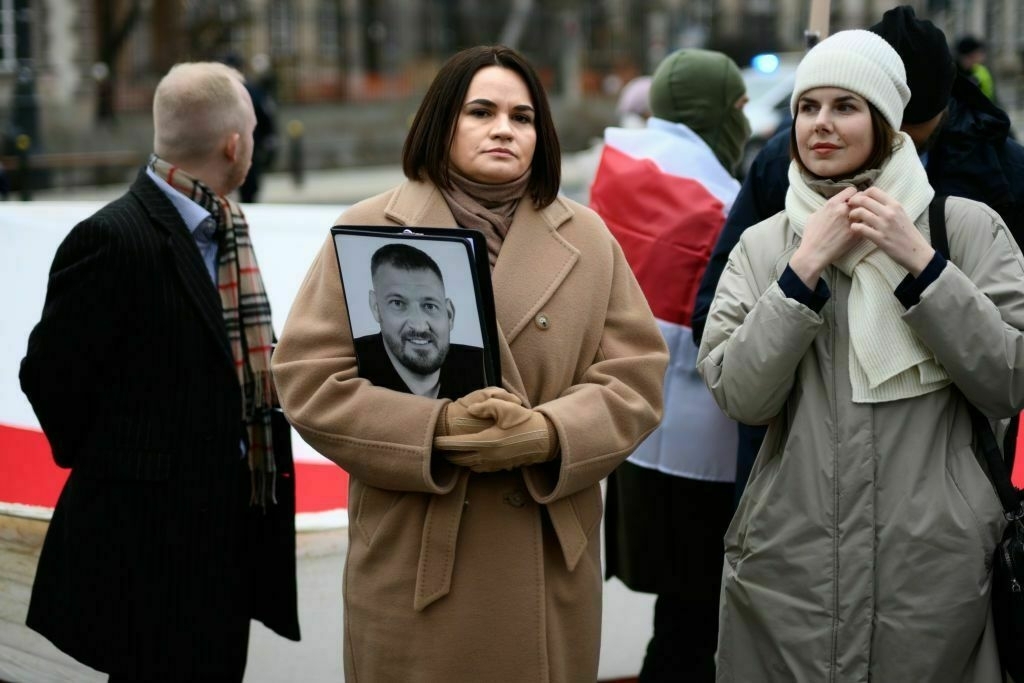
Belarusian opposition leader Sviatlana Tsikhanouskaya joins a march protesting Belarusian elections on Jan. 26, 2025 in Warsaw, Poland. (Jaap Arriens/NurPhoto via Getty Images) The UN experts, including Chair-Rapporteur of the United Nations Working Group on Enforced or Involuntary Disappearances Gabriella Citroni, Special Rapporteur on Belarus Nils Muižnieks, along with other experts, urged Belarus to enable contact to be restored with Tsikhanouski and other opposition leaders, such as Mikalai Statkevich, Viktar Babaryka, Maria Kalesnikava and Maksim Znak.
“The enforced disappearance of Mr. Tsikhanouski and others is a blatant violation of international law,” the experts said.
“These actions seek to silence political opposition and instill fear.”
While acknowledging that there had been releases of political prisoners in Belarus recently, the experts noted that these had been selective and came with conditions to cooperate with law enforcement and propaganda.
Blogger and entrepreneur Siarhei Tsikhanouski is serving a nineteen-and-a-half year term in prison. Arrested in May 2020, two months before the election, he was charged with obstructing the public’s electoral rights, organizing riots, and inciting hatred.
While in prison he was given an additional 18-month sentence for allegedly disobeying the penal colony administration. His lawyers and family have not received any information about him since March 2023.
Belarus drops out of top 20 global arms exporters, SIPRI report findsBelarus has dropped out of the world’s top-20 arms exporters, according to a report by the Stockholm International Peace Research Institute (SIPRI) published on March 10.
Shortly after the collapse of the Soviet Union, Belarus quickly became a major arms exporter, ranking 11th globally. Between 1999 and 2006, the country reportedly earned an estimated $1 billion by selling off the arsenal it inherited from the collapsed empire, prompting the U.S. Congress to pass a motion, which required annual reporting on Belarusian arms exports.
Belarus had remained in the 20th position since 2019 despite a 37% decline in exports. Meanwhile, its arms imports, coming exclusively from Russia, grew by a third. In recent years, Serbia, Vietnam, and Uganda have been the top buyers of Belarusian weapons.
Belarusian arms deals have drawn scrutiny, with multiple media investigations conducted into Lukashenko’s close circle of businessmen, Alexander Zingman and Oleg Vodchits, for facilitating arms sales to African countries.
On March 7, the head of the military government of Myanmar, Min Aung Hlaing, was in Minsk to discuss arms supplies, the exiled Myanmar Mizzima News Media reported.
Belarus backed Russia in its aggression against Ukraine but has abstained from sending its troops to the battlefield. Experts attribute Lukashenko’s reluctance to an overwhelming anti-war consensus domestically, which might cause massive unrest in Belarus while not providing much help to Russia on the front line.
Belarus will not merge with Russia in the near future, Lukashenko says
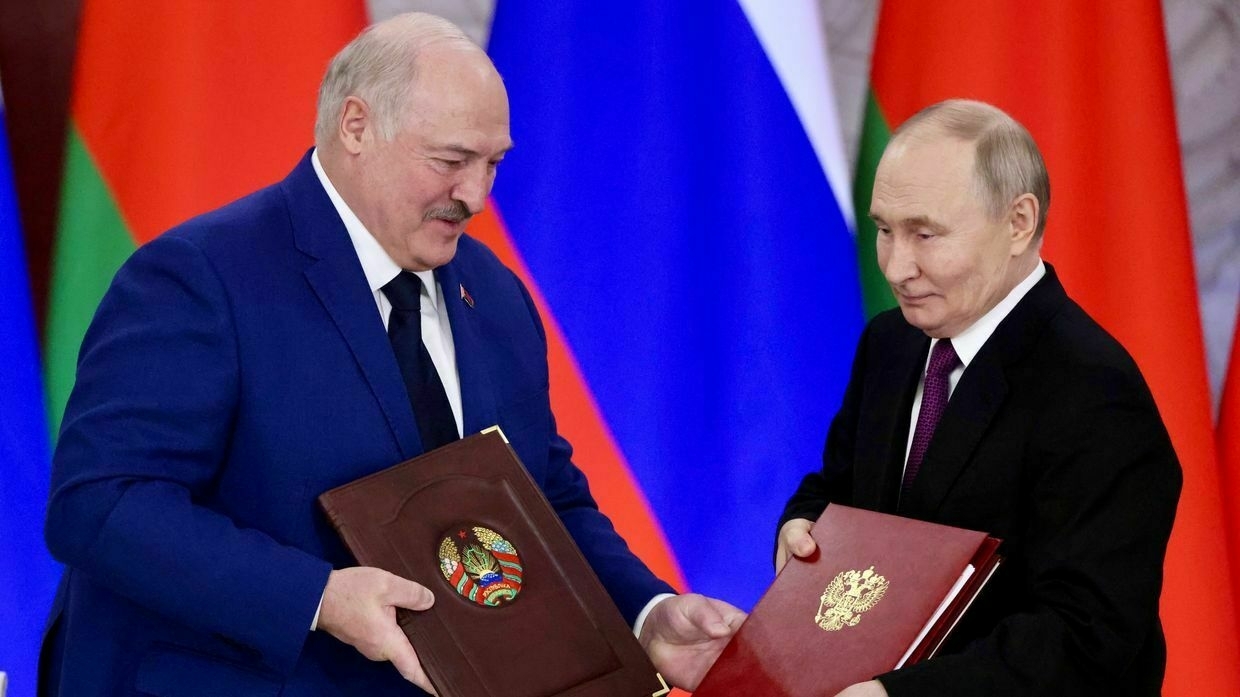
Belarus will not formally merge with Russia in the near future, Belarusian dictator Alexander Lukashenko said on March 14 while addressing the Russian Federation Council.
“If we are going to burst through this open door, we will ruin everything we have done. It is necessary to go calmly, step by step,” Lukashenko said.
In early January, independent Russian media Meduza reported, citing sources close to the Kremlin, that Putin may revisit plans to formally absorb Belarus once the war against Ukraine is resolved.
Despite his claim of maintaining relations with a range og global actors including China, the Shanghai Cooperation Organization, and the EU, Lukashenko said that Minsk will “always side with Moscow."
“It can’t be otherwise. Belarus will never leave Russia alone, just as Russia will never leave Belarus,” he added, highlighting what he described as “open fraternal relations” between the two countries.
Lukashenko’s visit to Russia marks his first trip since securing a seventh presidential term in an election widely denounced as a sham. On March 13, he met with Russian President Vladimir Putin.
Subscribe to the NewsletterBelarus Weekly<span data-sanitized-id="belarus-weekly-info" data-sanitized-class="belarusWeekly__info"></span> <button data-sanitized-id="belarus-weekly-subscribe-btn" data-sanitized-class="belarusWeekly__form_button"> <span data-sanitized-class="belarusWeekly__form_label">Join us</span> <path d="M4.45953 12.8114H7.90953C8.00052 12.8127 8.09085 12.7958 8.17517 12.7616C8.25949 12.7274 8.3361 12.6766 8.40044 12.6123C8.46478 12.548 8.51556 12.4714 8.54975 12.387C8.58395 12.3027 8.60088 12.2124 8.59953 12.1214C8.58173 11.9269 8.48974 11.7467 8.34265 11.6183C8.19555 11.4898 8.00465 11.4229 7.80953 11.4314H4.45953C4.27653 11.4314 4.10103 11.5041 3.97163 11.6335C3.84223 11.7629 3.76953 11.9384 3.76953 12.1214C3.76953 12.3044 3.84223 12.4799 3.97163 12.6093C4.10103 12.7387 4.27653 12.8114 4.45953 12.8114Z" fill="white"></path> <path d="M8.6 15.0114C8.60135 14.9204 8.58442 14.83 8.55022 14.7457C8.51603 14.6614 8.46525 14.5848 8.40091 14.5205C8.33656 14.4561 8.25996 14.4053 8.17564 14.3711C8.09131 14.3369 8.00098 14.32 7.91 14.3214H2.69C2.507 14.3214 2.3315 14.3941 2.2021 14.5235C2.0727 14.6529 2 14.8284 2 15.0114C2 15.1944 2.0727 15.3699 2.2021 15.4993C2.3315 15.6287 2.507 15.7014 2.69 15.7014H7.81C8.00511 15.7099 8.19602 15.643 8.34311 15.5145C8.49021 15.386 8.5822 15.2058 8.6 15.0114Z" fill="white"></path> <path d="M24.4202 6.01122H7.55022C7.43403 5.99626 7.31641 5.99626 7.20022 6.01122L7.08022 6.06122C6.85578 6.16602 6.66595 6.33276 6.53308 6.54181C6.4002 6.75086 6.32982 6.99352 6.33022 7.24122C6.32744 7.43266 6.36832 7.62222 6.44976 7.79549C6.5312 7.96876 6.65105 8.1212 6.80022 8.24122L12.5802 13.4512L6.89022 18.7112C6.71923 18.8375 6.57973 19.0016 6.4826 19.1907C6.38546 19.3797 6.33331 19.5887 6.33022 19.8012C6.32652 20.0535 6.3952 20.3015 6.52812 20.516C6.66105 20.7304 6.85264 20.9023 7.08022 21.0112C7.14691 21.0484 7.21729 21.0786 7.29022 21.1012C7.46476 21.1609 7.64625 21.1979 7.83022 21.2112H24.5102C24.8263 21.2048 25.1378 21.1355 25.4268 21.0074C25.7158 20.8792 25.9763 20.6948 26.1932 20.4648C26.4101 20.2349 26.579 19.9641 26.6901 19.6681C26.8012 19.3722 26.8522 19.0571 26.8402 18.7412V8.47122C26.8278 7.82952 26.5701 7.21694 26.12 6.7594C25.6699 6.30185 25.0616 6.03412 24.4202 6.01122ZM8.57022 8.08122L7.92022 7.49122H24.4202L16.4902 14.6812C16.407 14.7305 16.312 14.7565 16.2152 14.7565C16.1185 14.7565 16.0235 14.7305 15.9402 14.6812L8.57022 8.08122ZM7.73022 19.7912L8.48022 19.1112L13.4802 14.5812L14.8802 15.8612C15.1804 16.157 15.5793 16.3315 16.0002 16.3512C16.4212 16.3315 16.82 16.157 17.1202 15.8612L18.5202 14.5812L24.2002 19.8012H7.73022V19.7912ZM25.3502 18.7112L19.6602 13.5912L25.3502 8.37122V18.7112Z" fill="white"></path> </button> </div>Following their talks, Lukashenko and Putin signed a joint statement pledging to expand bilateral trade, economic, and investment cooperation.
Belarus has been largely cut off from the West following Lukashenko's violent crackdown on mass protests in 2020 against fraudulent election results.
Since then, his regime has further curtailed political freedoms and deepened its alignment with Moscow, providing logistical and military support for Russia's war against Ukraine.
Even before launching its full-scale invasion of Ukraine, the Kremlin reportedly had devised a plan for the "creeping annexation" of Belarus by 2030.
The plan outlined steps for "harmonizing" Russian and Belarusian laws, "coordinated foreign and defense policy," and economic integration based on Russian interests.
President Volodymyr Zelensky claimed on Feb. 14 that Russia is once again building up troops in Belarus, possibly in preparation for large-scale operations against NATO countries.
Putin sent ‘additional signals’ to Trump on ceasefire proposal, Kremlin saysTrump’s special envoy Steve Witkoff met with Putin late in the evening on March 13, Kremlin spokesperson Dmitry Peskov said.The Kyiv IndependentTim Zadorozhnyy
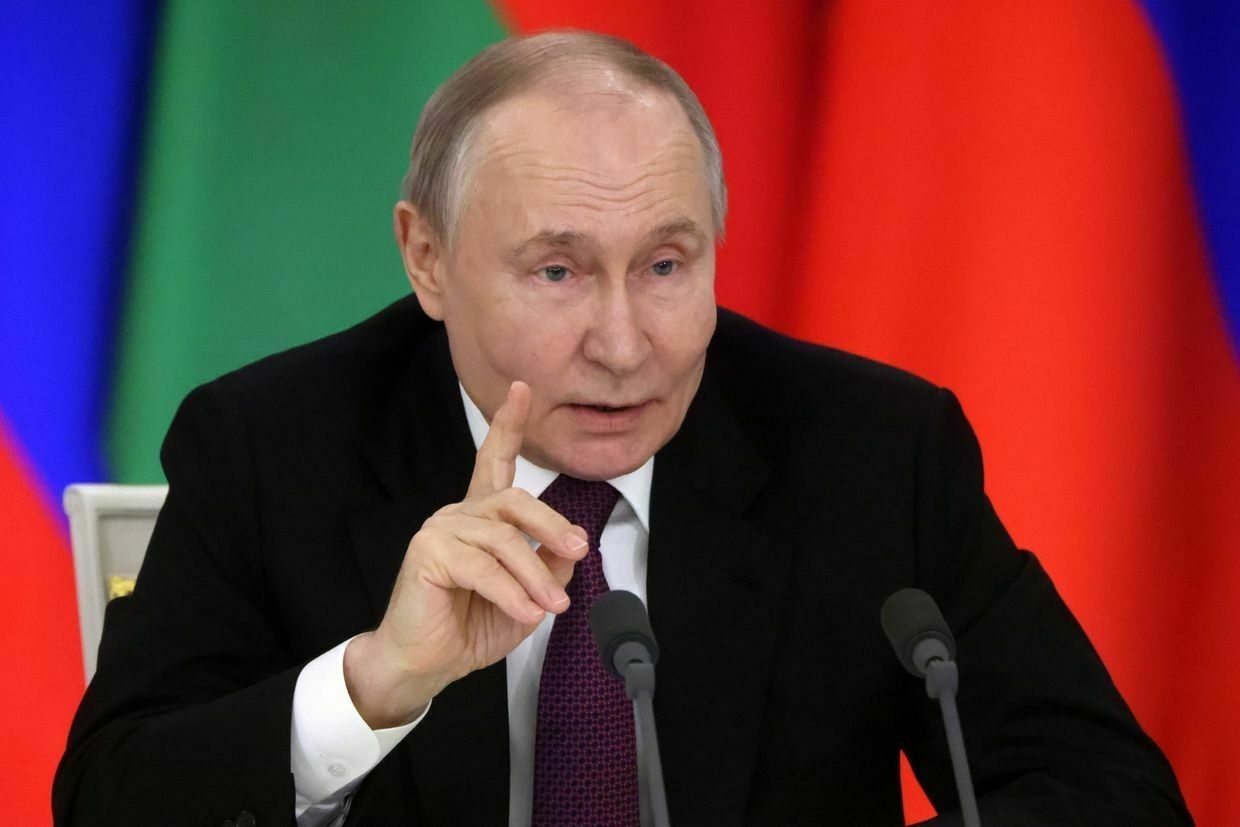
ECHR rules Ukraine failed to prevent, investigate violence in Odesa in 2014
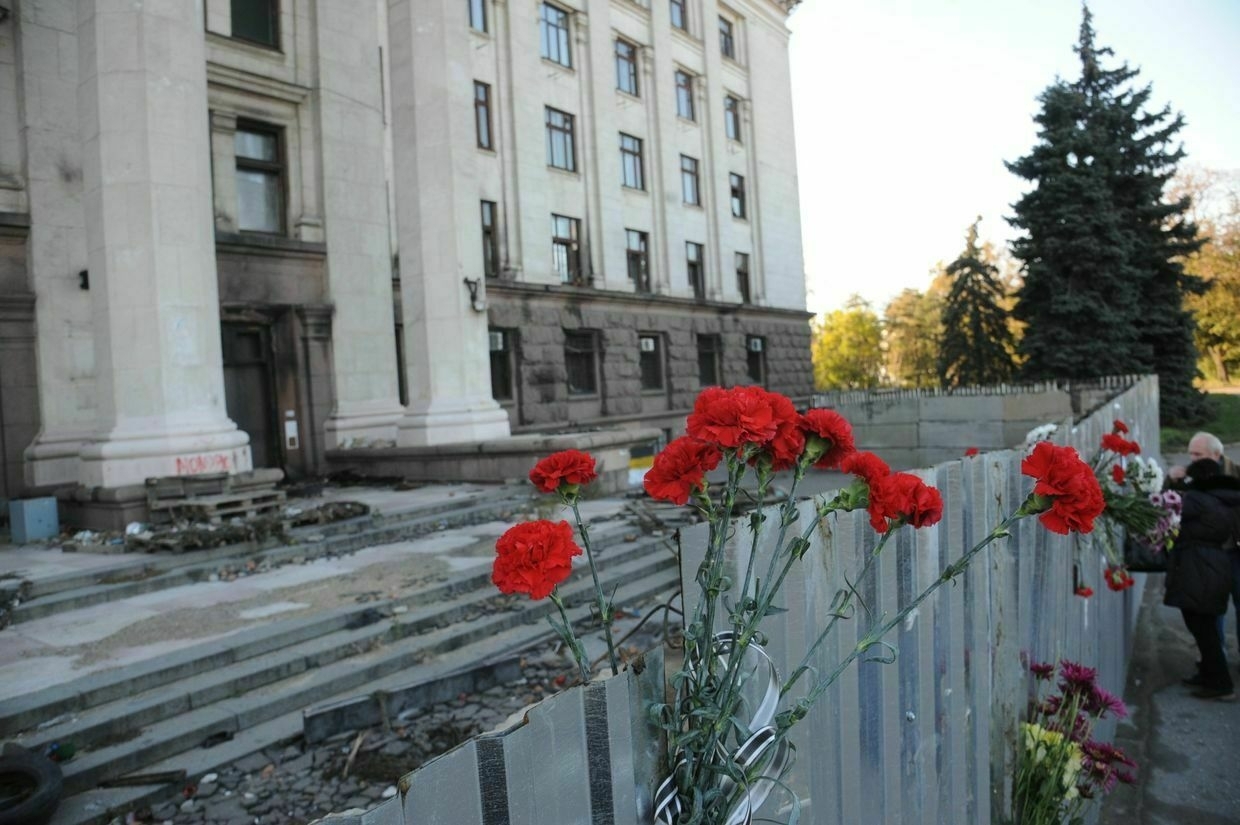
The European Court of Human Rights (ECHR) ruled on March 13 that the Ukrainian government failed to prevent and adequately investigate deadly clashes between the EuroMaidan supporters and opponents in Odesa in May 2014.
The ruling concerns seven applications filed by 28 individuals — 25 relatives of the victims and three survivors — between 2016 and 2018.
Forty-eight people died in the violence that erupted between the two camps on May 2, 2014. A group of pro-Russian activists attacked a pro-EuroMaidan rally but retreated to the Trade Unions House after the ensuing violence.
Forty-two of the EuroMaidan opponents died after the building caught fire as the two groups began throwing petrol bombs. Two pro-Ukrainian activists were also killed after suffering gunshot wounds.
The ruling noted “authorities’ failure to do everything that could reasonably be expected of them to prevent the violence in Odesa on 2 May 2014, to stop that violence after its outbreak, to ensure timely rescue measures for people trapped in the fire, and to institute and conduct an effective investigation into the events."
The ECHR noted that Russian propaganda helped to instigate the clashes but acknowledged the applicants' complaints that Ukraine failed to prevent the violence and adequately investigate it. The Ukrainian state was ordered to pay out compensations.
The plaintiffs included relatives of victims from both camps, all of whom accused the Ukrainian state of inaction.
Russian propaganda has heavily employed the violent episode in Odesa to vilify the EuroMaidan Revolution and falsely paint the movement as pro-Nazi and extremist.
The EuroMaidan Revolution began in November 2013 when people gathered at Maidan Nezalezhnosti, Kyiv’s central square, to protest pro-Kremlin President Viktor Yanukovych’s refusal to sign the long-awaited Association Agreement with the European Union.
Law enforcement officers, namely Berkut riot police, used violence to suppress the protests, including lethal force. More than 100 people were killed during the revolution, which culminated in Yanukovych fleeing to Russia.
“The Court noted that distortion of the events in Odesa had eventually become a tool of Russian propaganda in respect of the war waged by the Russian Federation against Ukraine since February 2022,” the ECHR’s ruling said.
“Enhanced transparency in the related investigative work by the Ukrainian authorities might have helped to prevent or counteract that propaganda effectively."
The court noted that the investigation should have been “carried out by an organ entirely independent from the police.” At the same time, the ECHR dismissed allegations that the authorities were not impartial when investigating the deaths of EuroMaidan opponents and supporters.
EuroMaidan RevolutionThe EuroMaidan Revolution is often credited with being the single most consequential event in Ukraine’s modern history. After pro-Kremlin President Viktor Yanukovych took power in 2010, the political and business landscape in Ukraine was gradually deteriorating. In November 2013, Yanukovych refuse…The Kyiv IndependentAlisa Sobolieva
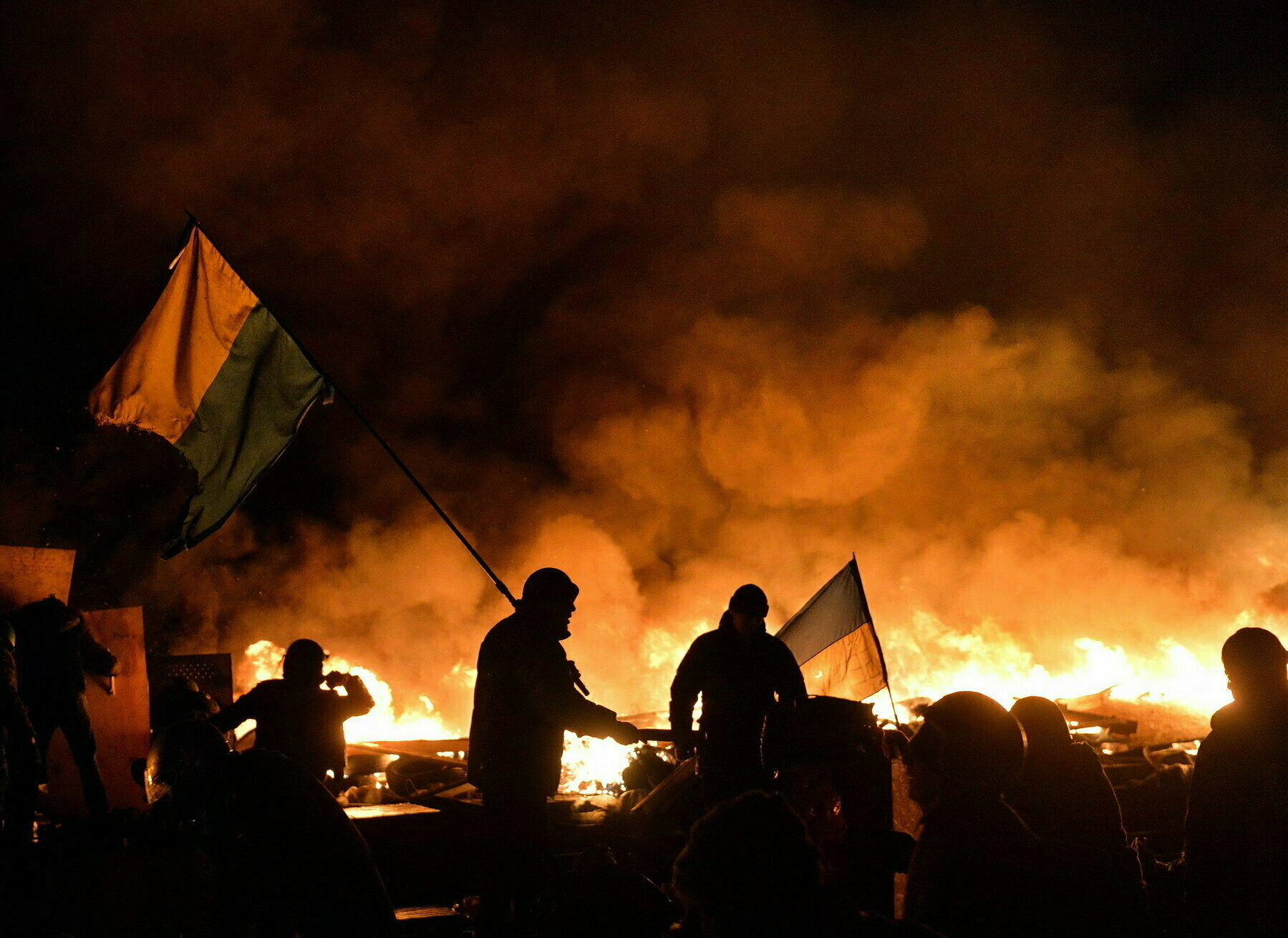
Slovakia’s protests prove the fight for Europe isn’t over
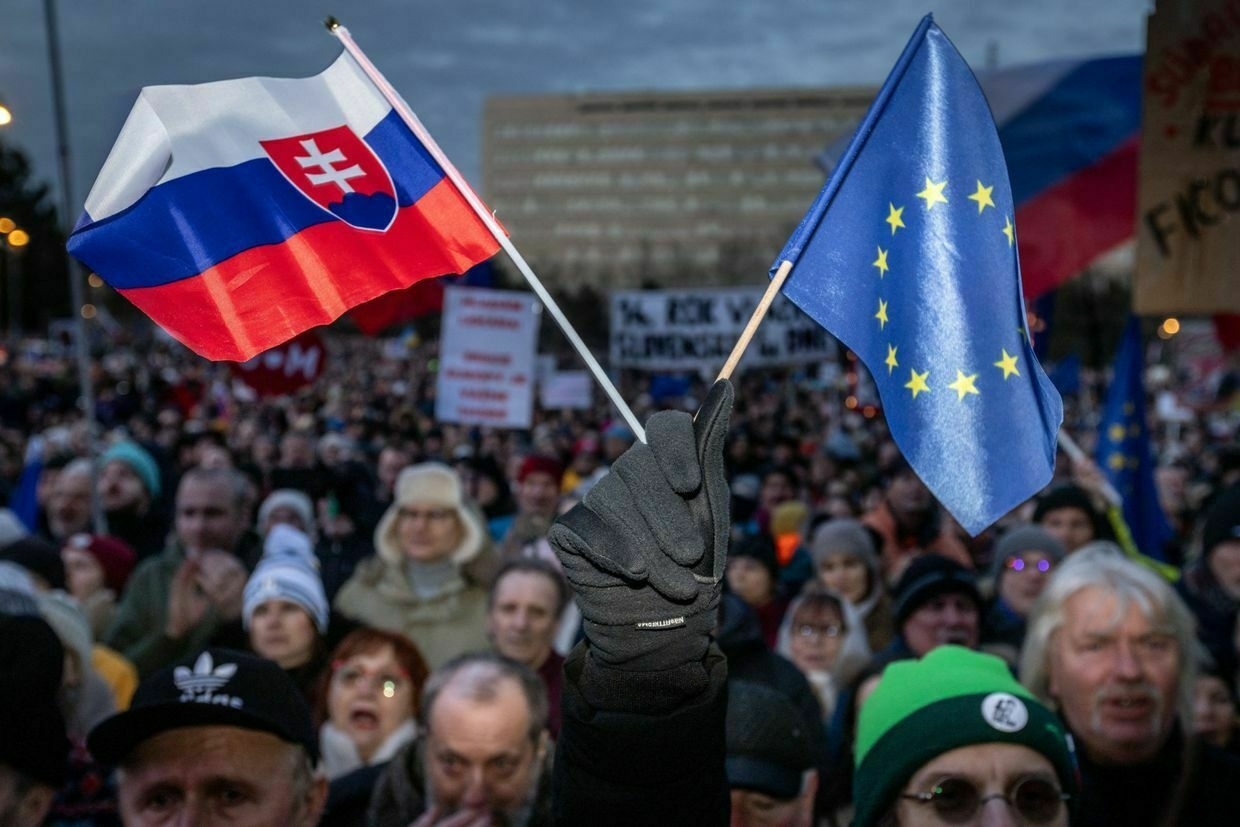
On March 7, tens of thousands of people took to the streets across Slovakia for the third time this year to protest the pro-Russian policies of Slovakian Prime Minister Robert Fico’s government. They voiced concerns that Slovakia is drifting away from the European Union and its transatlantic allies.
Their fears are well-founded. Since autumn 2023, a coalition of nationalist, EU-skeptic, and pro-Russian parties has held power in Bratislava. While Fico’s left-wing Smer party pushes pro-Russian rhetoric, the Slovak National Party (SNS) promotes a “pan-Slavic brotherhood” with Moscow. The result is the same: under Fico, Slovakia is moving in a direction similar to Viktor Orbán’s Hungary.
Fico’s government has demonstrated a clear alignment with Moscow. In September 2024, he falsely claimed that Nazi troops were fighting in Ukraine. He was also the first prime minister of an EU member state to grant an interview to the Russian state television channel Rossiya 1.
In October 2024, Ľuboš Blaha, a European Parliament member of Fico’s Smer, traveled to Moscow to “apologize to the Russians for EU sanctions,” provocatively stating, “fascism and war come from the West, while freedom and peace come from the East.”
Fico met with Russian President Vladimir Putin in Moscow in December 2024, and he had already accepted Putin’s invitation to travel to Moscow in May 2025. In January 2025, a delegation from SNS also visited Moscow, where party chairman Andrej Danko called Putin “a very reasonable and pragmatic leader.”
Concerned about the government’s pro-Russian stance, the liberal opposition party Freedom and Solidarity (SaS) proposed enshrining Slovakia’s EU membership in the constitution. The response from Fico’s camp was both surprising and alarming: Tibor Gašpar, a former police chief indicted for criminal activity and now a Smer politician, suggested that Slovakia should consider leaving the EU if its rules were to change. Even President Peter Pellegrini, from the coalition partner Hlas, distanced himself from Gašpar’s remarks.
While a Slovak exit from the EU may still seem unlikely, many citizens are deeply unsettled by the government’s direction. This frustration has fueled mass protests, where demonstrators wave Ukrainian flags and rally under the slogan “Peace for Ukraine.”
Fico, however, has responded with conspiracy theories. When his government faced a no-confidence vote in January 2025 — after losing several MPs and potentially its parliamentary majority — he called for a closed session, claiming Slovakia’s intelligence service (led by the son of Tibor Gašpar) had warned him of an attempted coup.
According to Fico, NGOs active in Ukraine and Georgia were plotting to overthrow him — a claim with no evidence, but one that echoed the rhetoric of Viktor Orbán in Hungary. Around the same time, Orbán himself visited Bratislava, further strengthening ties between the two leaders. In the end, Fico managed to block the no-confidence vote, despite his government’s fragile majority.
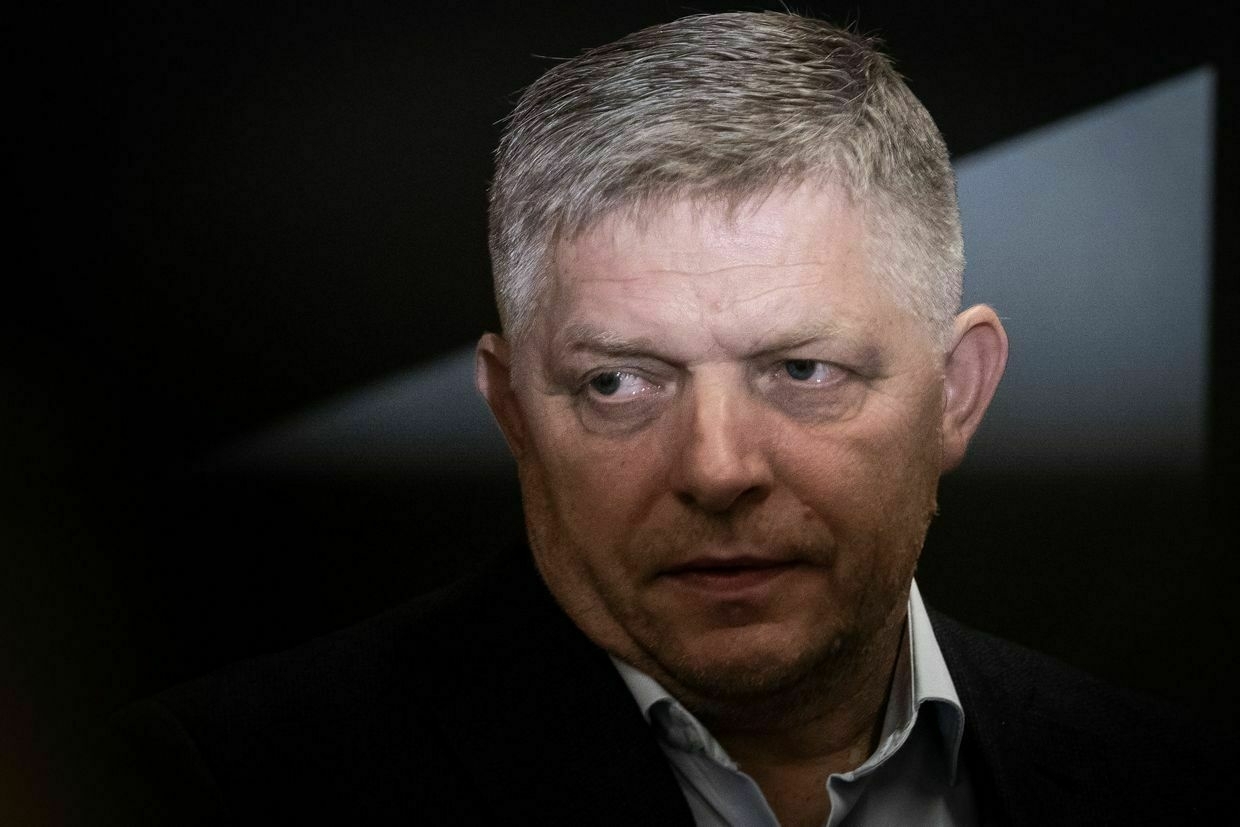
Slovakian Prime Minister Robert Fico in Bratislava, Slovakia, on Oct. 1, 2023. (Vladimir Simicek/AFP via Getty Images) Fico’s Orbán-like approach extends beyond foreign policy into domestic affairs. Ironically, Fico — who pursued anti-Hungarian minority policies in his first term (2006–2010) — has now become a close ally of Orbán. Even Slovakia’s Hungarian minority party aligns with Fico’s anti-Ukrainian, pro-Russian stance.
Like Orbán, Fico has worked to weaken democratic checks and balances — amending criminal law in his interests, restructuring public media to silence critical journalists, and allowing SNS’s nationalist culture minister to wage a political war against artists (theater and museum directors have been dismissed and replaced with loyalists).
Despite these troubling developments, Slovakia under Fico remains freer and more pluralistic than Orbán’s Hungary. The key difference is stability: Orbán has ruled since 2010 with a strong parliamentary majority, whereas Fico’s coalition is fragile and divided. Some MPs from his smaller coalition partners, SNS and Hlas, have already left the government, though they have not yet voted against him.
Fico’s pro-Russian stance has so far been more of a rhetorical tool for domestic politics. Unlike Orbán, he ultimately did not block the EU’s decision on Ukraine in early March, as he hopes the European Union will secure gas supplies for Slovakia.
Fico’s pragmatism can also be explained by the fact that a fully pro-Russian foreign policy and a boycott strategy at the European level would not even be entirely supported within his own coalition — particularly by the Hlas party of President Peter Pellegrini. At the same time, the issue of Ukraine — again in contrast to Hungary — is a key mobilising force for the Slovak opposition. While the Hungarian opposition avoids open and direct confrontation with Orbán on this matter out of opportunism, tens of thousands of people take to the streets in Slovakia to demonstrate in support of Ukraine and against Fico’s pro-Russian policies.
Political instability and mounting public resistance continue to pressure Fico. On the streets of Slovak cities, the Ukrainian flag has become a symbol of pro-European commitment for many. They are not “foreign agents,” as Fico claims, but decent citizens of Slovakia who want to avoid the Orbánization of their country.
Editor’s Note: The opinions expressed in the op-ed section are those of the authors and do not necessarily reflect the views of the Kyiv Independent.
US set to abandon partners again as history repeats in UkraineParis in January 1973. Doha in February 2000. Saudi Arabia in February 2025 — all peacemaking summits with the same aroma and feel. But there are key differences before we assume the stage is simply being set for another American episode of “cut and run.” After years of promising never toThe Kyiv IndependentEerik Kross
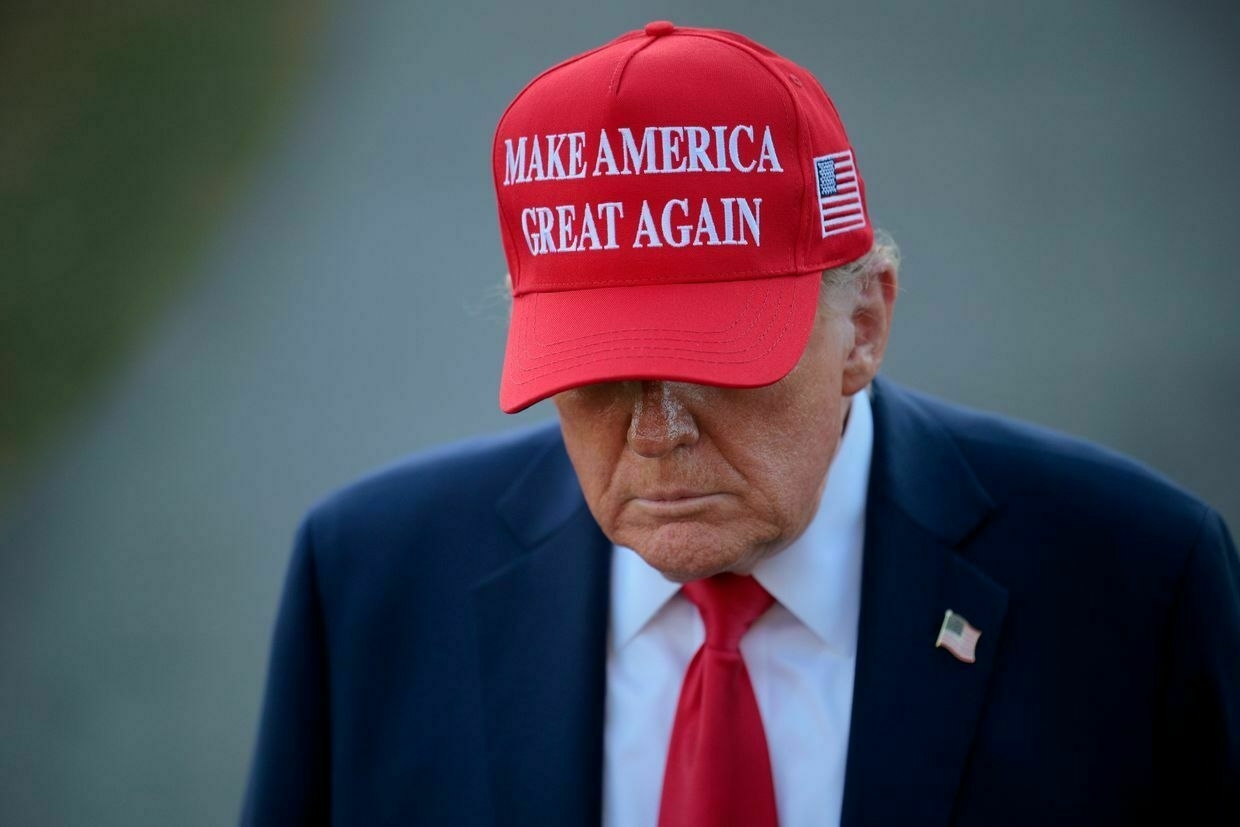
Georgia's ex-President Saakashvili sentenced to 9 more years in prison on embezzlement charges
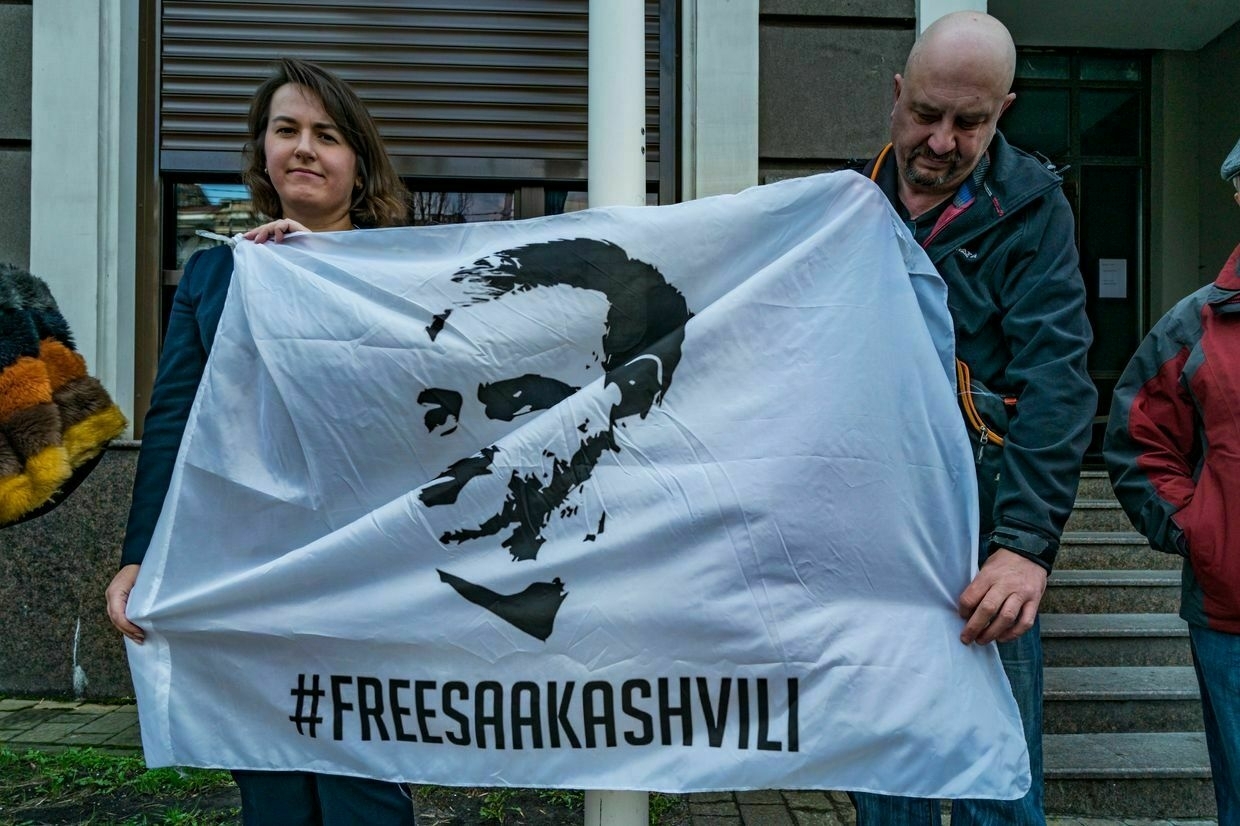
Former Georgian President Mikheil Saakashvili has been sentenced to an additional nine years in prison for an alleged large-scale embezzlement of state funds, the Tbilisi City Court ruled, as Radio Free Europe/Radio Liberty’s Georgian service reported on March 12.
Judge Badri Kochlamazashvili found Saakashvili guilty of misappropriating 9 million lari (about $5.4 million at the time) from the state budget between May 2009 and February 2013 for personal expenses, including luxury hotels, cosmetic procedures, and designer clothing.
Teimuraz Janashia, former head of the Special Guard Service, was also convicted in the case and fined 300,000 Georgian lari ($108,000) for abuse of office. Both men denied the charges, calling the trial politically motivated.
Saakashvili, Georgia’s president between 2004-2007 and 2008-2013, sought to take his country on a pro-Western path but lost elections to the Moscow-friendly Georgian Dream party a few years after the defeat in the Russia-Georgia war in 2008.
The politician was detained upon returning to Georgia in 2021 and is currently serving six years in prison on charges of ordering the beating of opposition lawmaker Valery Gelashvili in 2005. He was also given a three-year sentence for abuse of power charges for pardoning four police officers convicted of murder in 2008.
The former president, a longtime critic of Russian President Vladimir Putin, has accused oligrach Bidzina Ivanishvili, the honorary chairman of the Georgian Dream party, of orchestrating his prosecution on Moscow’s orders.
The European Court of Human Rights (ECHR) ruled on May 23 that there were no grounds to believe that Saakashvili’s criminal proceedings were unfair.
In February 2023, President Volodymyr Zelensky said the Georgian government was “killing” Saakashvili after photos surfaced showing his deteriorating health and significant weight loss. Saakashvili holds Ukrainian citizenship and served as the governor of Odesa Oblast between 2015 and 2016.
The ruling follows mass protests in Tbilisi over the disputed October election results, which saw the Kremlin-friendly Georgian Dream party retain power.
Since the election, a number of Western countries have imposed sanctions on Georgia over the perceived democratic backsliding.
The political crisis deepened after Prime Minister Irakli Kobakhidze announced that Georgia’s EU integration could be delayed until 2028.
Despite Russian-backed Georgescu barred from presidential race, Romania’s far-right still aim to winProtests erupted in downtown Bucharest following the Central Electoral Bureau’s decision to ban Russian-backed far-right politician Calin Georgescu from running in the upcoming re-run presidential elections. Georgescu, who is openly supported by the Russian and the U.S. administrations, said this w…The Kyiv IndependentPaula Erizanu
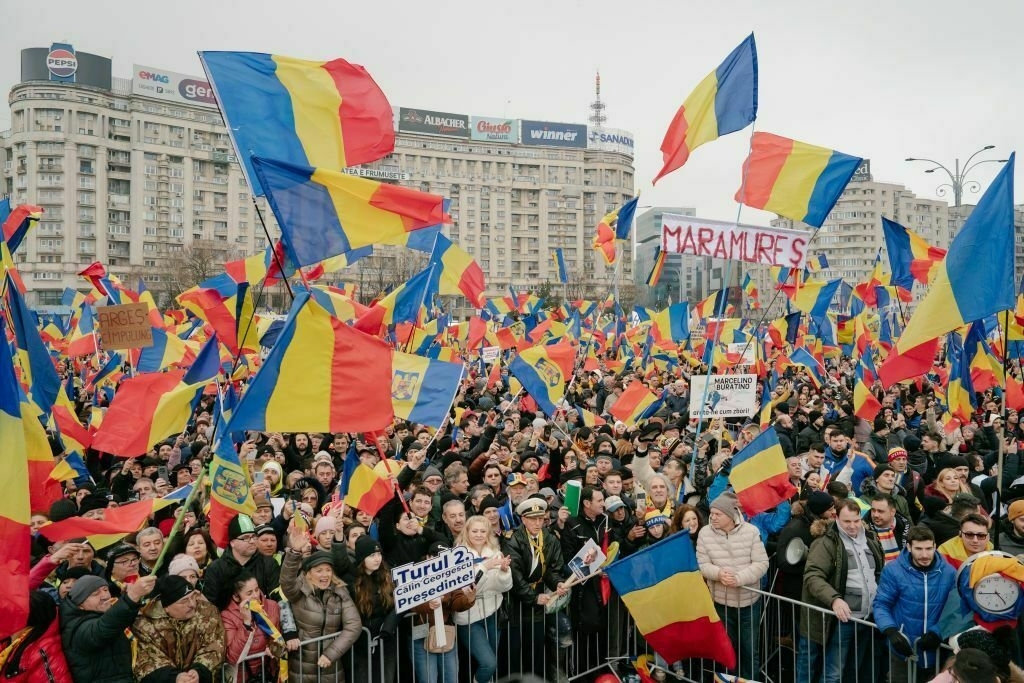
Despite Russian-backed Georgescu barred from presidential race, Romania's far-right still aim to win
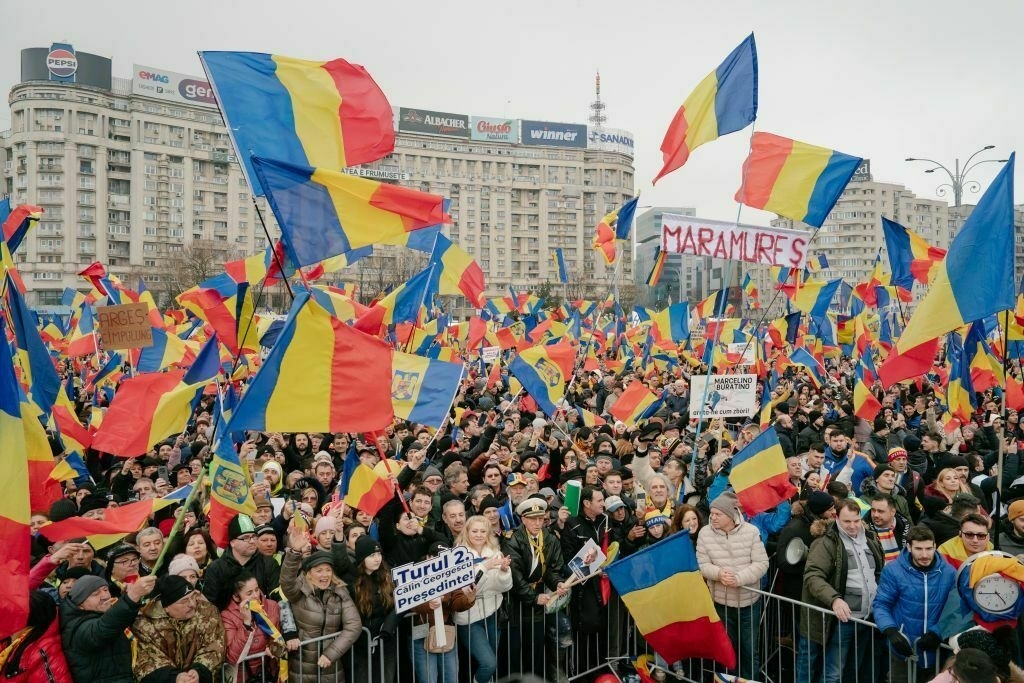
Protests erupted in downtown Bucharest following the Central Electoral Bureau’s decision to ban Russian-backed far-right politician Calin Georgescu from running in the upcoming re-run presidential elections.
Georgescu, who is openly supported by the Russian and the U.S. administrations, said this was a “direct hit against democracy."
Following the announcement on March 9, Georgescu’s supporters began setting the streets of Bucharest on fire and throwing bottles, stones, and firecrackers at the police. Riot police used tear gas in response.
In November 2024, the relatively unknown Georgescu surprisingly won the first round of the vote. The result was promptly annulled, citing foreign interference in the election process. In connection to the case, Romania expelled the Russian military attache and his deputy for breaching diplomatic rules of conduct.
Now, the Central Electoral Bureau cited technical irregularities in Georgescu’s application, as well as the Constitutional Court’s decisions to cancel the previous round of voting and ban another Russian-backed candidate, Diana Sosoaca.
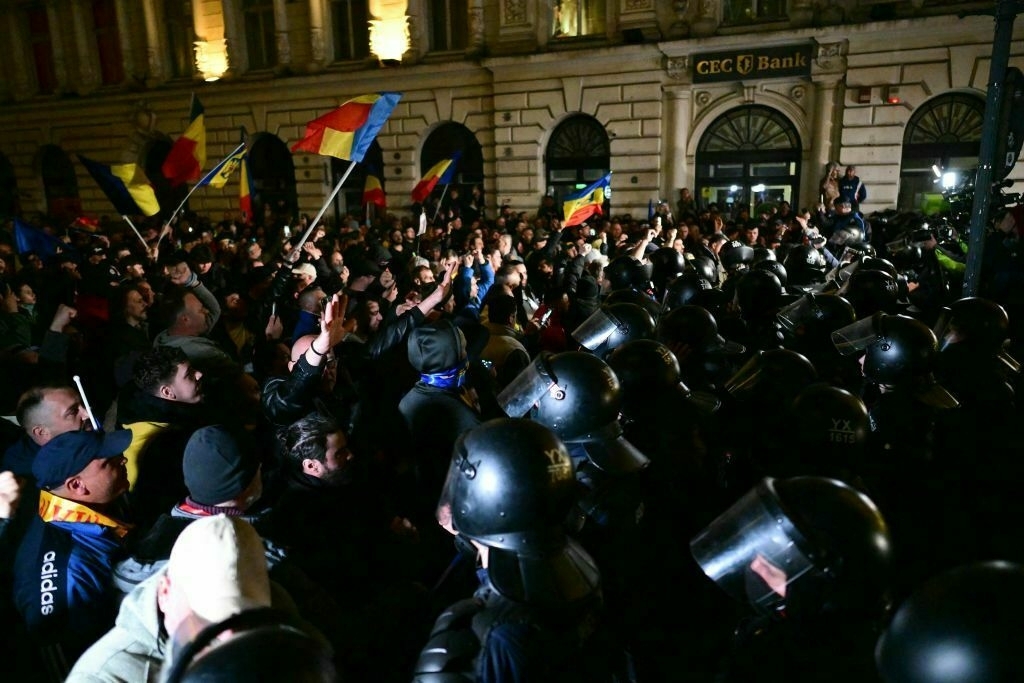
Supporters of far-right presidential candidate Calin Georgescu wave the Romanian flag as they face Romanian gendarmes during a protest near the Central Electoral Bureau in Bucharest on March 9, 2025, after the electoral bureau rejected Georgescu’s candidacy for the re-run of last year’s annulled presidential election. (Daniel Mihailescu/AFP via Getty Images) Georgescu said he would appeal, and the Constitutional Court will have the final say on his expulsion from the race.
“The decision was inevitable for the health of democracy, but this democracy will need deep repairs after elections in May,” journalist Magda Gradinaru told Kyiv Independent.
“Romania’s secret services failed in the final goal of preventing this crisis and they will need to be reformed (as well),” she added.
“It is to be seen who will capitalize on Georgescu’s electoral ban and to what extent social tensions can morph into violent social movements,” said Gradinaru.
“This was a short-term solution, but the extremist populist platform remains, as does Russian pressure, social resentment, and tension. So this may just be the beginning of a crisis that Romania will have to manage in a complicated geopolitical context,” she added.
‘We’re ready’ — Ukraine heads into US peace talks with everything at stakeKyiv officials will meet their Washington counterparts in Jeddah on March 11 for talks which will impact the future of diplomatic relations between the two countries and likely the future of the war in Ukraine. The Ukrainian side hopes the meeting would help mend ties with the White House andThe Kyiv IndependentChris York
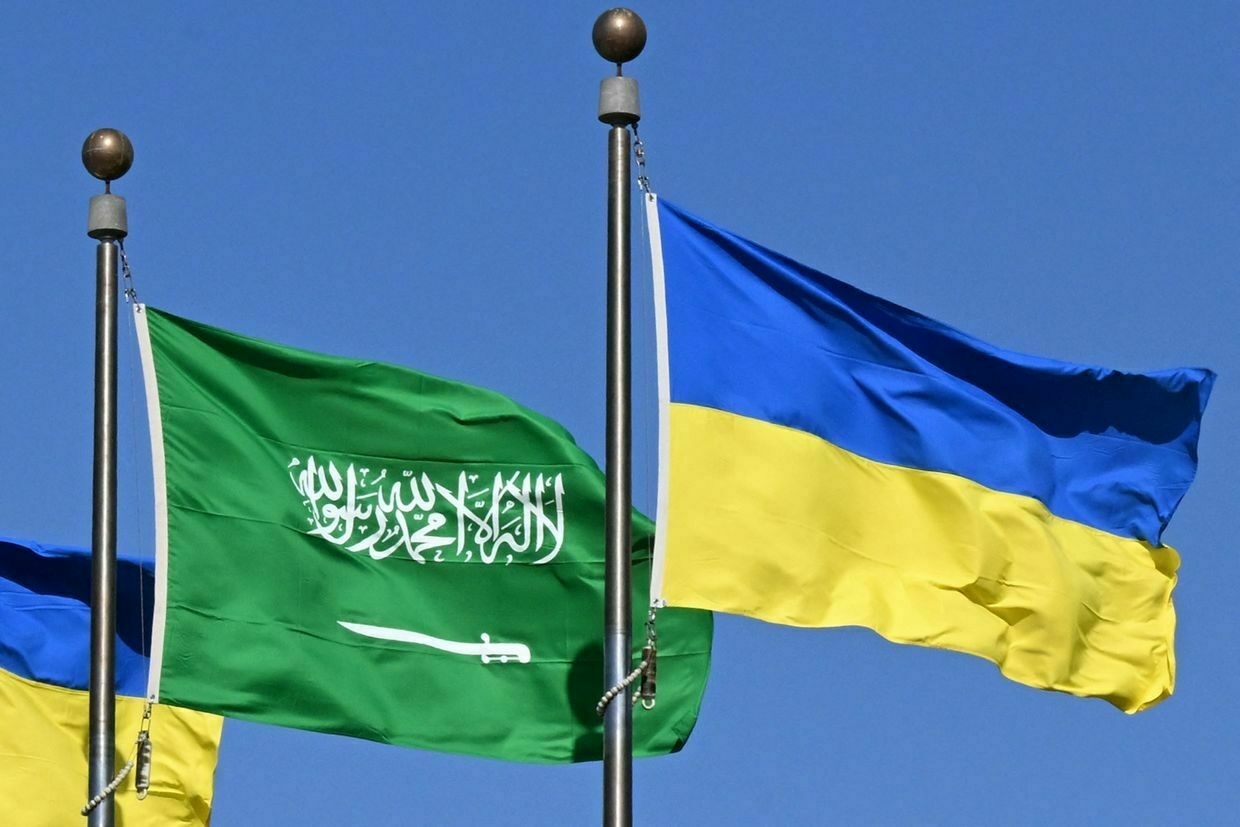
Far-right uprisingThe leader of the far-right Alliance for the Union of Romanians (AUR) party, George Simion, said on Sunday evening that “those who organized the ‘coup’ should be skinned alive in the public square."
He called on people to take part in protests in support of Georgescu.
On Monday morning, Simion claimed his words were a “metaphor,” and he asked supporters to protest peacefully. Georgescu appeared publicly, holding hands with Simion and Anamaria Gavrila, the leader of another Romanian far-right project, Party of Young People (POT).
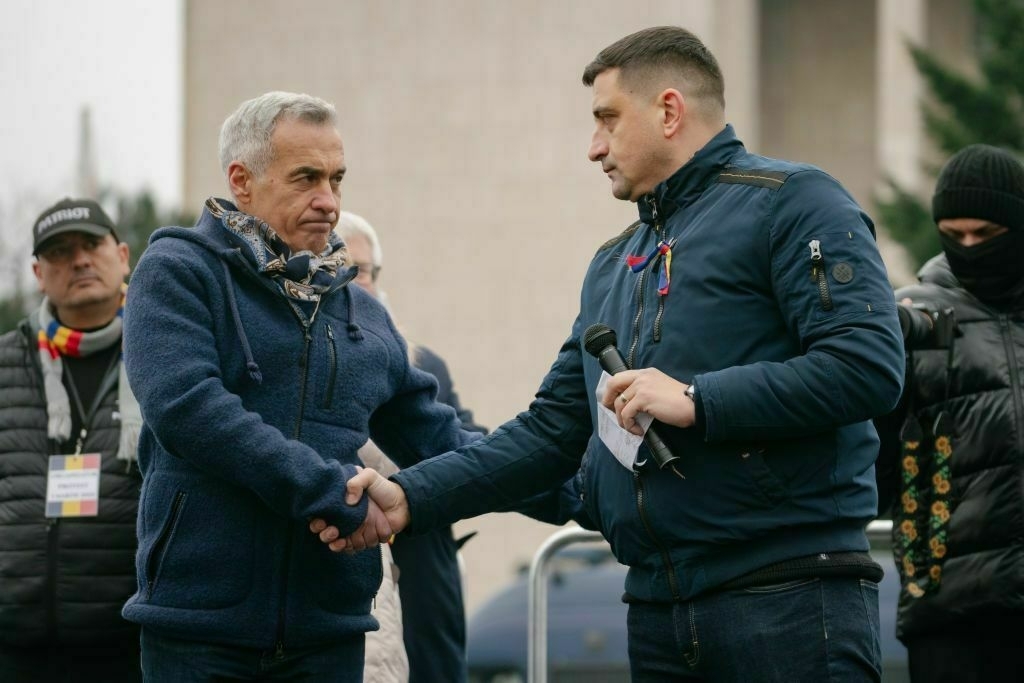
The leader of the far-right party AUR, George Simion (right) shakes hands with former presidential candidate Calin Georgescu (left) during an anti-government rally on March 1, 2025 in Bucharest, Romania. (Andrei Pungovschi/Getty Images) Georgescu was expelled from AUR in 2022 after being briefly investigated for declarations in support of Romania’s World War II fascist leaders. Now, Georgescu relies on AUR and POT for support.
In the December parliamentary elections, AUR secured second place with 18% of the vote, while POT gained 6.5%. Both remained in opposition.
“If Simion runs for president, some of the tension created by Georgescu’s ban will be eliminated,” analyst Oana Popescu Zamfir told Kyiv Independent.
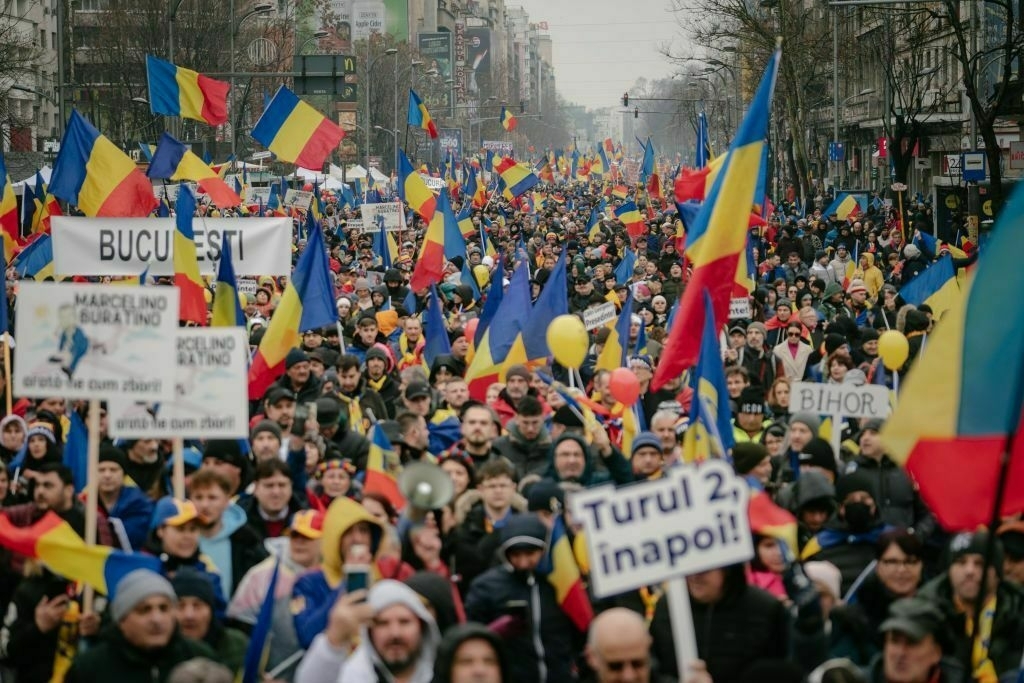
Romanian protesters take part in an anti-government rally on March 1, 2025 in Bucharest, Romania. Calin Georgescu, a pro-Russian candidate who won the first round of last year’s election that was subsequently cancelled, was questioned by prosecutors earlier this week about the financing of his campaign. (Andrei Pungovschi/Getty Images) According to her, Simion’s recent radical statements are meant to incentivize Georgescu’s supporters to vote for him. “It’s important for Georgescu to explicitly support Simion,” Popescu Zamfir said.
Other candidates Georgescu’s electorate may vote for, according to Popescu Zamfir, include former Prime Minister Victor Ponta, former acting President Crin Antonescu, or businessman and politician Gigi Becali.
“If Simion does not run, whoever wins the election will have less legitimacy,” Popescu Zamfir said.
Russian attempt to dismantle institutionsThe ongoing political crisis began last year with Russian meddling in Romania’s elections and the subsequent rise of far-right politicians and their parties.
While not making it into the top five according to most opinion polls, Georgescu suddenly took first place following a two-week viral TikTok campaign that involved working with local influencers. The campaign was artificially boosted, with over 66,000 fake TikTok accounts later banned by the platform.
Georgescu has been actively promoting conspiracy theories and has been vocally supporting Russia. He called Ukraine a “fictional state” and claimed that the eventual partition of its territories is “inevitable” in an interview published on Jan. 29.
The media also found evidence of Georgescu’s links to paramilitary and fascist leaders, such as mercenary Horatiu Potra, who manages a group of soldiers in Congo.
On Dec. 8, when the presidential runoff was scheduled to take place, Potra and 20 other people were detained by the police as they were driving to Bucharest carrying weapons and cash.
On Feb. 26, the Romanian Prosecutor General’s Office charged Georgescu with “incitement to actions against the constitutional order” and other crimes in a six-count indictment. The charges also included lying about campaign funding and initiating a fascist organization.
According to law enforcement, Georgescu used over 1 million euros of undeclared funds and has been involved in neo-legionarism, a Romanian neo-fascist movement that draws its ideology from the country’s Iron Guard militant group active in the run-up to World War II.
Georgescu denied any wrongdoing.
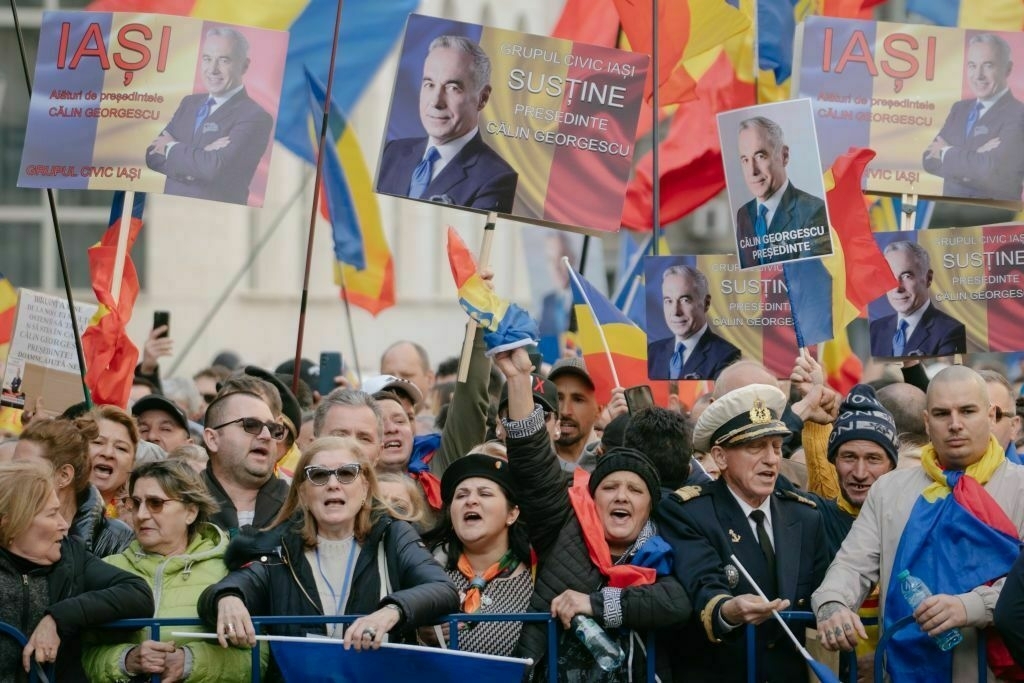
Supporters of presidential candidate Calin Georgescu cheer outside the Central Electoral Bureau on March 7, 2025 in Bucharest, Romania. (Andrei Pungovschi/Getty Images) On the same day, the Romanian police found dozens of guns, grenades, 25 kilograms of gold, $3.3 million, and 700,000 Romanian Leu ($152,500) in cash in the homes of Potra and his associates.
On March 5, Russian military attache Victor Makovskiy and his deputy, Evgeny Ignatiev, were expelled from Romania. The move was connected to Georgescu’s campaign.
The next day, six people were arrested for allegedly being part of a military organization attempting to overthrow the government with help from Russia.
“These six people are just the visible tip (of the iceberg),” analyst Armand Gosu told Kyiv Independent. “This is the first time Romania openly accuses the Russian Federation of a plot against its state sovereignty."
“They (Russians) can wait years, even decades, that’s why it’s necessary for the Romanian state to neutralize this (entire) network,” Gosu said.
According to Popescu Zamfir, “if eliminating the entire network is not possible, at least beheading these groups would avoid further existential threats."
The rise in disinformation and buildup of far-right groups was missed by the government agency set to protect the country from malicious activity from abroad — its intelligence.
Independent journalist Victor Ilie from the local investigative project Snoop published a series of articles showing how Kremlin-linked creative agencies based in London pump millions of euros to create and promote conspiracy and far-right content in the Romanian digital space.
“While Romanians have been mistrustful of Russia, what confuses a part of the Romanian public now is that the U.S., which was considered the country’s main partner, embraced the Russians, and that Georgescu claims that he is not pro-Russian, but pro-American, pro-Trump,” Gosu said.
“It’s very hard to explain that the Americans are not what they once were,” he added. “Now Romania is seen as the EU’s weak link that can easily be broken."
Investigation: We tried to buy American chips as a Russian defense manufacturer — and it workedDespite bans put in place by the U.S. and Europe on the supply of electronic components to Russia, dozens of Russian microelectronics suppliers continue to obtain and resell imported chips to Russian arms manufacturers successfully. Without these Western chips, Russia would not be able to produce k…The Kyiv IndependentAlisa Yurchenko
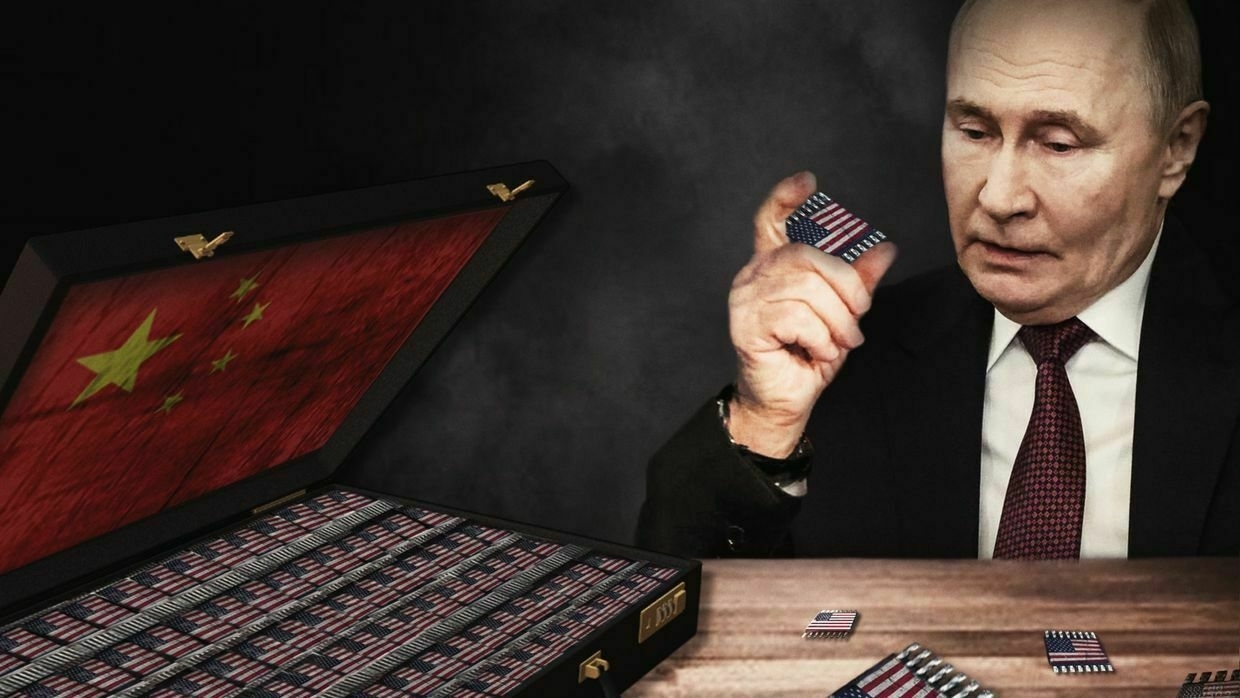
A glimmer of hopeHowever, swift action against Georgescu and his associates showed that Romanian authorities were still eager to fight back.
The crisis had also catapulted some new faces that are now set to challenge the far-right at the ballot, among them acting President Ilie Bolojan and Bucharest Mayor Nicusor Dan, who are gaining popularity.
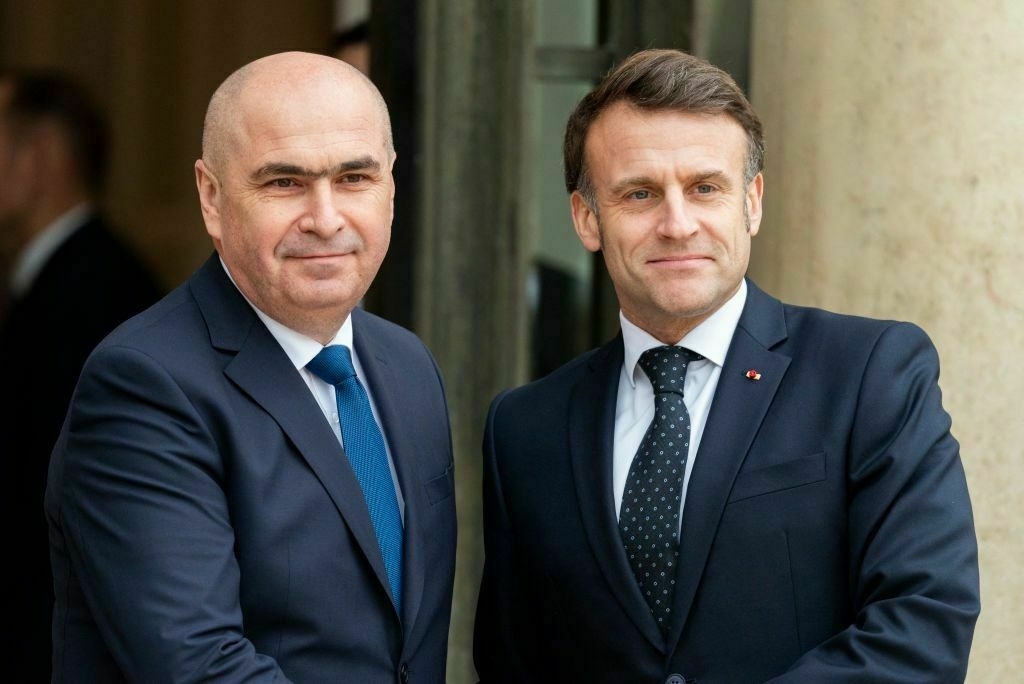
French President Emmanuel Macron welcomes Romania s acting President Ilie Bolojan at the Elysee presidential Palace in Paris on Feb. 19, 2025, after a meeting with seven European countries, focused on Ukraine. (Photo by Magali Cohen/Hans Lucas/AFP via Getty Images) “Acting President Ilie Bolojan has done some damage control — organizing press conferences, which journalists missed, meeting up European leaders in a period when Romania seemed to be quarantined, transmitting key messages — has given the feeling that there is a clear political direction for the country and it has been a good move,” said Gosu.
"(Bolojan and Dan) can re-legitimize institutions and the democratic process,” said Gradinaru.
Lukashenko appoints Alexander Turchin as Belarus's new PM
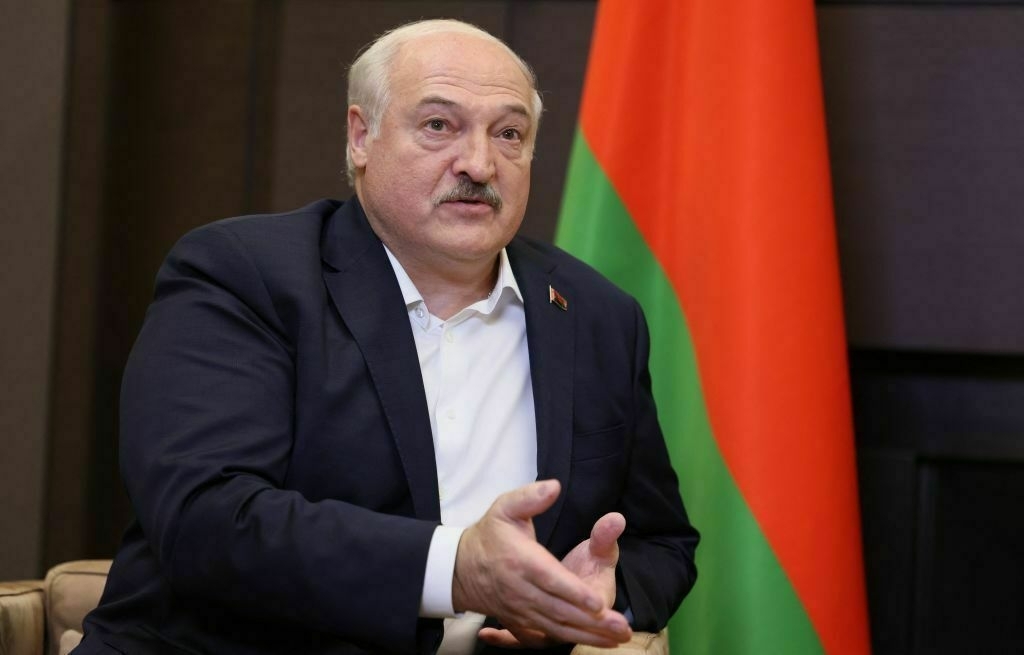
Belarusian dictator Alexander Lukashenko has appointed Alexander Turchin as the country’s new prime minister, state-owned news agency Belta reported on March 10.
Turchin, who previously served as head of the Minsk regional executive committee, held key government positions, including chief of staff of the Council of Ministers in 2016 and first deputy prime minister in 2018-2019.
After his appointment, Turchin told reporters that Belarus would not see any “significant course correction,” adding that his approach would be one of “evolution without revolutions."
Turchin is replacing Roman Golovchenko, who has held the office of prime minister since June 2020 and was now appointed head of the National Bank. Lukashenko presented the personnel changes as the advent of a “new generation” in Belarusian leadership.
Lukashenko, in power since 1994 and widely regarded as Russian President Vladimir Putin’s close ally, has faced repeated accusations of election fraud.
His self-declared victory in the 2020 presidential election, widely denounced as illegitimate, triggered mass protests in Minsk that were brutally suppressed with Moscow’s backing.
Since then, over 8,000 people have been detained for political reasons, according to the Belarusian human rights group Viasna.
On Jan. 26, Lukashenko claimed a seventh term in office in another election widely condemned as neither free nor fair.
Though Belarus has not directly participated in Russia’s war against Ukraine, it has allowed the Kremlin to use its territory as a staging ground for military operations.
Russia’s arms exports plunge by 47% since full-scale invasion’s start, SIPRI reportsThe decline is attributed to Russia prioritizing weapons production for its own military, the impact of Western sanctions, and increased pressure from the U.S. and its allies on countries purchasing Russian arms, the report said.The Kyiv IndependentTim Zadorozhnyy
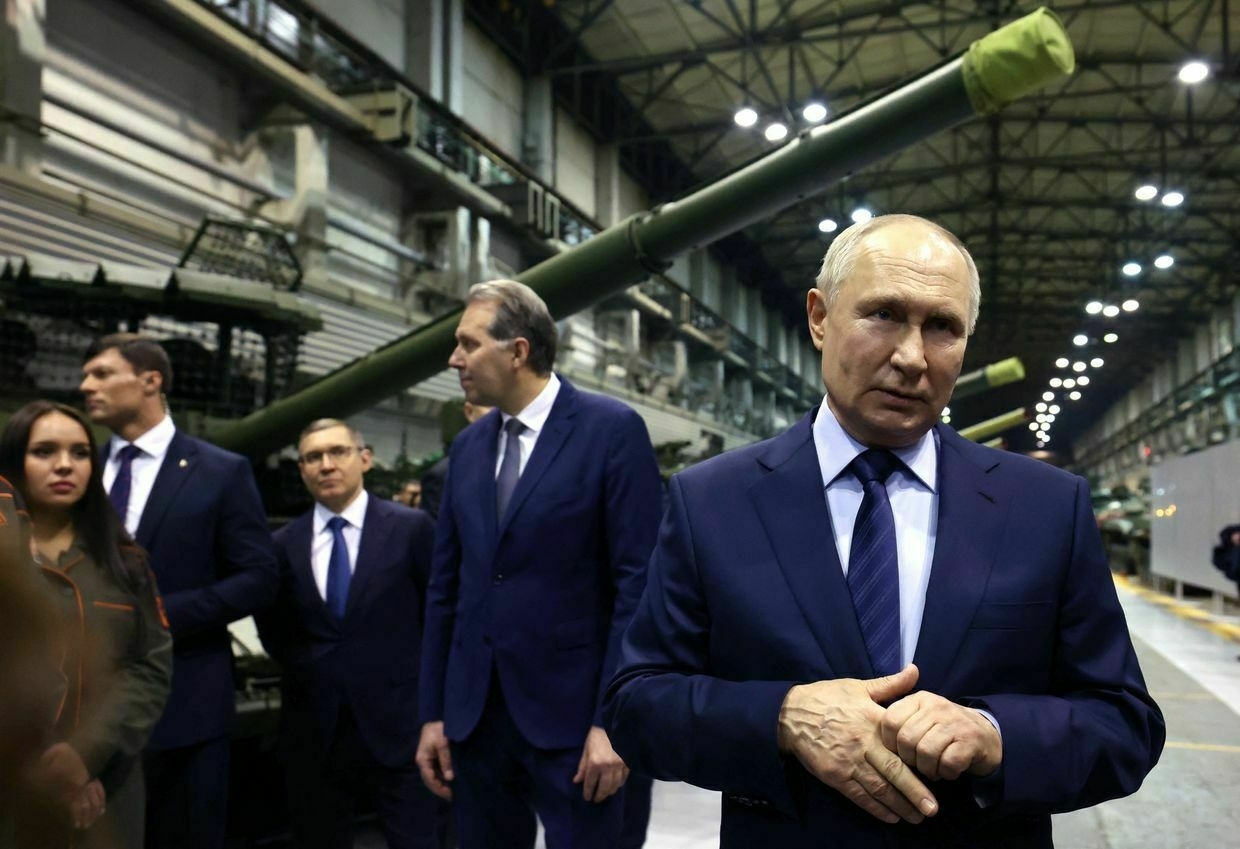
'Slovakia is Europe' — thousands of protestors take to the streets against Fico's pro-Kremlin agenda
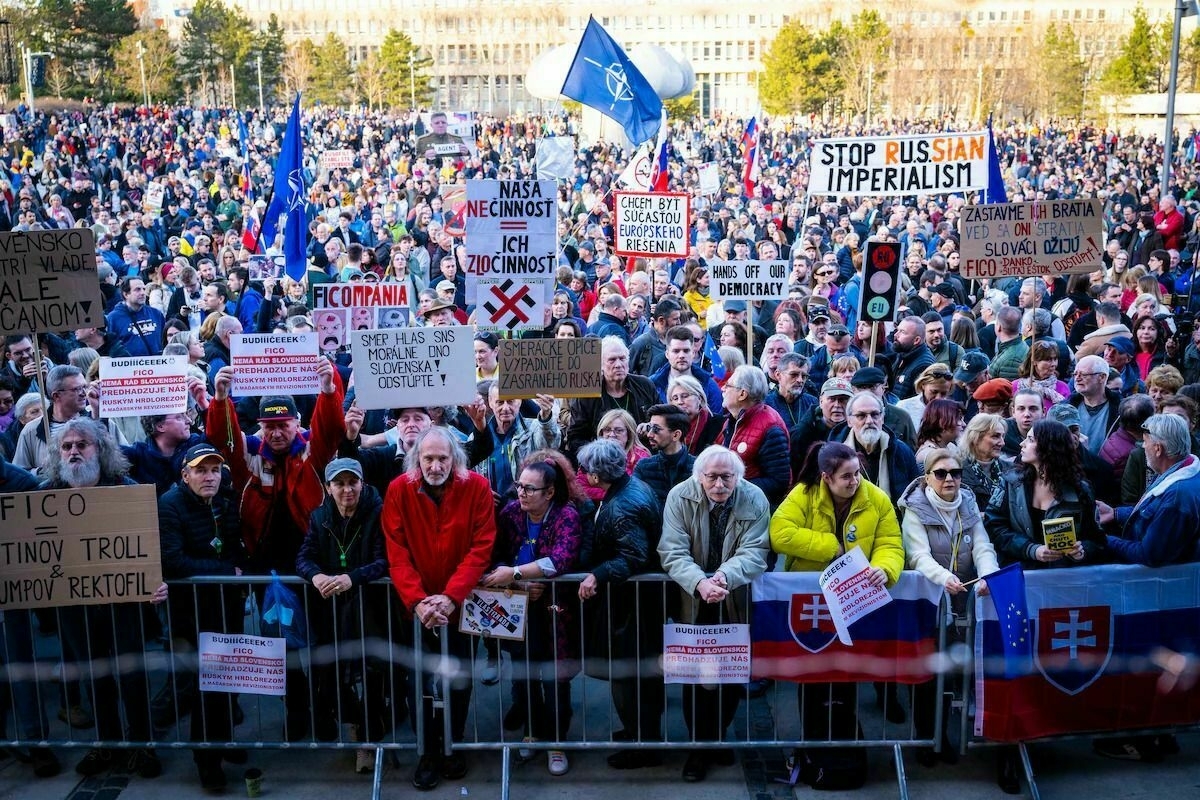
Thousands of protestors gathered on March 7 in more than 40 cities across Slovakia targeting the government of Prime Minister Robert Fico, Slovak media Aktuality reported.
In Bratislava’s Freedom Square, protesters chanted “shame” and called Fico a traitor, declaring that “Slovakia is Europe.”
Fico’s government has faced criticism for its perceived alignment with Russian interests, and his administration has repeatedly criticized Western aid to Ukraine.
Demonstrators accused Fico of distancing from the European Union, and for strengthening ties with Russian President Vladimir Putin.
“Robert Fico chose Putin, Slovakia chooses Europe,” the protest organizers said.
Protesters also condemned remarks by Fico’s chief advisor, Erik Kalinak, who recently suggested that Russia’s defeat of Ukraine would give Slovakia a “reliable neighbor.”
Numerous large-scale protests have occurred in Slovakia in the past few months following Fico’s remarks and visit in Dec. 2024 with Putin in Moscow. In Jan. 2025 hundreds of thousands of protestors took to the streets, chanting similar slogans including “Enough of Fico.”
As protests engulf Serbia, President Vucic looks for support East and WestEditor’s Note: Following a number of attacks against peaceful protestors in Serbia, the Kyiv Independent agreed to not publish the last names of people who gave comments for this story. BELGRADE, Serbia — Thousands of protestors walked 300 kilometers on March 1 from Belgrade to the southern city of…The Kyiv IndependentCamilla Bell-Davies
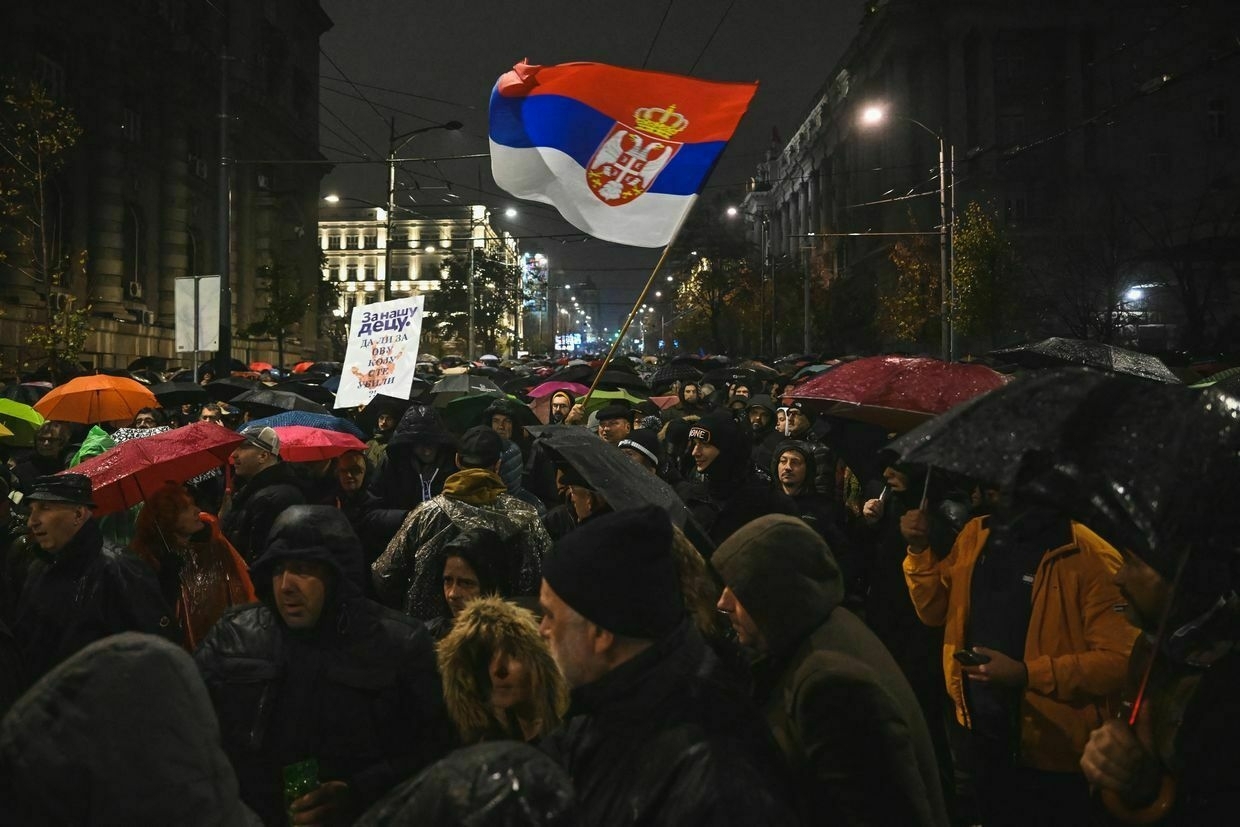
Belarus Weekly: Belarus, Russia ratify security pact, expanding nuclear umbrella, military integration
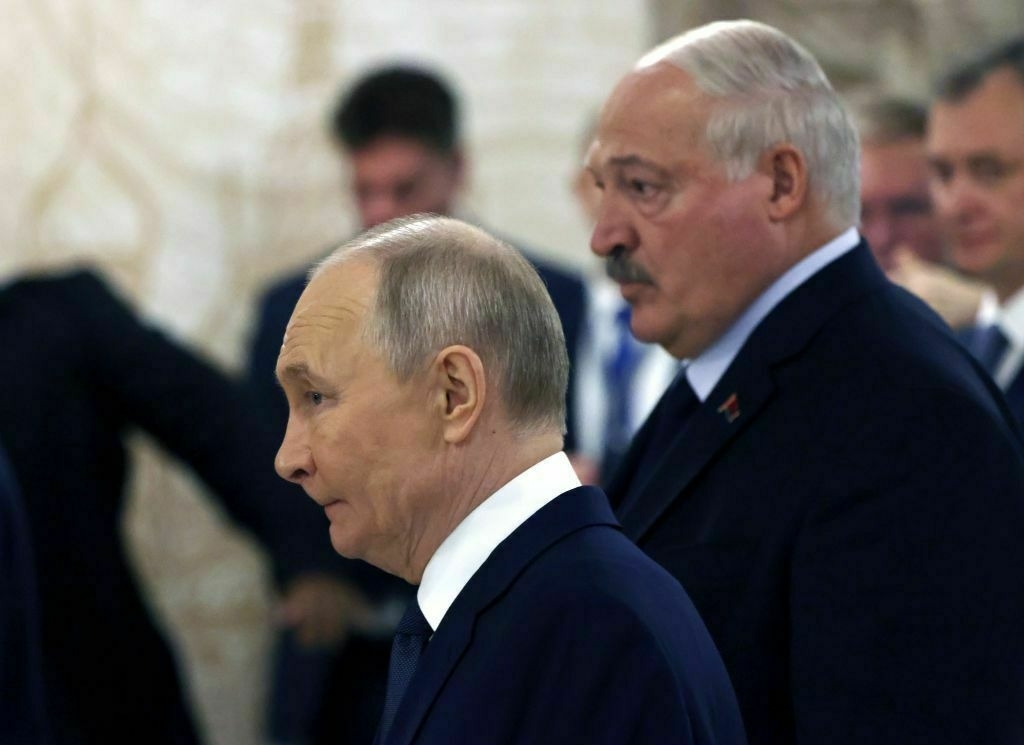
Belarus and Russia ratified the Union State Security Pact, expanding the nuclear umbrella and military integration.
Belarusian dictator Aleksandr Lukashenko invites U.S President Donald Trump, Ukrainian President Volodymyr Zelensky, and Russian President Vladimir Putin to Minsk for peace talks.
Belarus criminalizes sharing information on military movements and expands in absentia prosecution of exiled opponents.
Subscribe to the NewsletterBelarus Weekly<span data-sanitized-id="belarus-weekly-info" data-sanitized-class="belarusWeekly__info"></span> <button data-sanitized-id="belarus-weekly-subscribe-btn" data-sanitized-class="belarusWeekly__form_button"> <span data-sanitized-class="belarusWeekly__form_label">Join us</span> <path d="M4.45953 12.8114H7.90953C8.00052 12.8127 8.09085 12.7958 8.17517 12.7616C8.25949 12.7274 8.3361 12.6766 8.40044 12.6123C8.46478 12.548 8.51556 12.4714 8.54975 12.387C8.58395 12.3027 8.60088 12.2124 8.59953 12.1214C8.58173 11.9269 8.48974 11.7467 8.34265 11.6183C8.19555 11.4898 8.00465 11.4229 7.80953 11.4314H4.45953C4.27653 11.4314 4.10103 11.5041 3.97163 11.6335C3.84223 11.7629 3.76953 11.9384 3.76953 12.1214C3.76953 12.3044 3.84223 12.4799 3.97163 12.6093C4.10103 12.7387 4.27653 12.8114 4.45953 12.8114Z" fill="white"></path> <path d="M8.6 15.0114C8.60135 14.9204 8.58442 14.83 8.55022 14.7457C8.51603 14.6614 8.46525 14.5848 8.40091 14.5205C8.33656 14.4561 8.25996 14.4053 8.17564 14.3711C8.09131 14.3369 8.00098 14.32 7.91 14.3214H2.69C2.507 14.3214 2.3315 14.3941 2.2021 14.5235C2.0727 14.6529 2 14.8284 2 15.0114C2 15.1944 2.0727 15.3699 2.2021 15.4993C2.3315 15.6287 2.507 15.7014 2.69 15.7014H7.81C8.00511 15.7099 8.19602 15.643 8.34311 15.5145C8.49021 15.386 8.5822 15.2058 8.6 15.0114Z" fill="white"></path> <path d="M24.4202 6.01122H7.55022C7.43403 5.99626 7.31641 5.99626 7.20022 6.01122L7.08022 6.06122C6.85578 6.16602 6.66595 6.33276 6.53308 6.54181C6.4002 6.75086 6.32982 6.99352 6.33022 7.24122C6.32744 7.43266 6.36832 7.62222 6.44976 7.79549C6.5312 7.96876 6.65105 8.1212 6.80022 8.24122L12.5802 13.4512L6.89022 18.7112C6.71923 18.8375 6.57973 19.0016 6.4826 19.1907C6.38546 19.3797 6.33331 19.5887 6.33022 19.8012C6.32652 20.0535 6.3952 20.3015 6.52812 20.516C6.66105 20.7304 6.85264 20.9023 7.08022 21.0112C7.14691 21.0484 7.21729 21.0786 7.29022 21.1012C7.46476 21.1609 7.64625 21.1979 7.83022 21.2112H24.5102C24.8263 21.2048 25.1378 21.1355 25.4268 21.0074C25.7158 20.8792 25.9763 20.6948 26.1932 20.4648C26.4101 20.2349 26.579 19.9641 26.6901 19.6681C26.8012 19.3722 26.8522 19.0571 26.8402 18.7412V8.47122C26.8278 7.82952 26.5701 7.21694 26.12 6.7594C25.6699 6.30185 25.0616 6.03412 24.4202 6.01122ZM8.57022 8.08122L7.92022 7.49122H24.4202L16.4902 14.6812C16.407 14.7305 16.312 14.7565 16.2152 14.7565C16.1185 14.7565 16.0235 14.7305 15.9402 14.6812L8.57022 8.08122ZM7.73022 19.7912L8.48022 19.1112L13.4802 14.5812L14.8802 15.8612C15.1804 16.157 15.5793 16.3315 16.0002 16.3512C16.4212 16.3315 16.82 16.157 17.1202 15.8612L18.5202 14.5812L24.2002 19.8012H7.73022V19.7912ZM25.3502 18.7112L19.6602 13.5912L25.3502 8.37122V18.7112Z" fill="white"></path> </button> </div>Local media reported that a stray drone crashed into power lines in Belarus, causing outages in Mazyr.
Belarus hits record low in the Freedom House report, ranking 192-194 out of 207 globally.
Belarus, Russia ratify Union State security pact, providing for nuclear umbrella, military basesRussian President Vladimir Putin and his Belarusian counterpart Alexander Lukashenko have concluded the ratification of the Union State security guarantees, expanding Russia’s nuclear umbrella over Belarus and deepening the military integration of the two countries.
The Union State security pact was signed on Dec. 6, stipulating that Russian nuclear weapons can be used against an aggressor state — even ones that don’t have nuclear weapons themselves.
Putin signed the law ratifying the agreement on Feb. 28, after speedy consideration in Russia’s State Duma in February. Belarus’s Lukashenko signed the ratification law on March 4, his press office reported. The pact will enter into force after the sides exchange ratification documents.
The security pact signing comes on the same day the Russian parliament ratified another agreement postponing Belarus’s repayment of about $800 million in Russian state loans. Opposition politician Pavel Latushka, formerly an official in the Belarusian foreign ministry, linked the two ratifications.
“Lukashenko got himself into debt with Russia, and now he’s paying with the country’s national sovereignty,” Latushka said.
Beyond expanding the Russian “nuclear umbrella” to cover Belarus, Article 5 of the agreement provides for the establishment of Russian military bases and stationing of Russian troops on the territory of Belarus “to prevent and repel acts of aggression.”
However, the implementation of this provision would require a separate agreement between Minsk and Moscow. Russia has been pushing to establish an air base in Belarus since 2015.
The treaty also obliges the parties to “support” each other in the event of a threat to their constitutional orders — allowing each to potentially intervene to suppress public protests in either of the two countries.
The Union State security agreement lasts for ten years and is automatically extended, unless one of the parties declares its intention to withdraw six months in advance.
According to NATO estimates, Belarus hosted up to 30,000 Russian troops in the buildup to the Russian attack on Kyiv in February-March 2022, in the pretense that they were taking part in the “Union Determination-2022” military drills. Following Russian forces’ withdrawal from the northern front, the number of Russian troops in Belarus gradually fell, with just about 2,000 soldiers now being left, according to the Belarusian Hajun monitoring project.
In September 2025, Belarus is to host up to 13,000 troops for the Zapad-2025 (West-2025) exercises. The Russian-Belarusian plans to hold the exercises have sparked concern among Ukrainian officials.
Ukrainian troops’ logistics in Kursk Oblast destroyed, they face risk of encirclement, sources sayA Ukrainian soldier fighting in Kursk Oblast described the situation in the Russian region as “critical,” warning that Ukrainian troops in the region face the threat of encirclement. He added that Ukrainian soldiers based in the region would like to withdraw.The Kyiv IndependentKateryna Denisova
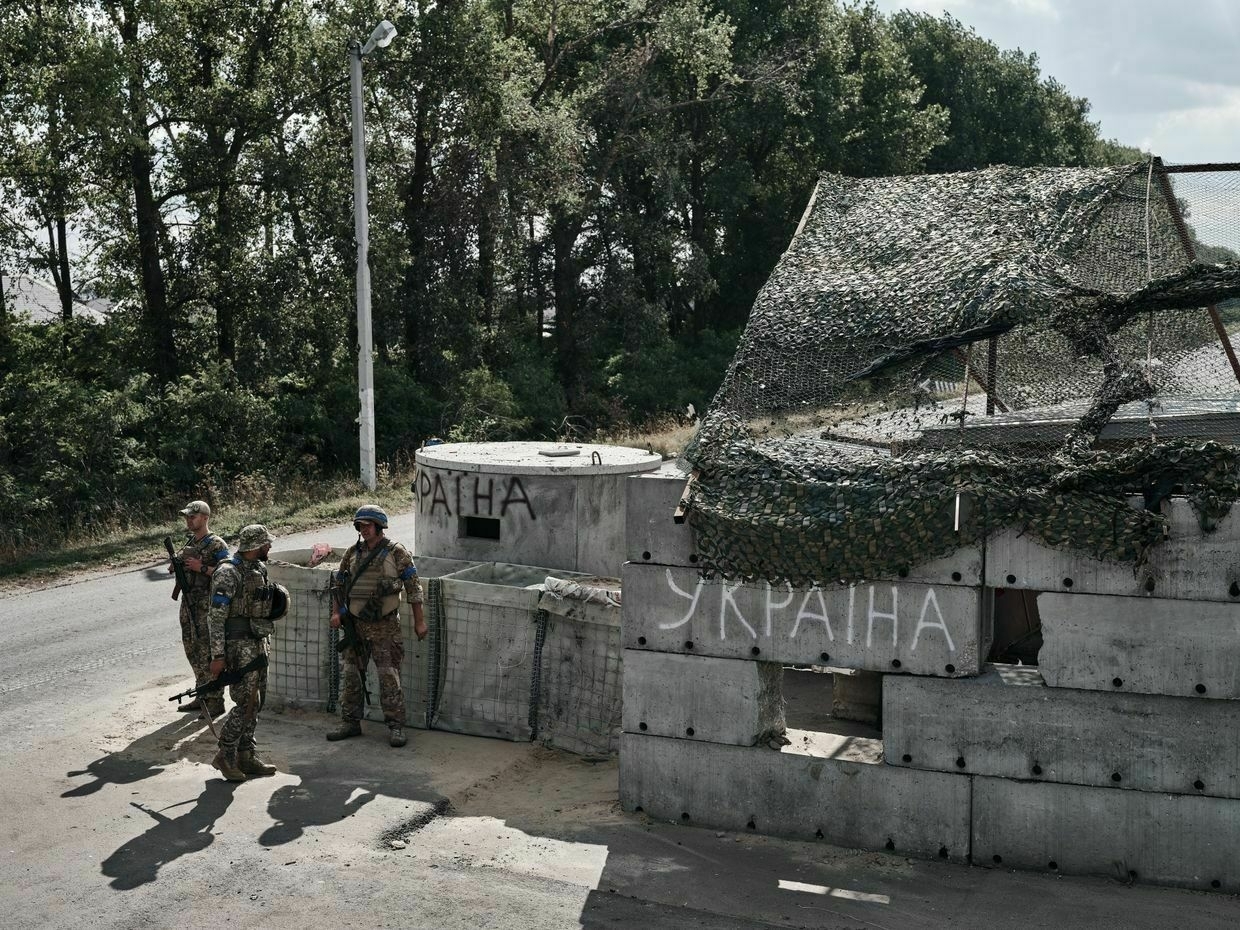
Lukashenko claims readiness to host Trump, Zelensky, Putin for talks in MinskMinsk is prepared to host the leaders of the United States, Ukraine, and Russia for talks on ending Russia’s war against Ukraine, Lukashenko, a staunch Moscow ally, said in an interview on March 4.
Lukashenko’s remarks came shortly after the United States imposed an immediate freeze on military aid to Ukraine, in a move the White House claimed was meant to pressure Ukrainian President Volodymyr Zelensky into entering peace negotiations.
In an interview with U.S. Internet media personality Mario Nawfal, Lukashenko reiterated his praise for U.S. President Donald Trump, and said he was willing to help achieve his goal of brokering peace between Kyiv and Moscow.
“It’s only 200 kilometers from the Belarusian border to Kyiv – half an hour by plane,” Lukashenko told Nawfal.
"You are welcome to come. We will sit down here. We’ll come to an agreement quietly, without noise, without shouting. So tell Trump: I’m waiting for him here, along with (Russian President Vladimir) Putin and Zelensky. We’ll sit down and calmly negotiate. If you want to make a deal.”
The Kremlin has already backed the proposal. “This issue has not been raised or discussed in any way. But, of course, Minsk is the best place for us. It is our main ally, so it is the best place for negotiations,” Kremlin spokesman Dmitry Peskov said.
In the early days of Russia’s all-out invasion, negotiations between Ukraine and Russia were held in Belarus but were later moved to Istanbul.
Minsk has repeatedly attempted to get a seat at the negotiating table, at the same time requiring “security guarantees” for itself.
Ukrainian Foreign Ministry spokesman Heorhiy Tykhyi said, “Belarusian officials have the right to claim a fair hearing in the process of bringing the aggressor and his accomplices to international legal responsibility for the crime of aggression against Ukraine.”
Belarus previously hosted talks between Ukraine, Russia, and the Organization for Security and Cooperation in Europe (OSCE) in 2014 and 2015, which led to the signing of the Minsk Agreements.
The agreements were meant to stop Russia’s war in eastern Ukraine, but both of the documents were ultimately violated by Russia. Two days before launching the full-scale invasion of Ukraine in February 2022, Putin declared that the Minsk Agreements “no longer existed.”
Lukashenko has been trying to make himself noticed by Trump, rushing to congratulate him on winning the U.S. presidential elections even before the results were confirmed, and promising to nominate President Trump for the Nobel Peace Prize. Following the failure of the rare earth metals deal with Ukraine on Feb. 28, Lukashenko ordered his ministers to look into the issue of mining rare earth metals in Belarus.
Trump’s increasing support for Russia leaves Zelensky with fewer options to secure U.S. backingAs Washington continues to pressure Kyiv intro submission, President Volodymyr Zelensky stands at a painful crossroads — agree to U.S. demands or chart a course without Washington, pinning Ukraine’s hopes for survival on Europe alone. Neither option seems reassuring for Ukraine. U.S. President Don…The Kyiv IndependentOleg Sukhov
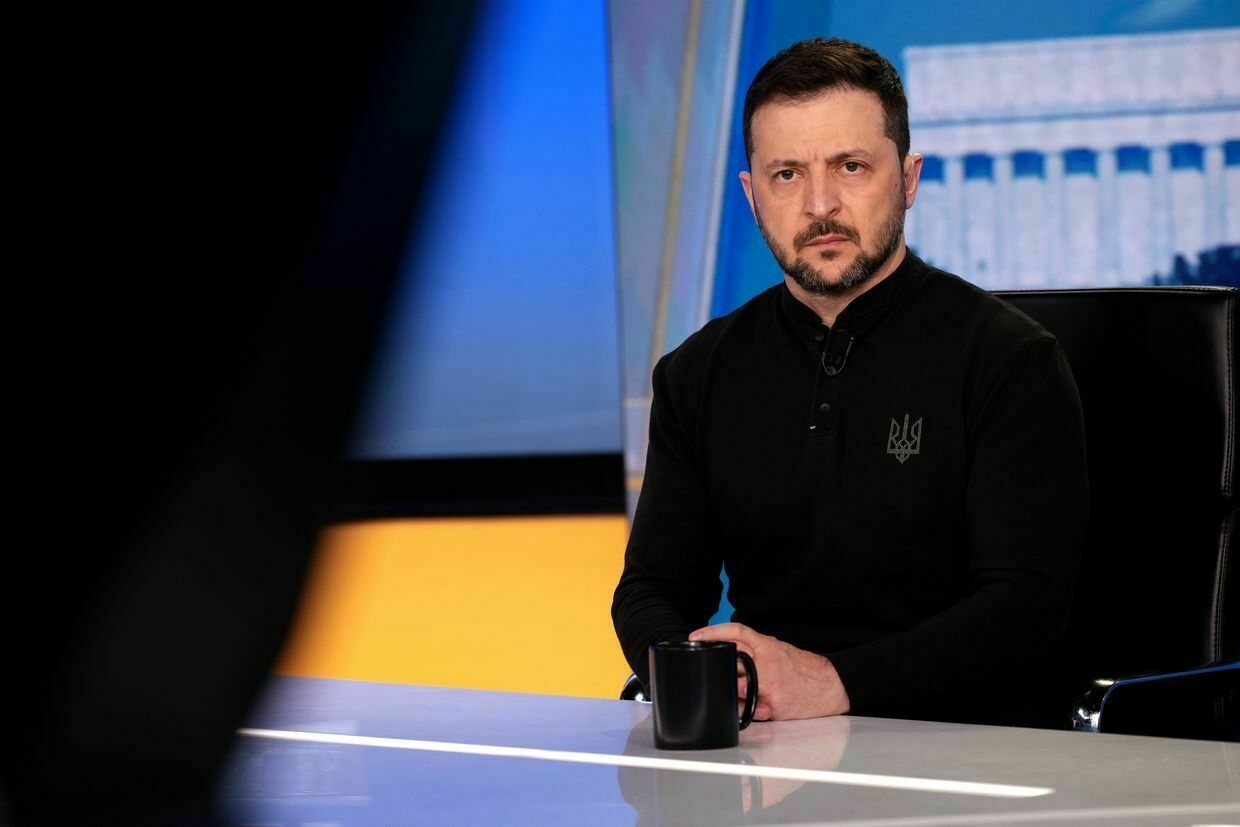
Belarus criminalizes spreading information on movement of military units, broadens grounds for repression of exiled oppositionUpdates to the criminal code in Belarus have introduced prison sentences of up to three years for the “unauthorized sharing of information” about the deployment of military units and their movement within the country, Human Rights watchdog Viasna reported on Feb. 28.
The changes to the code also broaden the category of offenses that can be subject to in absentia prosecution.
Since Russia unleashed its all-out invasion of Ukraine, Belarusians have been reporting the movement of Russian troops, and sharing footage and information on Russian troop locations with independent media and open-source intelligence projects. Ninety-three Belarusians have been sentenced on “extremism” charges for doing so.
The updated criminal code, which entered into effect on March 2, essentially outlaws sharing any form of content featuring the military in Belarus during wartime, emergencies, or counter-terrorist operations — unless the authorities have already shared such information.
Violations are punishable by up to three years of imprisonment, or six years, if premeditated and committed by a group, and causing significant damage, the amended code reads.
The updated criminal code also introduces the new status of “a president who ceased to fulfill his duties” and criminalizes violence, threats, and libel against him. According to the current constitution, the incumbent, Alexander Lukashenko, can be “re-elected” once more and rule until 2035.
Although there are no apparent signs of an impending transition of power, the Belarusian authorities have established an extra-governmental body — the All-Belarus People’s Assembly, which is headed by Lukashenko — to which the dictator could “retire” after leaving the presidency, while still wielding considerable influence.
Drone crashes into high-voltage power lines in Belarus, causing local blackoutA stray Russian attack drone crashed into high-voltage power grid lines at a thermal power plant on Feb. 27, causing the most significant damage by a drone in Belarus so far, Flagshtok, a local news outlet in the Homiel region, has reported.
Russian drone incursions into the Belarusian airspace have risen sharply since July 2024. At least 395 drones were recorded flying over the country in the second half of the year, and this year 94 were spotted in January alone. The Belarusian authorities don’t comment on the incidents, and never publicly objected to them with their ally – Moscow.
On the morning of Feb. 27, residents of Mazyr, Homiel Oblast, about 45 kilometers from the border with Ukraine, were cut off from heating and hot water supplies. Local state energy company Homielenergo attributed the problem to a breakdown in the rather old heat supply system, without elaborating on the cause. Heating and hot water supplies were restored after a full day of repair work.
According to Flagshtok’s sources, the drone crashed into the high-voltage lines of a thermal power plant, triggering its automatic protection system, which led to a full shutdown of the plant, which is located south of the Mazyr Oil Refinery — a strategic object reportedly protected by Belarusian air defenses. Restarting the plant caused a fault in the piping system.
On the same night, another drone crashed and set fire to a farm building in Ziabrauka, a village next to a military airfield in the Homiel Oblast. Residents reported the sound of gunfire and a blast at around 4 a.m.
Belarus given its lowest ever ranking in Freedom in the World reportBelarus ranked 192-194th out of 207 countries and territories worldwide on the level of political and civil liberties, according to global human rights watchdog Freedom House’s Freedom in the World report, which was published on Feb. 26.
The Freedom in the World report, first published in 1973, tracks the condition of political rights and civil liberties around the globe. According to its authors, global freedom declined in 2024 for the 19th consecutive year, and Belarus received some of the “worst aggregate scores” for political rights and civil liberties.
The country scored just seven points out of 100, sharing its position with Azerbaijan and Myanmar.
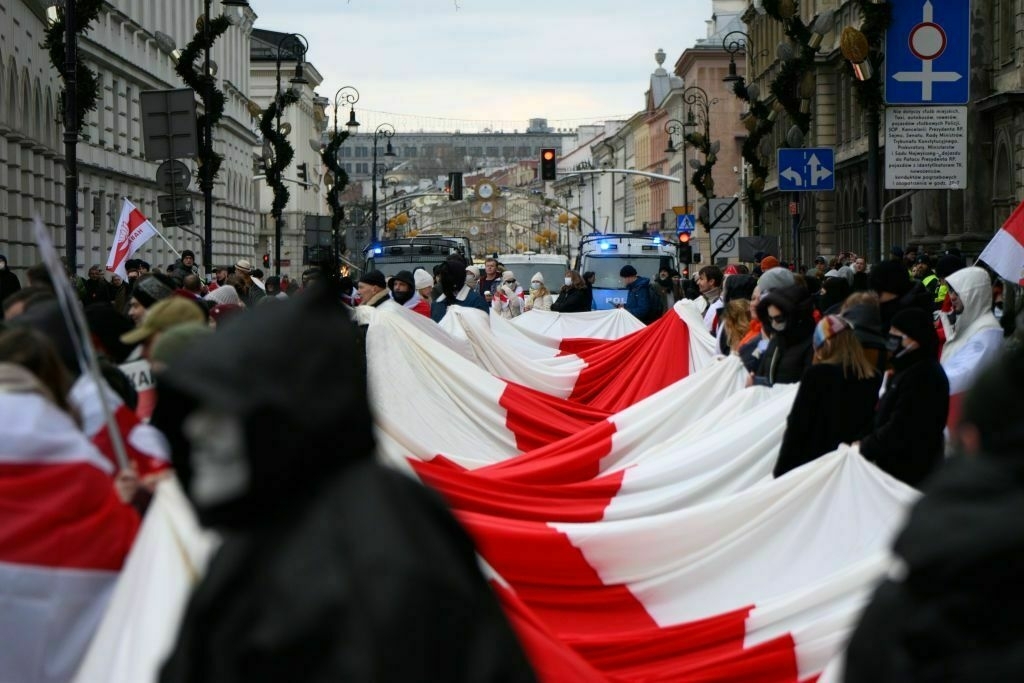
Hundreds of Belarus opposition supporters take part in a march in Warsaw, Poland on Jan. 25, 2025. (Jaap Arriens/NurPhoto via Getty Images) The report also notes Minsk’s role in the indoctrination of Ukrainian children forcibly deported from the occupied territories. According to the recent estimates by Belarusian opposition People’s Anti-Crisis Management initiative, up to 3,500 Ukrainian children from Russia-occupied Ukrainian territories were transported to Belarus.
Belarus is also one of the most repressive countries for lawyers. Over the past four years, up to 27% of Belarusian lawyers were disbarred or lost their licenses after representing political prisoners in courts, U.S. government-funded broadcaster RFE/RL reported, citing the International Observatory of Lawyers.
As protests engulf Serbia, President Vucic looks for support East and West
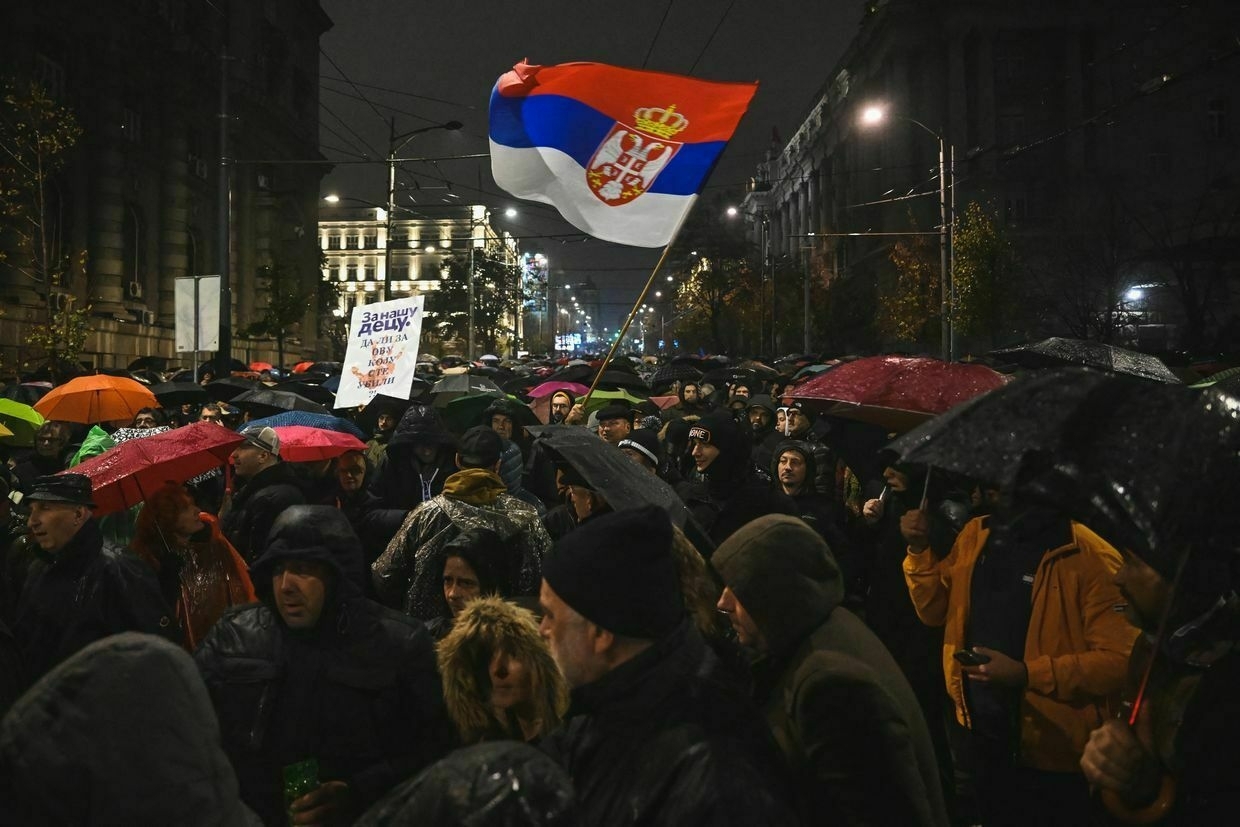
Editor’s Note: Following a number of attacks against peaceful protestors in Serbia, the Kyiv Independent agreed to not publish the last names of people who gave comments for this story.
BELGRADE, Serbia — Thousands of protestors walked 300 kilometers on March 1 from Belgrade to the southern city of Nis to rally support for an anti-corruption protest that took aim at the ruling party.
Serbia’s Russia-friendly President Aleksandar Vucic has often used a Kremlin playbook to discredit the protests that occasionally rise in a country balancing between Russia and the West.
Such a balancing act has been increasingly difficult to maintain.
Nis, the country’s third largest city home to 250,000, has long been President Vucic’s core voting stronghold along other cities and towns further away from the capital. Yet, residents who greeted the arriving protesters said they were tired of their ruling party and wanted to listen to what young people have to say.
The Serbian protests began in November after a train station roof in the town of Novi Sad collapsed, killing 15 people. This roof had been hastily reconstructed in 2024 with Chinese and state funds and a procurement procedure widely viewed as corrupt. Students took to the streets, demanding accountability and justice for the victims.
They used a bloody hand symbol to highlight how corruption in Serbia cost lives. Vucic had been actively blaming the upheaval on the West, saying that foreign forces have been attempting to spark a “Ukrainian-style revolution in Serbia."
The protestors, however, aren’t pro-Ukrainian or anti-Russian, and are united primarily by their opposition to the current government rather than broader ideological takes.
“We really feel like we can change something this time.”
Protests in Serbia have gone on for over 100 days in 60 different settlements. Students, farmers and businesses continue to strike in support. Universities, some of which are now closed, are used as base-camps for democratic decision-making among the students.
Alexander, a student who took part in daily marches, said the protesters remain hopeful. "We really feel like we can change something this time," he said.
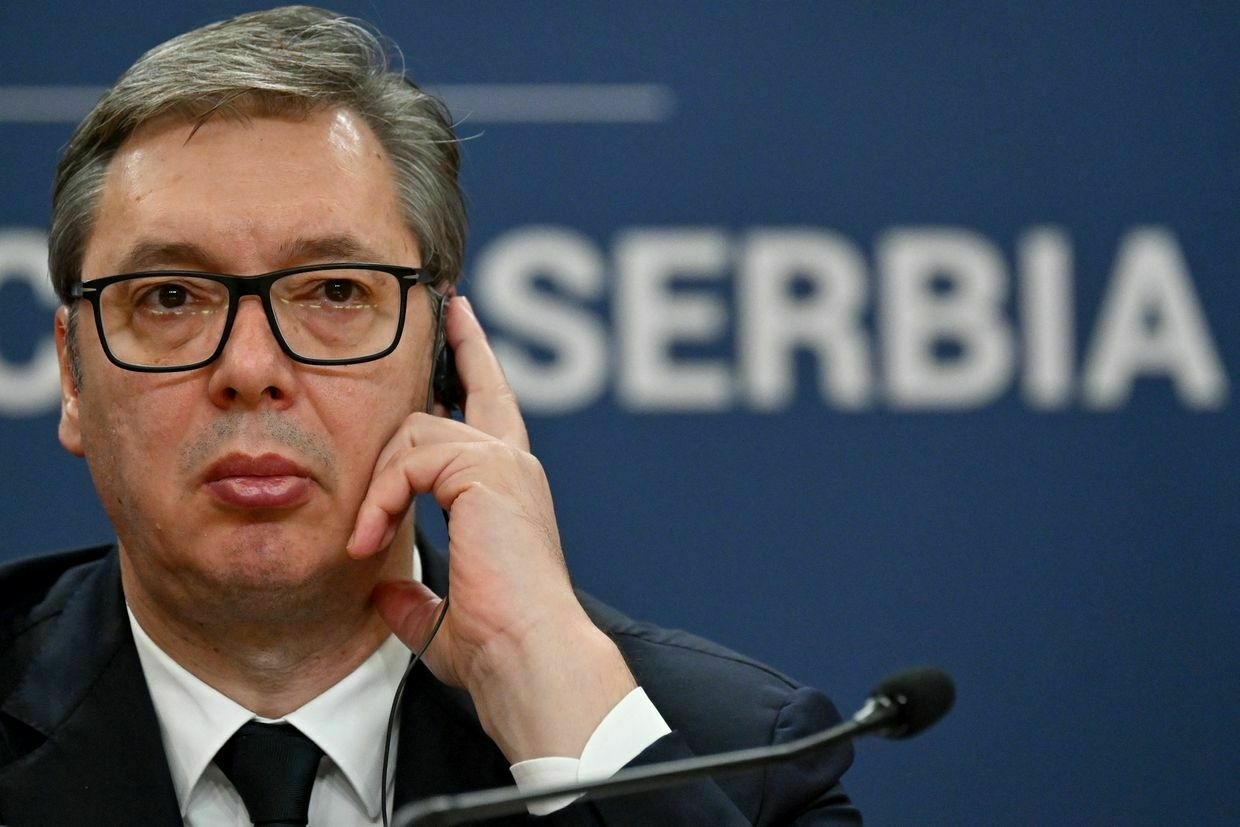
Serbian President Aleksandar Vucic attends a press conference with Turkey's president in Belgrade, Serbia, on Oct. 11, 2024. (Andrej Isakovic / AFP via Getty Images) The movement follows a pattern. Students announce a mass rally in a Serbian city, then walk to that location for days. Along the way they talk to locals to gather support for the movement.
A taxi driver in Nis on March 1 said his views had changed since seeing the protestors in the flesh, rather than on state TV where they are routinely denigrated.
"In the Balkans, children are always taught to listen to their elders. But now we are listening to them. They are teaching us to stand up for our rights," he said.
Regardless of Trump’s Ukraine peace deal, war with West is ‘foundational to Putin’s rule,’ experts sayWith every day of the new White House administration that passes, the chances of Russia being brought in from the cold on the international stage after its full-scale invasion of Ukraine appear to be increasing. U.S. President Donald Trump’s ongoing Kremlin charm campaign has seen Ukraine and Europ…The Kyiv IndependentKollen Post
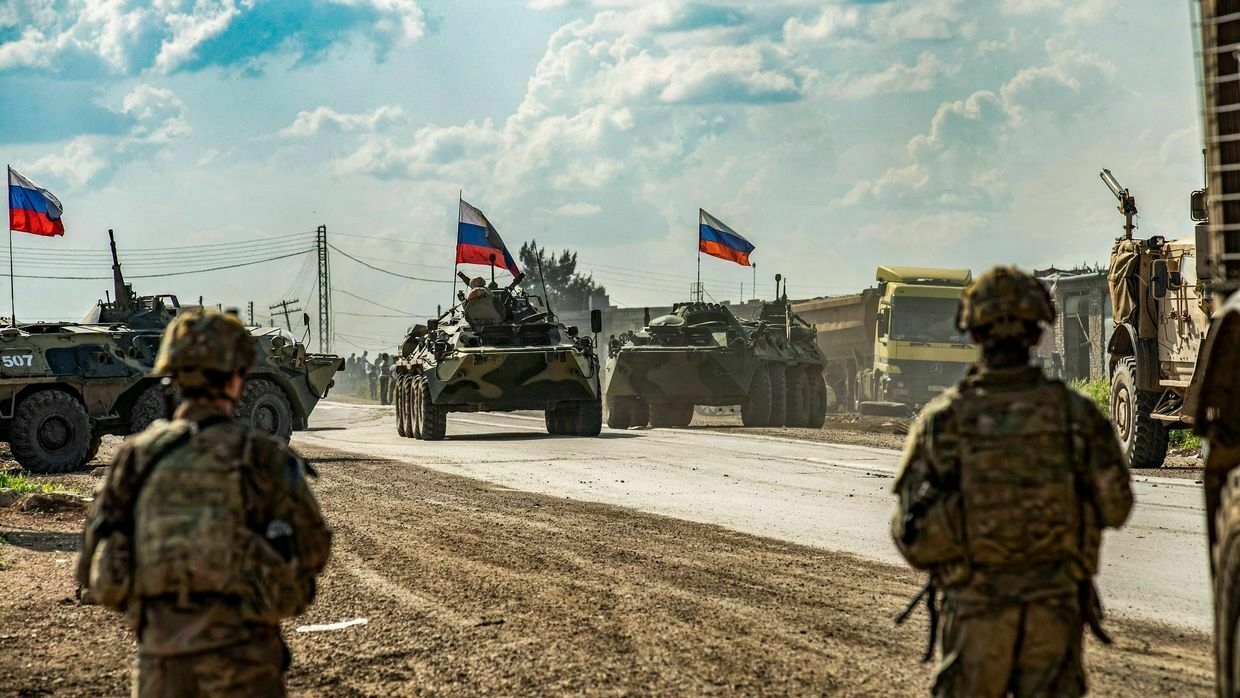
Serbia's changing imageThe pro-democracy movement is changing Serbia's image. Protesters seek respect for the rule of law, a free press and, fair elections, and an end to widespread corruption.
So far, the protests have prompted Vucic to publicly oust Prime Minister Milos Vucevic and Transport Minister Darko Glisic, both of whom remain in their place as they await a vote in parliament.
Arrests of several company heads and policemen in what Vucic has called a "fierce fight against corruption" had also taken place.
Protestors, however, show a deep skepticism towards Vucic's proposed anti-corruption measures which are widely seen to be a last ditch attempt to cling to power.
Students interviewed by the Kyiv Independent expressed deep frustration with the ruling Serbian Progressive Party (SNS), blaming it for the country's lack of media freedom, rigged elections, and neglect of public services and civil liberties.
Andjela, 22, a student protestor, said, "The whole ruling party should resign. They've shown they are unfit to run the country. We haven't had free elections in my lifetime. It's unsafe here, incomes are low, prices are high, and criminals go unpunished, including the thugs who beat up students."
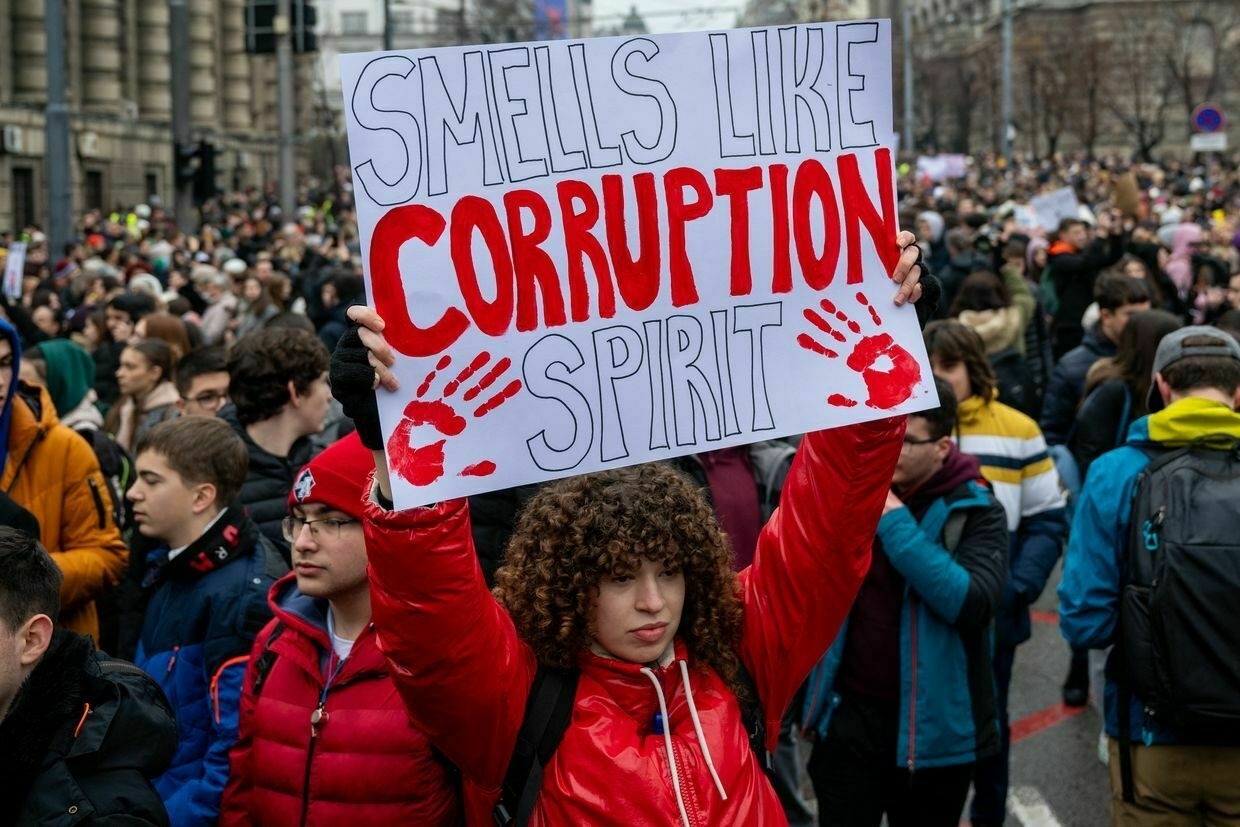
A woman holds a placard reading "Smells like corruption spirit" during a demonstration in Belgrade, Serbia, on Jan. 24, 2025. (Andrej Isakovic / AFP / Getty Images) 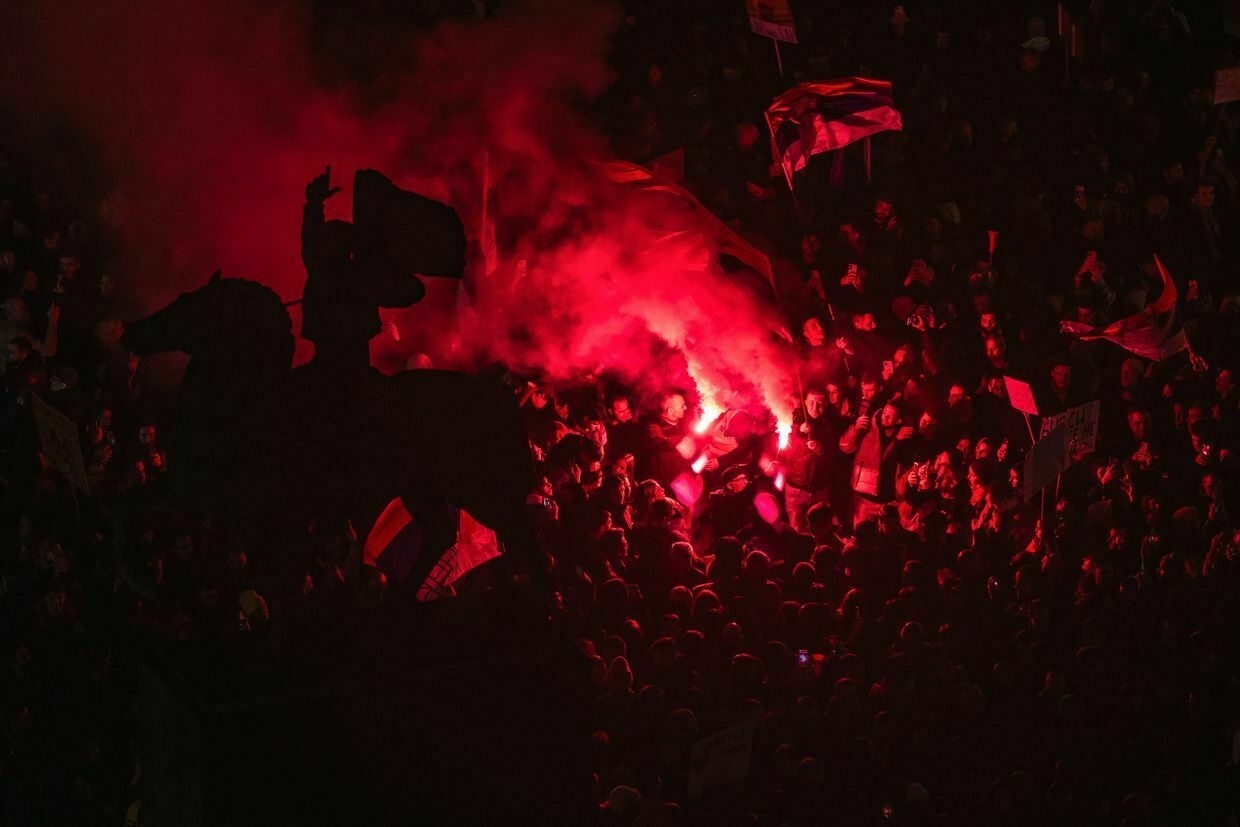
People gather during a demonstration in Nis, Serbia, on March 1, 2025, during a national rally organized by students. (Andrej Isakovic / AFP / Getty Images) The latest election, in 2023, was seen as being widely rigged, with 50,000 voters from the Republika Srpska, a ethnic Serbian enclave of Bosnia, were bussed to Belgrade to sway the vote.
Mass protests followed, but they led to no change.
A year later, a new protest movement was built on years of unresolved discontent.
In the aftermath of the Kosovo War of 1999, a mass student-led movement called OTPOR brought down the country's autocrat, Slobodan Milosevic.
Srecko Mihailović, a veteran protester of the OTPOR movement, said that he's been on marches for 30 years and hopes he won't be doing it to the grave. "We've had the same president for 10 years, this is not normal," he said.
"But we need to show that Serbia isn't Vucic."
The Czech weapons giant replacing the Kalashnikov in Ukraine’s armyThe Russian-made Kalashnikov still prevails as the main small arm in Ukraine’s military. A Czech weapons giant is setting up shop in Ukraine’s factories to change that. The Prague-domiciled conglomerate, Colt CZ, has set up assembly of its Bren 2 assault rifles inside Ukraine under the name “Sich”The Kyiv IndependentKollen Post
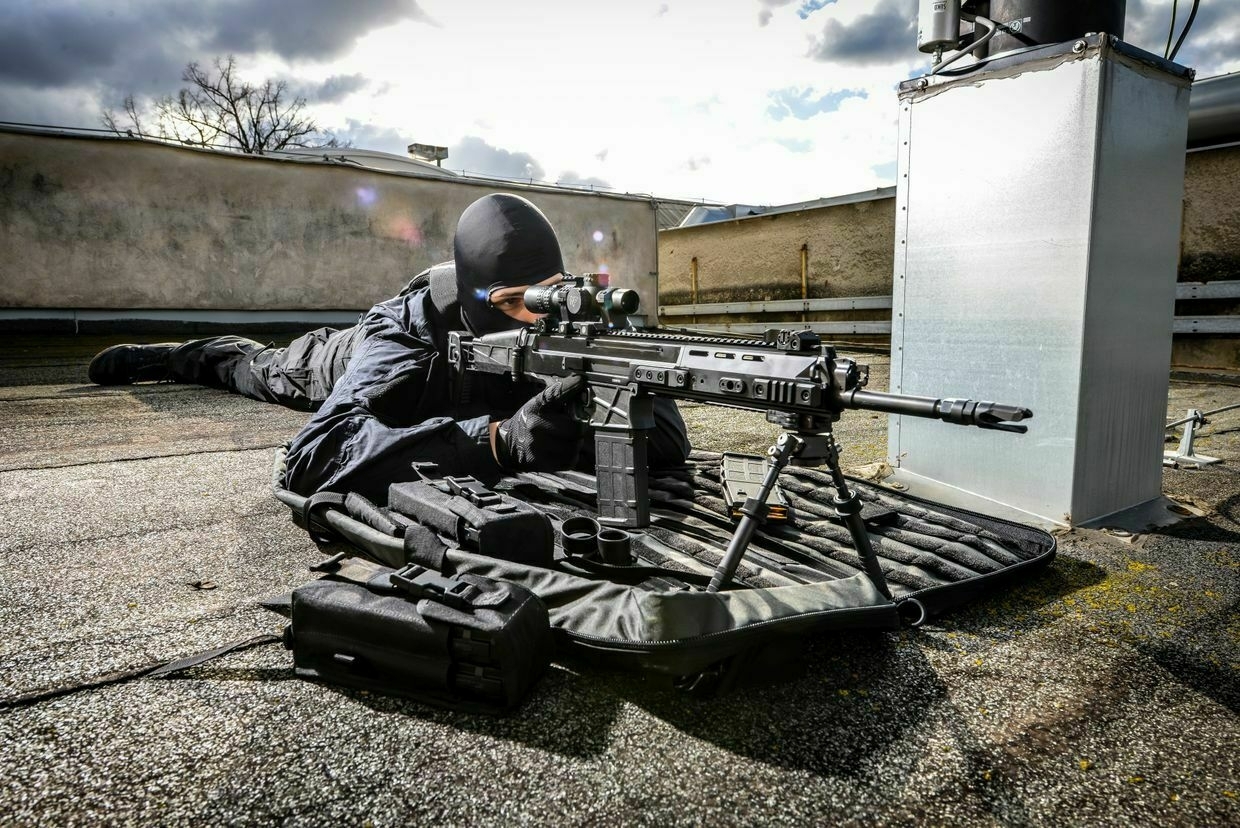
Autocrats playbookVucic's response to the protests has been chaotic.
The president claimed, without evidence, that outside forces are behind the protests and has accused the West of trying to incite a revolution. At the same time, Vucic had told EU leaders that "Putinists" are trying to stir up trouble to deepen the country's ties with Russia.
On Jan. 20, Serbian police detained 14 foreign nationals at an NGO summit in Belgrade.
Such tactics have been used by the ruling party since 2012. State tabloids bully critics of the government, illegally publish their personal data online, and incite violence against those who oppose the government.
Authorities have also been linked to hooligan groups that stir up trouble during protests to justify police action. A similar tactic was used during the 2013-14 EuroMaidan Revolution in Ukraine, when the pro-Kremlin government employed thugs to fight with protesters, coining the term Titushky.
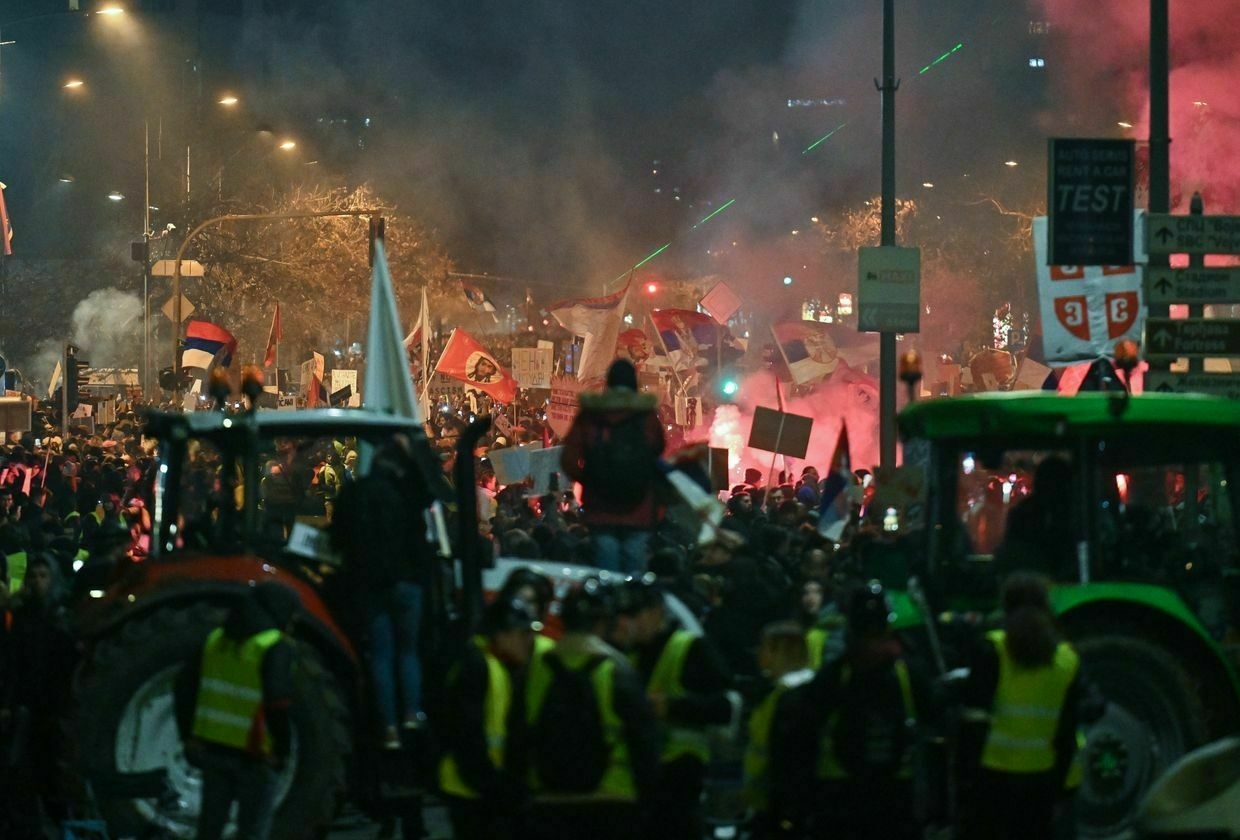
Tractors and protesters block the Bridge of Freedom during an anti-government demonstration in Novi Sad, Serbia, on Feb. 1, 2025. (Oliver Bunic / Bloomberg / Getty Images) 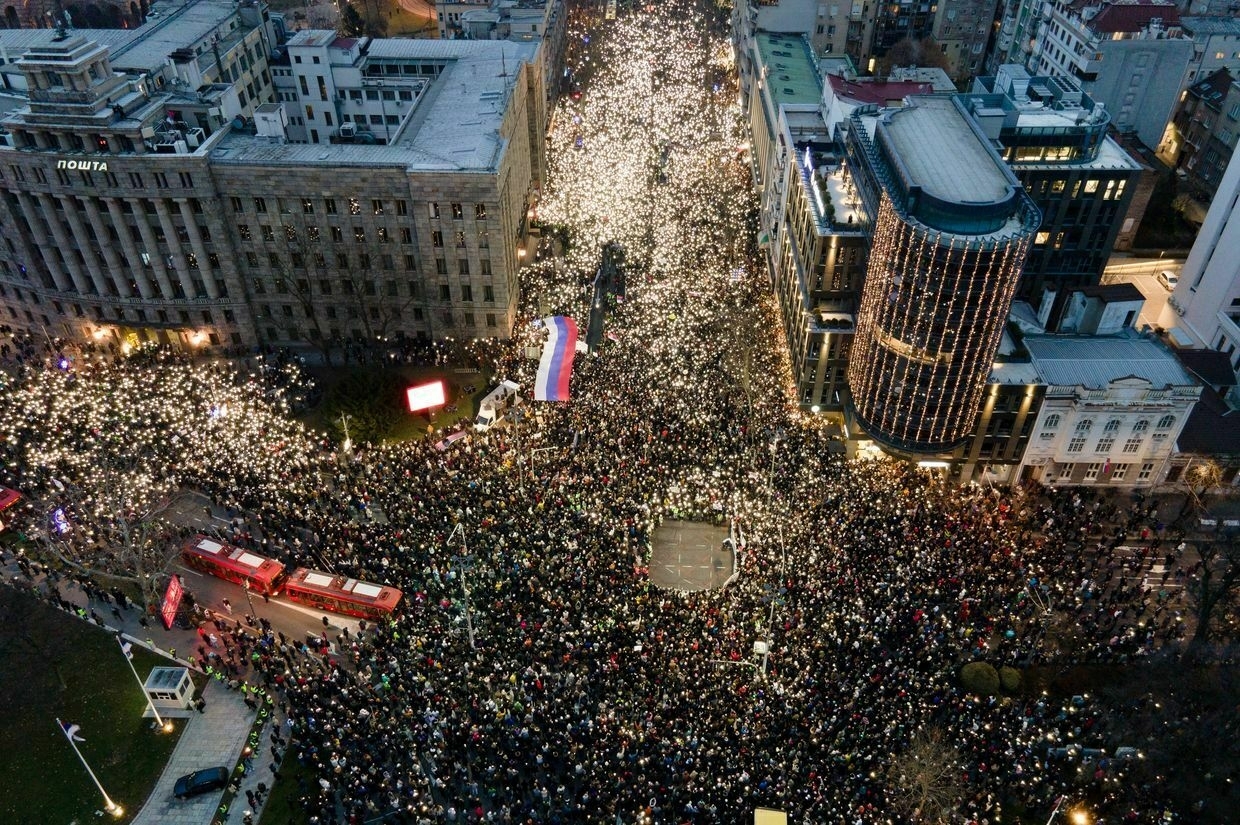
Demonstrators and students gather in front of Serbia's Constitutional Court in Belgrade on Jan. 12, 2025, demanding accountability for the Novi Sad railway station tragedy. (Tadija Anastasjevic / AFP / Getty Images) Andjela, who took part in protests, noted that this year's protesters are alert for provocateurs.
A protester was beaten up, while other students were rammed with cars and hospitalized, she said.
"We are careful in case it escalates and more of our students end up in the hospital," Andjela added.
A delicate balanceAt present, there doesn't seem to be a solution to the political crisis.
Student protesters know their government's playbook well, so they tread carefully. They appeal to patriotism and wave only Serbian flags to avoid appearing influenced by outsiders.
So far, the careful approach has united support across societal sectors, including the rural population, who were once Vucic's core base. Farmers brought tractors to protect students, blocking key Belgrade bridges.
"This time we don't fear the government. They should fear us."
The rallies have also gained international support from students in the U.S., Austria, Croatia, and vocal celebrity support from tennis superstar Novak Djokovic and Madonna.
The countrywide solidarity has reduced citizens' fears of government-sponsored attacks, threats to family members, and job losses, which previously weakened protests in 2012, 2020, and 2023.
Boris, an engineering student taking part in protests, said, "This time we don't fear the government. They should fear us."
The question remains what would follow were the government to call a snap election to ease the crisis.
Boris said that he would like to see an interim government of "democracy experts and professionals" in place who could create the conditions for fair, free elections.
At present, students do not have a plan to back a political candidate. They have distanced themselves from opposition parties as they view them as part of the system they are up against.
Up until now, the official opposition had been fragmented and cautious.
Opposition party members "have nothing to do with the organization" and support the protests "as civilians only," said lawmaker Borko Stefanovic, deputy president of the Party of Freedom and Justice. "The regime could misuse this, saying the opposition is behind the protests. But the students lead."
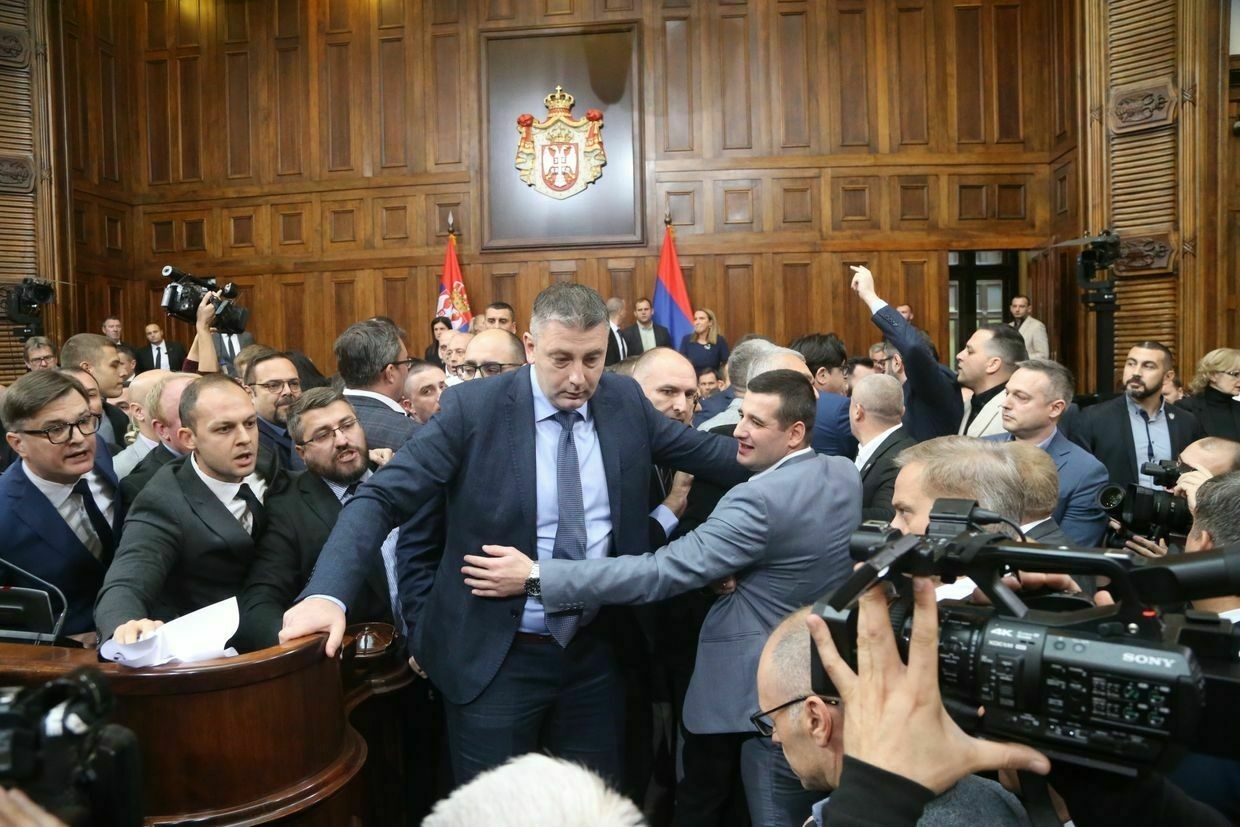
A fight broke out between opposition and ruling party members in the Serbian National Assembly over the Novi Sad train station tragedy in Belgrade, Serbia, on Nov. 25, 2024. (Filip Stevanovic / Anadolu / Getty Images) On March 4, some unconventional action was taken in parliament. Lawmaker Radomir Lazovic of the Green-Left front voiced support for the protestors and launched fireworks in the Serbian parliament, which hospitalized three people.
A brawl ensued between opposition and ruling party members.
"A clear message was sent that we do not accept the institutional violence of the Serbian Progressive Party, which has been carried out for years. The only agenda item at the Serbian parliament sitting can be the fulfillment of students' demands," Lazovic said.
Yet, a new election might not be the solution the protestors are hoping for.
"No elections would work under current conditions and without a free press. Vucic would steal and rig another election," Stefanovic said.
Trump’s alignment with Russia derails Europe’s push for a peacekeeping force in UkraineEuropean countries have intensified talks on sending peacekeepers to Ukraine to monitor and enforce a possible ceasefire. But the potential deployment of European peacekeepers to Ukraine faces a lot of challenges and uncertainties. There is no unity among European countries on the issue, with some…The Kyiv IndependentOleg Sukhov
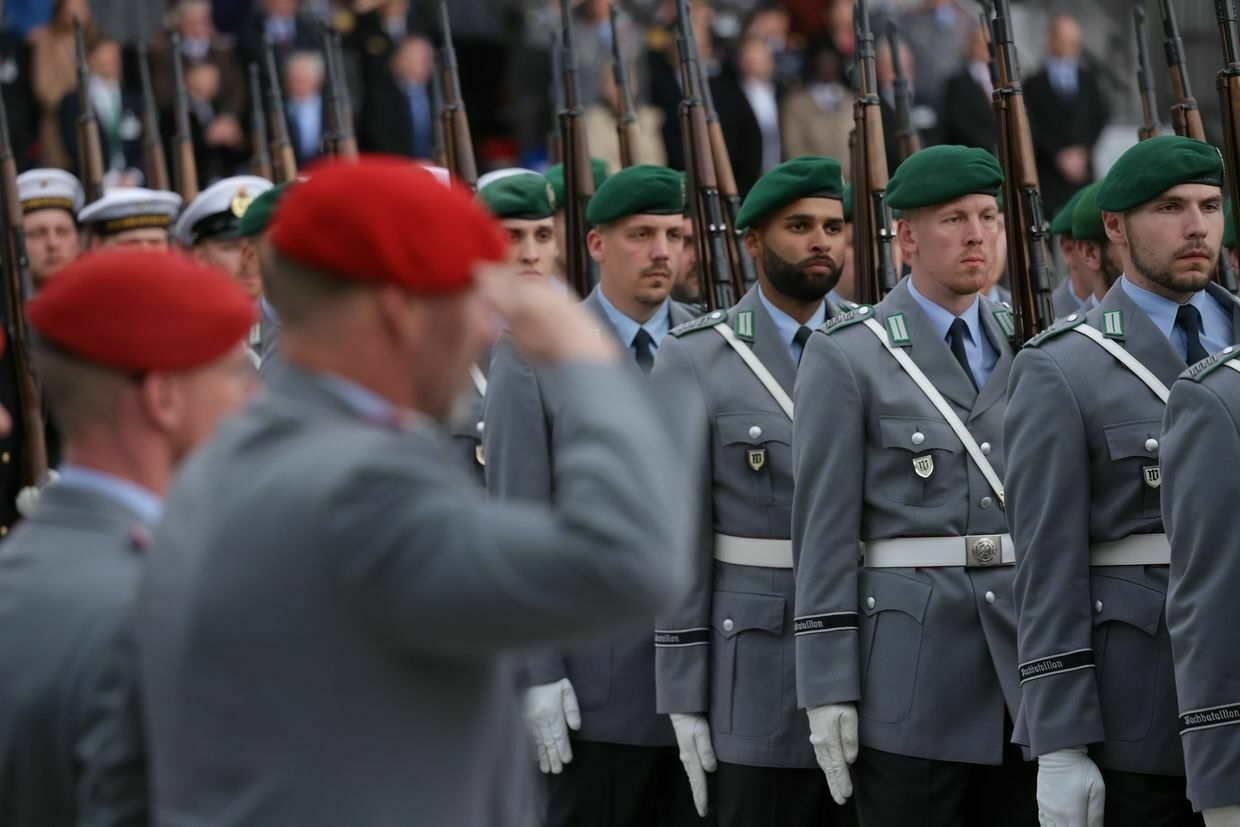
EuroscepticismThe countrywide support for change in Serbia, however, doesn't mean those on the street agree on policy and their country's alignment.
Though EU leaders expressed admiration and support, the absence of EU flags in the crowd is deliberate. Potestors see their cause as a local concern they must deal with within-country.
An IPSOS poll in December 2024 revealed that only 46% of Serbs would support EU membership in a referendum.
Many protesters feel the EU and U.S. leaders have emboldened Vucic following years of hostilities in the region. Many also dislike the West for their handling of the Yugoslav Wars in the 1990s.
The EU has worked with Vucic on ammunition exports, with $800 million in Serbian ammunition ending up in Ukraine through Western intermediaries. In July 2024, the Serbian government granted the EU access to its large lithium reserves. This also sparked thousands of Serbs to come out in protest, citing environmental concerns.
Vucic has also gained favor with U.S. President Donald Trump by allowing his son-in-law, Jared Kushner, to build a hotel in central Belgrade on top of a war memorial.
Residents of Belgrade viewed the proposal with hostility.
Emotional and economic ties to RussiaAnti-Western sentiments have long united Serbia with Russia, even though the Serbian population continues to migrate west for education and work. This connection dates back to the 19th century when the Russian Empire helped secure Serbia's independence from the Ottoman Empire. It was also bolstered by a common religion and church ties.
Today, the bond is fuelled by anger over NATO's 1999 bombing of Belgrade to end President Milosevic's war against Kosovo. Serbia, backed by Russia, still claims Kosovo, which declared independence in 2008.
Serbia maintains a broad conservative, Orthodox streak with strong anti-LGBTQ+ views. Many Serbs see Western nations as too "liberal." In contrast, many who came of age during the 1990s view Russian President Vladimir Putin as "a strong leader" pushing back against the West.
A 2023 poll by the Henry Jackson Society showed that over 61% of Serbs reported no change in their positive views on Russia since the start of the all-out war in Ukraine, and 21.7% said their support for Russia has increased.
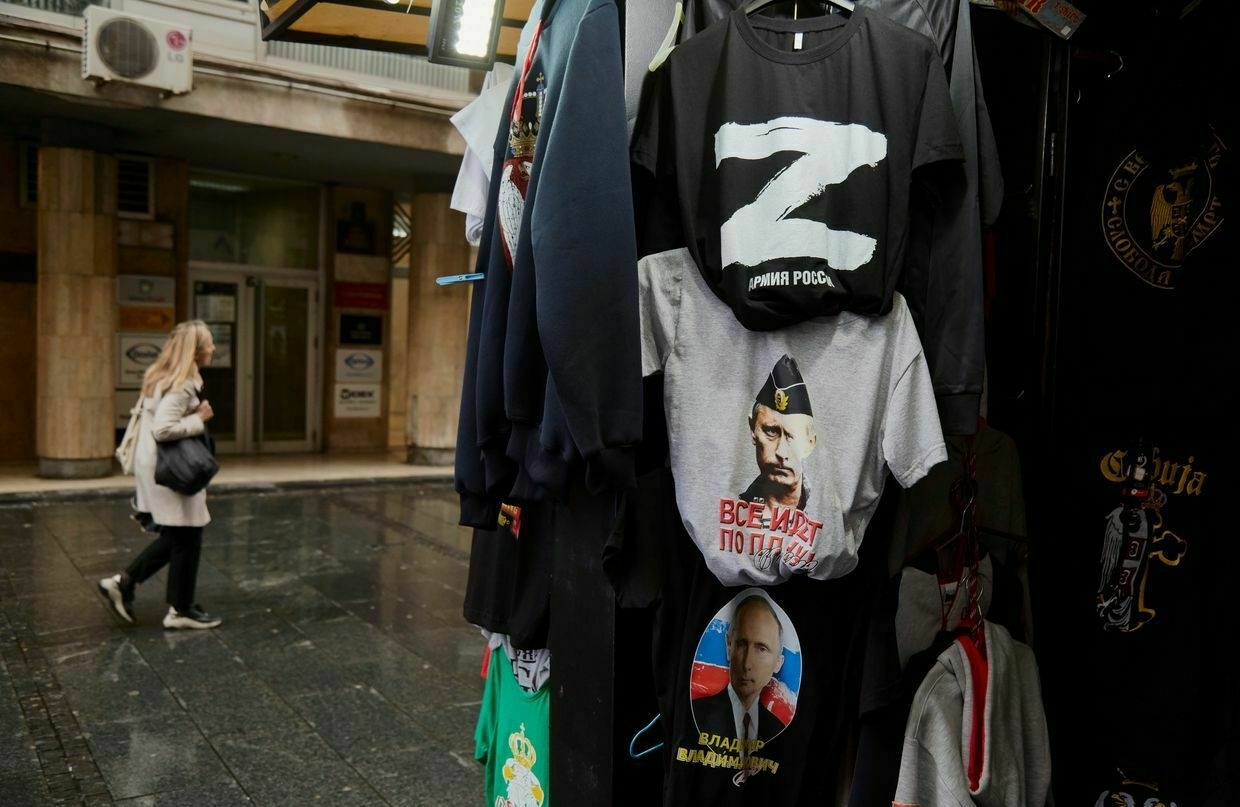
T-shirts picturing Russian President Vladimir Putin and the letter Z are for sale in Belgrade, Serbia, on March 31, 2022. (Pierre Crom / Getty Images) Pro-Russian displays are common in Belgrade.
Z t-shirts and Putin mugs are sold in central markets. Serbian and Russian flags and "Zajedno (together)" signs are widespread. Since 2022, mercenaries from far-right groups have been traveling to Russia to fight against Ukraine.
Since the Russian invasion of Ukraine, Serbia has welcomed up to 300,000 Russians fleeing the war.
When these Russians share anti-Putin views, it can prompt strong reactions from the locals. Nino, who owns a cigar lounge in Belgrade, said, "God has given us the gift of these liberal Russians. We'll show them the true path and send them back home, more Russian than ever!"
But attitudes in the capital, Belgrade, have shifted as an influx of wealthy Russian IT-workers has slowly undermined the imagined 'Slavic Orthodox brotherhood." Many Belgraders now resent recent Russian immigrants for not integrating, driving up housing prices and gentrifying the city with expensive shops and restaurants packed by foreigners.
Students protesting in the streets say neither the EU nor Russia will do anything to help them. While many still express emotional ties to Russian culture, they say they do not wish to live in a Putin-style political system.
Why doesn’t NATO open its doors to Ukraine?NATO membership for Ukraine is becoming increasingly elusive. The previous U.S. administration silently opposed extending a NATO invitation to Ukraine. The current U.S. administration has made its opposition public. “You can forget about (NATO membership). That’s probably the reason the whole thin…The Kyiv IndependentKateryna Hodunova
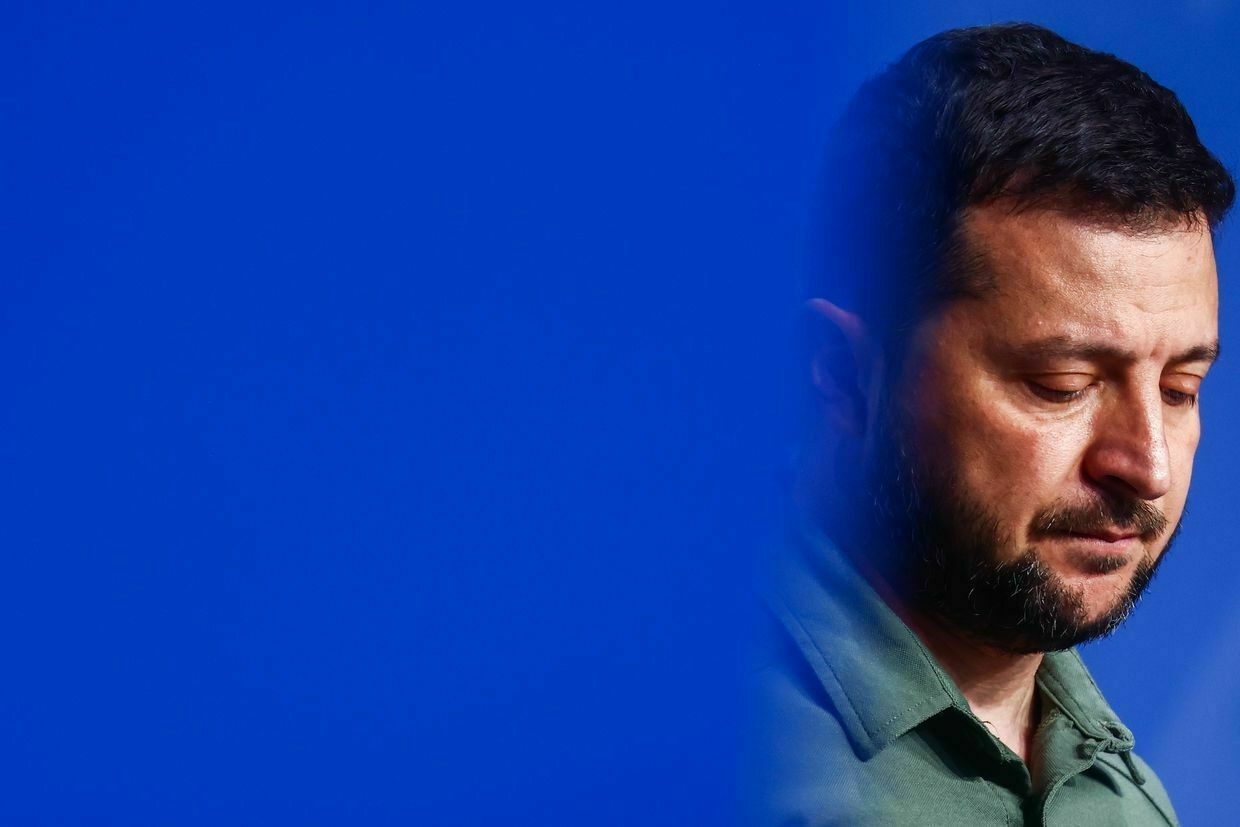
Families of Ukrainian POWs rally outside US Embassy, demand 'all-for-all' exchange before peace deal
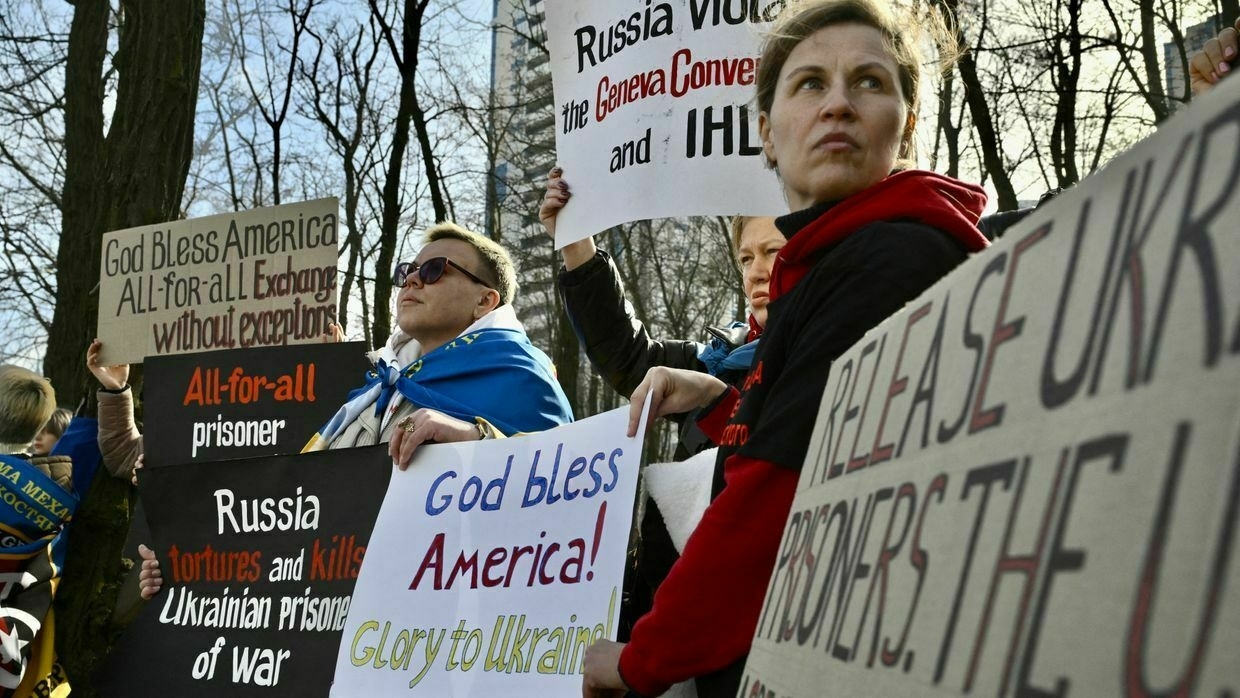
Relatives of Ukrainian prisoners of war (POWs) and missing persons held a peaceful rally outside of the U.S. Embassy in Kyiv on March 6, urging Washington to help secure the release of all Ukrainian soldiers and civilians held in Russian captivity.
The protest comes as U.S. President Donald Trump pushes for a swift peace deal with Russia that foresees concessions from Kyiv, but not the aggressor state that invaded Ukraine in 2014 and escalated the war in 2022, killing tens of thousands of civilians.
Protesters demanded an “all-for-all” prisoner exchange before any peace deal with Russia is signed, Ukrainian media outlet Suspilne reported.
Russia and Ukraine have conducted multiple swaps throughout the full-scale war, most recently on Feb. 5, when Ukraine secured the return of 150 POWs.
Kyiv has pushed for an all-for-all prisoner exchange since 2024, but Moscow has refused the proposal.
Ukraine does not disclose the exact number of its soldiers held in Russian captivity. According to Ombudsman Dmytro Lubinets, Moscow holds over 16,000 Ukrainian civilians.
Additionally, Russia has forcibly deported more than 19,500 Ukrainian children to Russia, Belarus, or occupied territories.
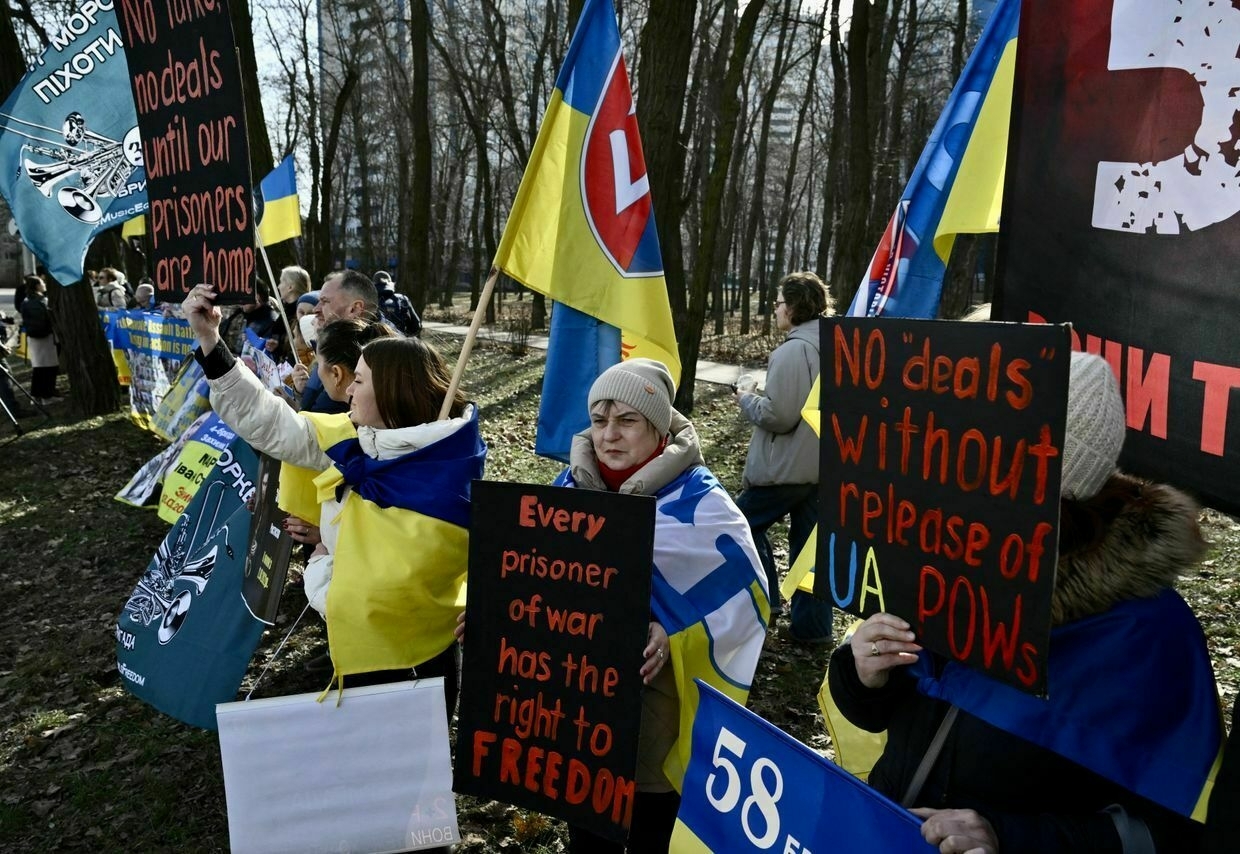
Relatives and friends of Ukrainian prisoners of war hold placards during a demonstration in front of the US embassy to bring attention to the fate of Ukrainian POWs in Kyiv on March 6, 2025. (Genya SAVILOV / Getty Images) 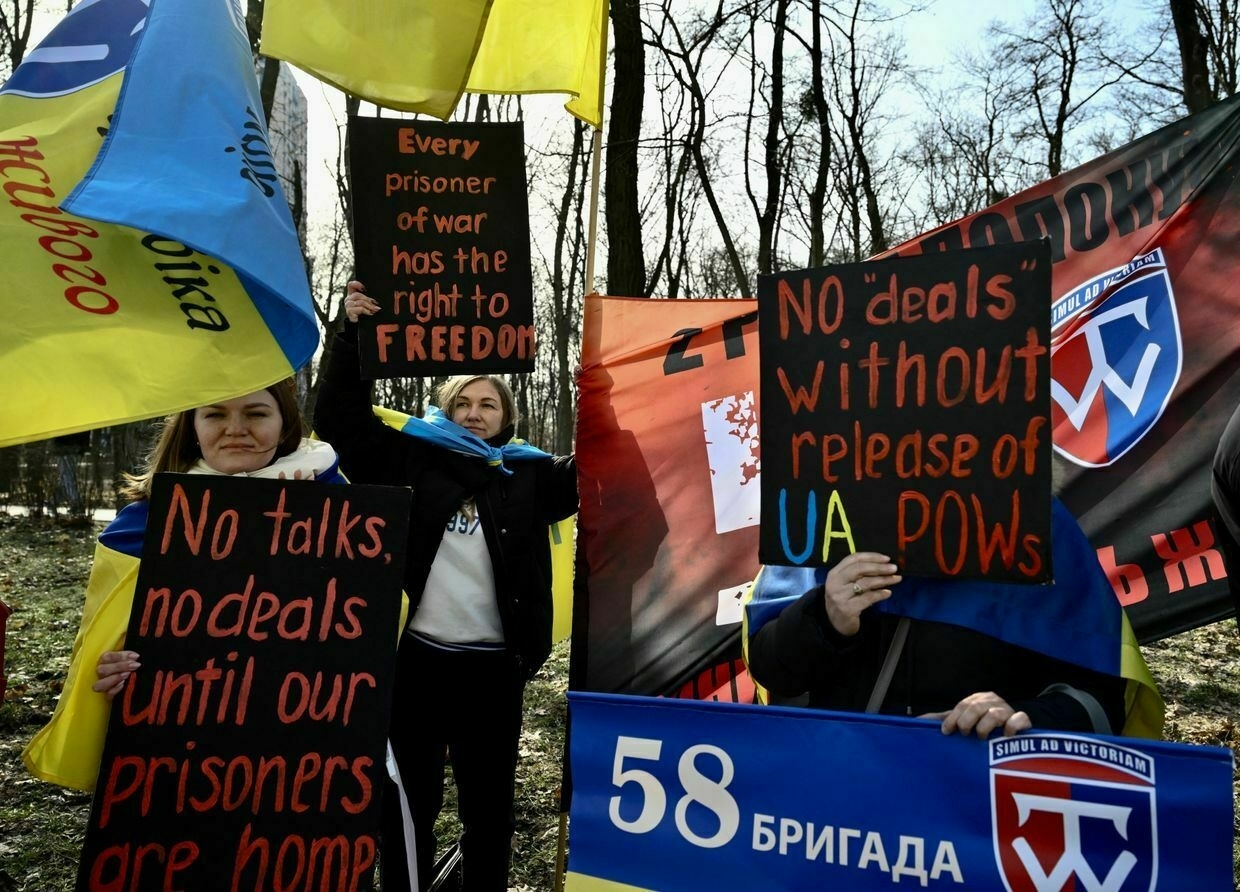
Relatives and friends of Ukrainian prisoners of war hold placards during a demonstration in front of the US embassy to bring attention to the fate of Ukrainian POWs in Kyiv on March 6, 2025. (Genya SAVILOV / Getty Images) Earlier on March 5, the day of Trump’s address to Congress, a pro-Ukrainian rally was held in Washington near the Capitol.
According to Euronews, the demostrators in Washington protested against Trump’s recent statements on Ukraine and his decision to suspend military aid to Kyiv.
The protests come amid escalating tensions between Washington and Kyiv following the contentious Feb. 28 Oval Office meeting between Trump and President Volodymyr Zelensky.
The talks, originally intended to finalize a U.S.-Ukraine mineral deal, ended in a public dispute, leading to the cancellation of the agreement.
Since then, Trump has cut U.S. military aid and intelligence sharing with Kyiv, while some U.S. officials and Republican lawmakers have intensified criticism of Zelensky, with some suggesting he should resign.
Trump admin plans to revoke legal status of 240,000 Ukrainian refugees, Reuters reportsThe plan predates U.S. President Donald Trump’s public spat with President Volodymyr Zelensky on Feb. 28 and is part of broader efforts to revoke the legal status of more than 1.8 million people staying in the U.S. on humanitarian grounds, Reuters reported.The Kyiv IndependentMartin Fornusek
